estate planning
description: process of planning for inheritance of property
112 results
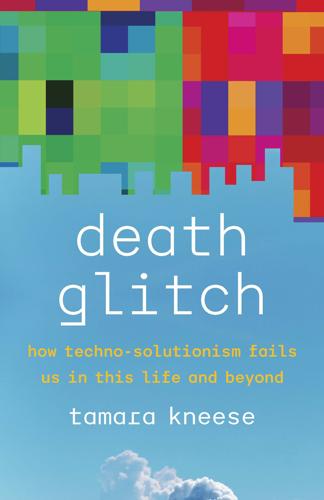
Death Glitch: How Techno-Solutionism Fails Us in This Life and Beyond
by
Tamara Kneese
Published 14 Aug 2023
Below I provide an overview of the field of digital estate planning based on interviews with founders of digital estate–planning startup companies and estate-planning lawyers, as well as my own participation in digital estate–planning processes. Although the digital death care industry is an extension of existing death entrepreneurialism, it is also a radical departure from traditional death planning and management attached to legacy institutions. For one, digital estate planners depend on venture capitalists’ investments. Following the startup model, many digital estate–planning companies are built to fail. Web-based companies promise to keep your data alive forever, but digital estate-planning startups are erratic.
…
Starting in the 1930s, the United States government dramatically raised estate tax rates, which reached a maximum rate of 77 percent, the rate in effect from 1941 to 1977.18 Unsurprisingly, this timeline coincides with the growth of the estate-planning industry. According to its website, the Boston Estate Planning Council was founded in September 1930 and is the oldest continuously run estate-planning group in the country.19 By the early 1960s, the need for a national association spurred the creation of the National Association of Estate Planners and Councils (NAEPC). Today, the NAEPC includes various types of professionals who contribute to estate planning: attorneys, accountants, insurance financial planners and trust officers, and certified financial planners.20 Estate planning thus grew in tandem with other actuarial careers, such as those in life insurance and accounting, as a means of managing risk and assuring financial bets long into the future.21 Digital Assets Digital estate planning is tied to this twentieth-century lifeworld but also marks a major departure from it.
…
In chapter 3 I argue that digital estate planning is one attempt to solve the problem of user death, which began as both individuals and platforms realized that caring for digital remains was important. Death is a lucrative business, demonstrated by the long histories of the life insurance, estate-planning, and funeral industries, and digital death entrepreneurs sought a piece of the pie. Through their narrow and often privileged positions, death entrepreneurs attempt to solve the problem of death by founding startup companies, which are not built to last. Rather than ignoring human death, digital estate–planning startups highlight a fundamental flaw with technologists’ attempts to intervene in long-term futures.
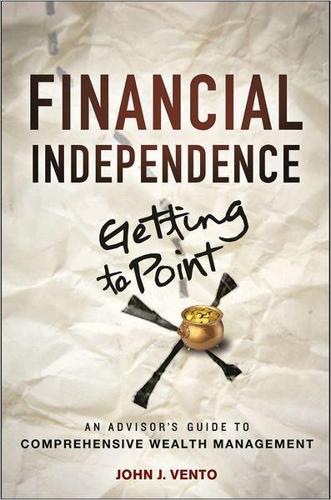
Financial Independence
by
John J. Vento
Published 31 Mar 2013
Working closely with a trusted tax advisor is perhaps one of the best ways to ensure that you can take advantage of these tax law changes when they arise. Legal Documents to Consider for Estate Planning Regardless of the size of your estate, you should consider addressing your own individual planning issues, in order to preserve your estate and make your wishes known, preferably in writing. I recommend meeting with a qualified estate planning attorney to determine if you need a will prepared, based on your particular facts and circumstances. If you have no minor children, or if all of your assets are held jointly with your spouse, or if you have no assets to speak of, then your estate may not need to go through probate.
…
In my opinion, everyone should consider their own particular needs; then you should determine what legal documents are most appropriate for you, whether it is a will, a trust, a health care proxy, a living will, or durable power of attorney (or some combination thereof)—all of which I will explain in this chapter. Please note that the names of some of these documents vary from state to state. Before I discuss the details of estate planning techniques, it is important to understand some of the key legal documents that may be needed in this planning process. An effective estate plan may need to include one or more of these documents that may cover all three phases of your life. Phase I is while you are alive and well, Phase II is in the event that you become disabled, and Phase III is after your death.
…
Properly titling your property, naming beneficiaries, and establishing trusts may facilitate your estate to pass to your heirs without having to go through the probate or administrative processes. If you c10.indd 257 26/02/13 2:47 PM 258 Financial Independence (Getting to Point X ) do the proper estate planning while you are alive and well, you can pass your estate to your loved ones privately, without unnecessary delays and expenses; also, this process may allow you to control your estate after death. Estate Planning Strategies That Keep You in Control after Death If you would like to have continued control of your estate after your death, there are several planning strategies you may want to implement while you are alive.
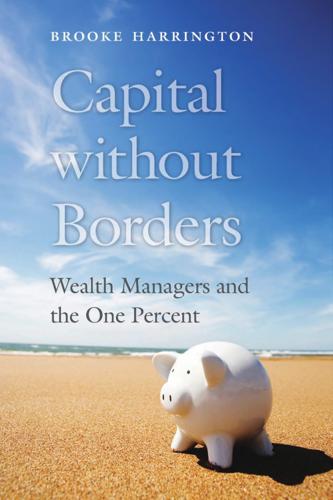
Capital Without Borders
by
Brooke Harrington
Published 11 Sep 2016
See also offshore finance tax shelters: colonies as, 254; complexity of, 53; corporate, 151; offshore financial centers as, 47; trust-corporation configuration as, 188; in United Kingdom, 241–42 TEP (Trust and Estate Planning) certification, 26; in advertisement for wealth manager, 60; as industry standard, 30, 55–56; on offshore financial centers, 129, 130; on the state, 236–37; on taxes, 226 testamentary freedom, 166 Thyssen-Bornemisza, Baroness Carmen, 160 tiered entities, 189–92 Tocqueville, Alexis de, 204, 209 trade: free, 239, 254, 293; sanctions, 295; trade-restriction avoidance, 159–60; wealth from global, 5, 51 training programs, 97–98, 103 transaction costs: continuity of wealth reduces, 214; for corporations, 181, 182; for foundations, 180; increased cost of borrowing, 221; minimizing, 209, 212; for private investment opportunities, 212; succession planning reduces, 215 treaties, 133, 256, 264 Treaty of Westphalia (1684), 133, 234, 235, 290, 293–97 Trevor (Panama-based wealth manager), 83, 229, 255 Trudeau, Kevin, 157–58 trust: in client relations, 20, 81–105, 120–21, 287; culture and, 108–16; in institutions, 75; pricing related to, 107, 108; rule of law as basis of, 109; similarity as basis for, 95; social identity and, 119–20 trust and estate planning: American College of Trust and Estate Counsel, 30; bar association special-interest groups for, 29; becomes an industry, 126; Chartered Trust and Estate Planner certification, 30; disparate professions in, 55; professionalization of, 4, 5–6; transformation of capitalism and emergence of, 51; university degrees in, 56. See also STEP (Society of Trust and Estate Practitioners); wealth management Trust and Estate Planning (TEP) certification. See TEP (Trust and Estate Planning) certification trust companies, 3, 77, 190, 191–92, 250 trust-corporation configuration, 185–92; asset transfer in, 8–9; as best-of-both-worlds, 188–89; relationship among substructures in, 9; STAR (Special Trusts Alternative Regime) structure, 168, 169, 170–71, 177, 185, 276; in tiered entities, 189; VISTA (Virgin Islands Special Trusts Act) trusts, 57, 114–15, 168, 169–70, 177, 185, 222 Trustee Act (2000), 49, 284 Trustee Investment Act (1889), 48–49 trustees: class solidarity with those who request their services, 42, 51; compensation for, 45, 49–50; courts expand powers of investment of, 48–49, 74; culture and, 109; as economically celibate, 50; evolution during nineteenth century, 51–52; faithless feoffees, 41, 48; feudal aspects of, 40, 51, 214; fiduciary duty of care for, 46; full personal liability for losses to trust, 49, 83; Harvard College v.
…
See also 1 percent EMEA (Europe, Middle East, and Africa), 243 Engels, Friedrich, 16, 204 Enlightenment, 18, 203, 204, 218, 277 entail, 4, 208, 218, 276, 306n17 equal opportunity, 204 Erika (Swiss wealth manager), 61, 69, 82, 98–99, 137–38, 245–46, 248, 298 estate planning: in civil-law countries, 57–58. See also trust and estate planning ethnography, 27–30; immersion, 25, 274 European Union: cash-for-passports programs, 239–40; Cook Islands blacklisted by, 158; Savings Tax Directive, 299 euro zone banking crisis, 239 exchange funds, 206 Executive Commission (European Union), 158 express trusts, 155 family: banks, 251, 269; children kept secret from the legally recognized, 125; client relations as quasi-familial, 85–88, 92, 120–21; contemporary social scientific theories of, 278; contributions to theory and research of this study, 276–78; disputes over wealth of, 16–17; dynastic, 96, 193–94; institutions opened to the public, 250; as not high-trust environment, 84; suspicion in wealthy, 81; tear themselves apart over money, 88; transformation in, 165–67; wealth lends special dynamic to, 84–85; wealth management influences, 16–17, 272; wealth managers help families, 68.
…
Attempts to capture the full complexity of professional activity have included the fanciful (“fiscal alchemists”), the utilitarian (“transaction planners”), and the politically pointed (“income defense providers”).13 However, consensus seems to be developing around the term “wealth managers,” even among many STEP members.14 Indeed, a much-discussed article in the STEP Journal claimed that STEP practitioners—unlike lawyers, bankers, or other competing professional groups—are “the true wealth managers,” because their domain comprises “the whole spectrum of the client’s assets and other financial affairs. Wealth management is seen as the overarching role pulling together the advice of various investment, tax, and other experts into a coherent plan.”15 Thus “wealth managers” is the term I will use in this book. That the professionalization of trust and estate planning remains incomplete owes something to the changing nature of wealth itself. Historically, land ownership has been the primary source of great fortunes globally; this remains true in many parts of the world, particularly in Africa and Latin America.16 In that context, family wealth could be defended without the intervention of professionals, through practices such as intermarriage, primogeniture, and entail.17 In cases where those strategies were unavailable or impractical—as when knights of medieval Europe departed for the Crusades, leaving their lands vulnerable to seizure by the church, the state, or rival noblemen—some adopted the practice of putting their assets in trust.
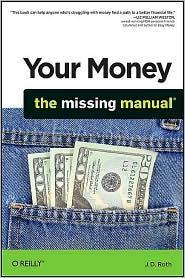
Your Money: The Missing Manual
by
J.D. Roth
Published 18 Mar 2010
A Brief Overview of Estate Planning Nobody likes to think about death—especially their own. Most people don't think about creating wills until they hit middle age. But you can't always see death coming and, in addition to the emotional trauma, it can wreak financial havoc on your family. You can make things a little easier for your family and friends by planning ahead and creating a will. A will is for anyone who wants to distribute their money and possessions according to some plan. (All that you own, including physical property and investments, is known as your estate. An estate plan is a strategy for passing your money and Stuff on to your heirs.)
…
If you use software or pre-printed forms to create your will, be sure to follow the signing instructions for your state. For more on do-it-yourself estate planning, read this article from the New York Times: http://tinyurl.com/NYT-wills. A lot of people don't understand what will happen to their property when they die. For example, your retirement account—which is probably your single most valuable asset after your home—is generally not governed by a will; it's covered by a completely different set of rules. (This point is very important, but most people don't realize it.) If you make your own estate plan, you may not take this sort of thing into account. And many families have been shattered by fighting that happens when a will they thought was legally binding turns out to be invalid because it wasn't properly drafted and witnessed.
…
Though most wills share certain features, the attorney will customize it for your specific needs. Tip If you want to know how much an estate plan will cost, ask. The price depends on where you live and how complicated your estate is. In a way, preparing a will is sort of anti-climactic. There's not a lot of legal mumbo-jumbo or red tape. You simply gather info, answer a few questions, and sign on the dotted line. For some people, there's more to estate planning than just creating a simple will, but for many, it really is this easy. Once you have a will, keep it someplace safe and accessible, like a safe-deposit box, and let trusted family members know where it is.
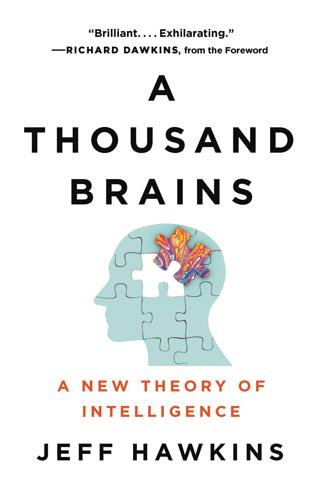
A Thousand Brains: A New Theory of Intelligence
by
Jeff Hawkins
Published 15 Nov 2021
But I think it is a good idea to discuss what we can do now, just in case things don’t work out so well. Estate planning is something you do during your life that benefits the future, not yourself. Many people don’t bother to do estate planning because they think there is nothing in it for them. But that isn’t necessarily true. People who create estate plans often feel it provides a sense of purpose or creates a legacy. Plus, the process of establishing an estate plan forces you to think about life from a broad perspective. The time to do it is before you are on your deathbed, because by then you may no longer have the ability to plan and execute. The same holds true for estate planning for humanity.
…
In the distant future, intelligent beings—whether they evolve on Earth or travel from another star—could discover the time capsule and read its contents. We won’t know whether our repository will be discovered or not; that’s the nature of estate plans. If we do this, and it is read in the future, imagine how appreciative the recipients would be. All you have to do is think of how excited we would be to discover such a time capsule ourselves. An estate plan for humanity is similar to an estate plan for individuals. We would like our species to live forever, and maybe that will happen. But it is prudent to put in place a plan just in case the miracle doesn’t happen.
…
Classification: LCC QP376 .H2944 2021 | DDC 612.8/2—dc23 LC record available at https://lccn.loc.gov/2020038829 ISBNs: 978-1-5416-7581-0 (hardcover), 978-1-5416-7580-3 (ebook) E3-20210108-JV-NF-ORI Contents Cover Title Page Copyright Foreword by Richard Dawkins PART 1: A NEW UNDERSTANDING OF THE BRAIN 1 Old Brain—New Brain 2 Vernon Mountcastle’s Big Idea 3 A Model of the World in Your Head 4 The Brain Reveals Its Secrets 5 Maps in the Brain 6 Concepts, Language, and High-Level Thinking 7 The Thousand Brains Theory of Intelligence PART 2: MACHINE INTELLIGENCE 8 Why There Is No “I” in AI 9 When Machines Are Conscious 10 The Future of Machine Intelligence 11 The Existential Risks of Machine Intelligence PART 3: HUMAN INTELLIGENCE 12 False Beliefs 13 The Existential Risks of Human Intelligence 14 Merging Brains and Machines 15 Estate Planning for Humanity 16 Genes Versus Knowledge Final Thoughts Suggested Readings Acknowledgments Discover More About the Author Illustration Credits Explore book giveaways, sneak peeks, deals, and more. Tap here to learn more. Foreword by Richard Dawkins Don’t read this book at bedtime.

Freedom Without Borders
by
Hoyt L. Barber
Published 23 Feb 2012
Chapter 2 The Best Offshore Structures Our country is wherever we are well off. — John Milton, 1666, 17th-century English poet Author of Paradise Lost, an epic poem For privacy and asset protection, offshore is the answer. If you wish to hold assets and cash, gain maximum financial privacy protected by law, operate an offshore business, or create the best estate plan anywhere, the preferred means is to utilize one or a combination of offshore structures. Although you can certainly hold bank and investment accounts in your personal name with financial institutions in foreign countries, you will find that it is far wiser and more private and that you will be better able to insulate your wealth from domestic predators, including your own government, if you maintain these important accounts in the name of legal entities that you control or which are yours by design and part of your offshore estate.
…
The following describes the Belize APT. Nevis and the Cook Islands share many of the same advantages and similarities. Belize’s trust law is one of the strongest and most flexible asset protection trust legislations in the world, and Belize is highly favored by this author, along with Nevis and the Cook Islands, for offshore estate planning, asset protection, and investment purposes. The combination of a Belize asset protection trust and an IBC or LLC under the APT umbrella allows the principal(s) to maintain and enjoy the benefits of ownership and control while still procuring the impermeable protection and privacy of the trust.
…
In fact, the Panamanian structure was modeled after Liechtenstein legislation, but the Panama entity has more flexibility and the Liechtenstein structure is much more costly to establish and maintain. The annual Panama government fee is a modest $300. The private foundation, as it is also known, is an independent juridical entity, like a corporation, that functions similarly to a trust for estate planning but operates more like a company, although it may not operate as a business itself. It may invest in businesses and buy and sell assets in order to maximize patrimony. The Panama foundation structure offers some of the best benefits of both the trust structure and the offshore corporation in a single entity.
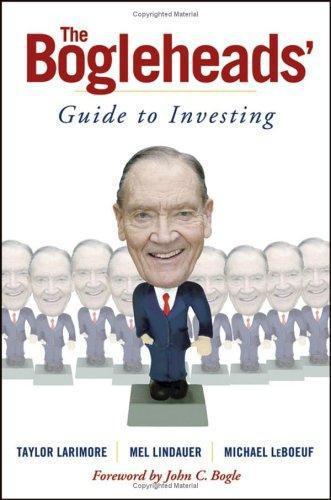
The Bogleheads' Guide to Investing
by
Taylor Larimore
,
Michael Leboeuf
and
Mel Lindauer
Published 1 Jan 2006
Therefore, the estate tax laws that are in effect at the time of your death will establish the level at which your estate will have to pay additional taxes on your accumulated assets for being too rich. Although it's beyond the scope of this book to offer legal advice (that's what estate planning attorneys are for), we will touch on a number of things you need to consider regarding estate planning and passing your assets on to those you want to have them. That is a better option than simply leaving those decisions up to the intestate law of your state, and perhaps leaving a major portion of your assets to the taxman. We'd all like to think that we're special, that perhaps we're somehow even immortal.
…
But since we don't know the date of our demise, we need to plan now for any number of eventualities, including the distribution of our assets after our death. It's important to know that getting our affairs in order involves so much more than just estate planning. There are a number of other legal issues that we'll have to deal with and documents that we'll want to have in place. These issues and documents are often handled by your attorney at the same time he or she is preparing your estate planning documents. Let's take a look at some of the documents you might need and some things you'll need to consider about each of them. A Will You should have a will, even if you have a trust.
…
A good CPA can do the following: Assess your overall financial wellbeing. • Calculate any taxes due on the windfall. • Recommend any additional types of insurance you may need or what types of insurance you currently carry that can be dropped. • Help you decide if you need to enlist the services of an estate planning attorney. Calculate if it's better to take a lump-sum payment or monthly distributions on a windfall such as a retirement package. Give you a clearer picture of how the windfall can help you achieve your long-term financial goals. The American Institute of Certified Public Accountants has a PFS designation for CPAs specializing in personal financial services.
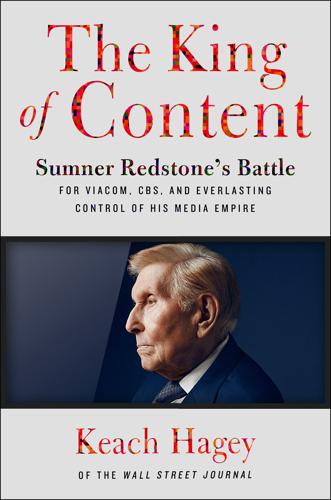
The King of Content: Sumner Redstone's Battle for Viacom, CBS, and Everlasting Control of His Media Empire
by
Keach Hagey
Published 25 Jun 2018
Today, as the majority owner of the family theater chain National Amusements, he controls roughly 80 percent of the voting shares of both Viacom Inc. and CBS Corp., a $36 billion media empire encompassing MTV, Comedy Central, Nickelodeon, BET, VH1, Paramount Pictures, CBS, Showtime, Simon & Schuster, and the Showcase Cinemas and Cinema de Lux movie chains. He spent decades performing meticulous estate planning so that his control would extend beyond the grave (which he loved telling reporters he would never lie in), constructing trusts designed to make it impossible for his heirs to sell his companies after he dies. “Unless they start doing terribly,” he told the Wall Street Journal in 2012, “which they will not.”
…
Smelling blood, Sumner summoned Dauman, his deal-making consigliere, from his partner’s perch at Shearman & Sterling and offered him a job in-house as Viacom’s senior vice president and general counsel. Dauman had been rewarded for his help in the Viacom takeover with a seat on the board but had remained at the law firm in the intervening years, serving as Sumner’s personal lawyer on his estate planning, executor of his will, and even trustee of his family trusts. Dauman had been part of earlier rounds of secret talks between Sumner and Davis over the years that not even Biondi knew about—Sumner felt Biondi had “loose lips” and was a poor negotiator—and Sumner trusted Dauman implicitly. By February 1993, he had his own office near Sumner’s on the fifty-second floor of Viacom’s Times Square headquarters.
…
Most challengingly for Sumner, buying Paramount forced him to publicize his succession plans. As part of Nynex’s negotiations to fund Viacom’s campaign for Paramount, Nynex wanted assurances that the company would not be sold or otherwise destabilized after Sumner’s death. Sumner agreed to show Nynex his estate plan, which named Dauman as chairman in the event of his death, assuring Nynex that his trusted consigliere knew enough about both his estate and Viacom’s operations that he could block a family attempt to sell or otherwise dismantle the company after his death. As the word began to circulate among more executives, Dooley recommended that Sumner make a wider disclosure of this plan.
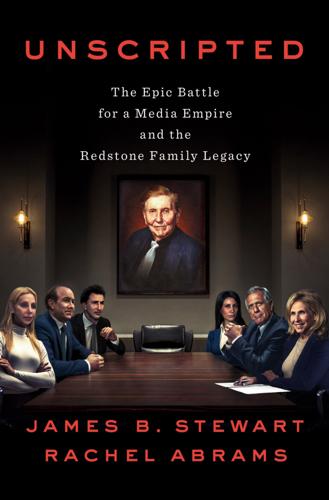
Unscripted: The Epic Battle for a Media Empire and the Redstone Family Legacy
by
James B Stewart
and
Rachel Abrams
Published 14 Feb 2023
Prior to the meeting Holland and Herzer allegedly spent “hours” with Sumner “telling him exactly what he was supposed to say.” The effort worked. Dr. Spar reported that Sumner “demonstrated impressive knowledge of his estate, knew the people named in his estate plan and how they are related to him, and revealed no hint of delusional thinking in the discussion of his estate plan.” In his opinion, “the testamentary decisions [Sumner] discussed in this evaluation struck me as reflecting his own authentic wishes, and not the influence of Manuela, Sydney, or anyone else.” Dr. Spar’s report would now help insulate Holland and Herzer from any future claims they had exerted undue influence on Sumner.
…
In return, the shares themselves would be placed in an irrevocable trust for the benefit of Sumner while he lived, and then, after he died or became incapacitated, into a trust for his and Phyllis’s children and grandchildren. There were five nonfamily trustees in addition to Sumner and Phyllis: George Abrams, a courtly, Harvard-trained Boston lawyer who advised Sumner in his divorce; David Andelman, his estate planning attorney; Philippe Dauman, his longtime corporate lawyer and a Viacom executive; and two other lawyers. Sumner and his staunch allies controlled a solid majority, and should anyone’s loyalty to Sumner falter, Sumner retained the power to replace them. As part of the settlement, Sumner also gave Phyllis half of his large stake in a pinball machine and video games maker, Midway Games, best known for its Mortal Kombat franchise, the fantasy fighting game introduced in 1992.
…
But when Holland’s matchmaker friend Patti Stanger asked her point-blank if Alexandra was Sumner’s, Holland denied it and added she’d used a surrogate. Regardless, Sumner doted on the child and seemed to enjoy having Alexandra around the house. Holland showed photos of the baby bouncing in Sumner’s lap. He added Alexandra as a beneficiary in his will and said he planned to formally adopt her. His longtime tax and estate planning lawyer in Boston, David Andelman, began looking into the tax implications of his marrying Holland and adopting Alexandra. * * * — The same day Holland picked up her baby in San Diego, Heather Naylor took advantage of Holland’s absence to have lunch with Sumner at his mansion.
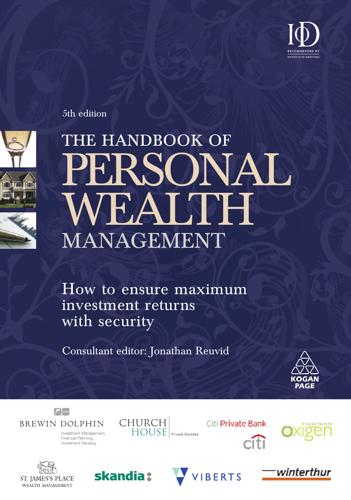
The Handbook of Personal Wealth Management
by
Reuvid, Jonathan.
Published 30 Oct 2011
As business property includes AIM investments, it is possible for a well-managed AIM portfolio to be a satisfactory investment in itself, whilst also attracting IHT relief at 100 per cent. Gifts to charities It is worth noting that gifts to charity qualify for 100 per cent relief from IHT. Conclusion Inheritance tax, wills and estate planning are a very complex subject and this chapter can do no more than set out general guidelines and limits. It is no substitute for professional advice. 112 113 3.2 Estate and succession planning Tom Hewitt, Burges Salmon LLP Introduction The primary purpose of trust and estate planning is to enable family assets to be transferred from one generation to another in a manner that is tax and financially efficient and that suits the aspirations of the family.
…
To find out how the Isle of Man can enhance your personal and business wealth, please contact Isle of Man Finance on +44 (0)1624 686400. www.isleofmanfinance.gov.im You can in the Isle of Man ឣ X CONTENTS ___________________________________________________________ Part 3: Taxation issues 103 3.1 Inheritance tax, wills and estate planning for the high-net-worth individual 105 Carole Cook, Forsters LLP Inheritance tax and when it is payable 105; Rates of tax 106; How an individual can reduce the burden of IHT on death 106; Assets that should be given away 108; Lifetime gifts to trusts 108; Tax-efficient wills 109; The family home 110; Other planning points 110; Conclusion 111 3.2 Estate and succession planning 113 Tom Hewitt, Burges Salmon LLP Introduction 113; Inheritance tax (IHT) 113; Capital gains tax (CGT) 114; The use of trusts 116; Wills 117 3.3 Taxation of UK resident non-domiciliaries 121 Patrick Harney, Forsters LLP Overview 121; The difference between residence and domicile 122; The remittance basis of taxation 122; Temporary non-residence 125; Exempt property 126; Non-domiciled settlors of overseas trusts 126; Non-domiciled beneficiaries of offshore trusts 127; Non-domiciled shareholders in overseas companies 127; US citizens 127; Planning for non-domiciliaries after April 2008 127; Conclusion 129 Part 4: Pleasurable investment 131 133 4.1 Investing in wine Nick Stephens, Interest in Wine Who we are 133; Why invest in wine?
…
Guy was instrumental in the company’s formation and funding and was Managing Director until 2008. He has now become Managing Director of Oxigen Plantations (Priv) Ltd, Sri Lanka. Carole Cook is a partner at Mayfair-based solicitors Forsters LLP. Forsters is widely recognized as a leading law firm specializing in tax and trusts. Carole’s expertise includes tax and estate planning for both UK and international clients, in particular entrepreneurs, offshore and onshore trust advice and creation, will drafting and advice to charity trustees. She is a member of the Technical Committee of the Society of Trust and Estate Practitioners (STEP). John Davey studied chemical engineering at the University of Bath before commencing his career in finance.
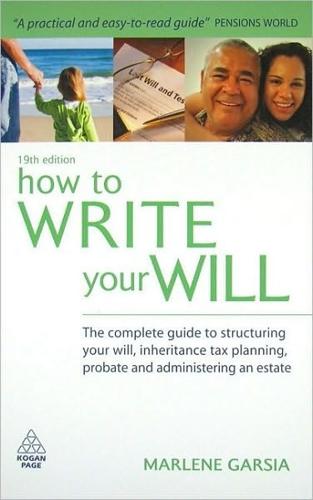
How to Write Your Will: The Complete Guide to Structuring Your Will, Inheritance Tax Planning, Probate and Administering an Estate
by
Marlene Garsia
Published 1 Jan 2008
What this book does is point out areas of potential problems, but as readers can appreciate, it cannot cover all detail and cases as they are potentially so numerous. Legal advice in these instances is recommended. In researching this book it has become clear that, under English law, provided an estate is relatively straightforward, xxviii ■ Preface complicated trusts are not involved, and extensive estate planning is not needed, then there is nothing to stop the individual from handling his or her relation’s or friend’s affairs – whatever the size of the estate. Despite this, only a minority of people do so. Scotland is another matter. I have explained briefly the position in Scotland, dealing with small estates, the differences when writing a will and gaining Confirmation.
…
What it can do is to provide information about what will be needed and what matters have to be dealt with in as straightforward and uncomplicated a manner as the subject allows. It tells you what to do and why, and how to go about it. It takes a step-by-step view of the necessary procedures from writing a will to estate planning and proving a will. The first part of the book will be concerned with how to write a will. Basically you ‘make’ a will because you want to direct who receives your assets following your death. Occasionally, you may even want to ensure that certain people do not receive a share in your estate.
…
Approximately one in every five persons writes their own will. In London the number is higher, one in every three, while in Scotland the figure is approximately one in every four. However, most people still go to a solicitor, not because their affairs are complex but because they do not know where to start or find the task daunting. Estate planning and inheritance tax are examined in Chapter 6. For the inexperienced and unsure this subject can be not only bewildering but frightening too. You may feel more confident arranging for a consultation with a solicitor or tax consultant before planning your will. House prices in 2008 and so far in 2009 have shown a decrease of circa 17.9 per cent.
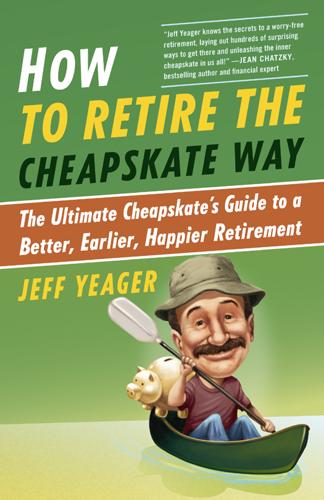
How to Retire the Cheapskate Way
by
Jeff Yeager
Published 1 Jan 2013
—isn’t likely to be one of the most enjoyable exercises of your lifetime, but it is a necessary one. It’s also one that’s best done sooner rather than later. And once it’s done, it’ll put your mind at ease and let you get on with enjoying the rest of your life and retirement. Here are some thoughts on estate planning, the cheapskate way: Wills Obviously a last will and testament is the cornerstone of any estate plan, even though roughly 60 percent of adult Americans don’t have a will of any kind, according the legal news website www.Findlaw.com. The key points addressed in most wills are who will manage your estate once you’re gone; who gets your assets and other belongings; and who will be the guardian of any minor children or disabled dependents after you die.
…
Even for a cheapskate, it’s usually worth the few hundred dollars an attorney should charge you to draw up a will, particularly if you have a good-size estate, complicated arrangements in terms of beneficiaries, or reason to believe that someone may try to contest your will after your death. A qualified attorney (see the National Association of Estate Planners & Councils, www.naepc.org) can also provide you with other estate planning advice, which could prove extremely valuable and save you serious money in the long run. Often at least some basic estate planning advice is provided without additional charge when you hire an attorney to prepare your will. But if you have few assets and straightforward plans for your estate, then you shouldn’t rule out a simple, inexpensive do-it-yourself will.
…
However, being a cheapskate, I’m pretty sure that if I see a blinding white light at the end of a tunnel, the first thing I’ll say when I get there is, “Do we really need to have so many lights on?” In a way, we’ve come full circle from where this book began. We’re back to the same question Bob Johnson asked me in the park that day: What do you really, really want? If anything, that question may be even more important when considering your final wishes and estate plans, because once you’re gone, there ain’t no changing your mind. Speaking of Bob Johnson, I’ll make no further drama of it. Nor will I leave you wondering: my friend and mentor Bob (formally Robert B. Johnson) died of colon cancer one sunny April morning in 1988, at the way too early age of forty-one.
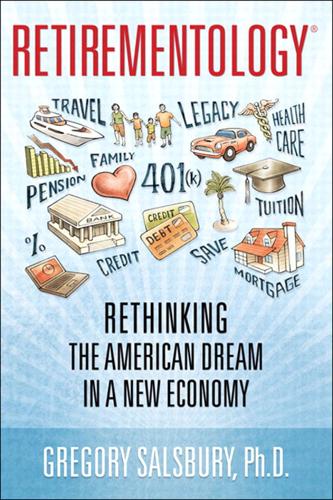
Retirementology: Rethinking the American Dream in a New Economy
by
Gregory Brandon Salsbury
Published 15 Mar 2010
Do you know how to pass assets on to your heirs without having them incur huge tax burdens? Do you have any charities to which you’d also like to leave money? Speak to an adviser regarding tax ramifications and the taxes that will be due and payable by the recipients. Estate planning for your surviving spouse and children can be vital to their ongoing financial health, so establish a basic estate plan and standard trusts like a living trust, a credit shelter trust, and a bypass trust. Taking care of these things can make the difference between seeing millions go to your family—or to the IRS. Procrastinating—staying where you’ve been and not adjusting your portfolio—can be very expensive given the changing landscape.
…
Vice President, Publisher: Tim Moore Associate Publisher and Director of Marketing: Amy Neidlinger Executive Editor: Jim Boyd Editorial Assistant: Pamela Boland Development Editor: Russ Hall Operations Manager: Gina Kanouse Senior Marketing Manager: Julie Phifer Publicity Manager: Laura Czaja Assistant Marketing Manager: Megan Colvin Cover Designer: Anne Jones Managing Editor: Kristy Hart Senior Project Editor: Lori Lyons Copy Editor: Apostrophe Editing Services Proofreader: Kay Hoskin Indexer: Erika Millen Compositor: Nonie Ratcliff Manufacturing Buyer: Dan Uhrig © 2010 by Pearson Education, Inc. Publishing as FT Press Upper Saddle River, New Jersey 07458 This book is sold with the understanding that neither the author nor the publisher is engaged in rendering legal, accounting, estate planning, tax, or other professional services or advice by publishing this book. Each individual situation is unique. Thus, if legal or financial advice or other expert assistance is required in a specific situation, the services of a competent professional should be sought to ensure that the situation has been evaluated carefully and appropriately.
…
“Looking back on my experiences, I definitely had some unexpected curveballs thrown my way,” Liz concluded. “But when it comes to being there and helping take care of my family, there is nothing I would have done differently. Except I do think we could have saved ourselves some big headaches if we had just done more to make sure my parents and siblings were all on the same page when it came to estate planning and the family’s finances...and I wish I had forced myself to set aside a little more money for my own retirement.” Dependence on family for financial support in difficult times is nothing new, though it’s rarely discussed. That’s probably because it’s never been a great source of pride for any of the parties involved, no matter what their financial situation is.
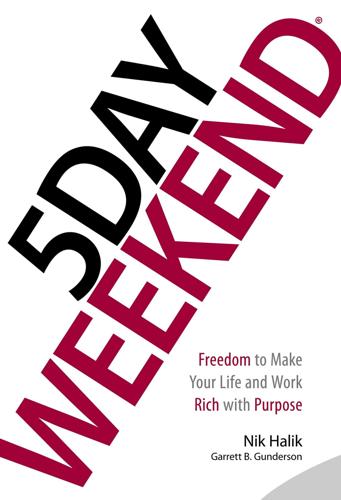
5 Day Weekend: Freedom to Make Your Life and Work Rich With Purpose
by
Nik Halik
and
Garrett B. Gunderson
Published 5 Mar 2018
You’ll never find a widower or widow who felt like he or she had too much coverage. Do you understand the different types of insurance and is your policy right for you? Do you have the proper beneficiary assignment with your policy? Estate Planning Estate planning determines what happens to your assets when you pass away. But equally important is the perpetuation of your values, philosophy, vision, and contribution. A proper estate plan maximizes your legacy — both financial and personal. Do you have a properly documented will? Do you have a properly executed trust? Do you have a Power of Attorney set up in case you are incapacitated and cannot make decisions?
…
Protective expenses include your liquid savings, which should be enough to cover a minimum of six months’ expenses. These savings won’t be overly productive in terms of earning interest, but they will be there to protect you and prevent you from worrying about money every second. Other protective expenses include estate planning, corporate structure planning, life insurance, disability insurance, medical insurance, auto insurance, and emergency preparedness. 3. Productive Expenses Productive expenses allow you to build assets, expand your cash flow, and grow your business. This could include purchasing a tax lien or rental property.
…
Harv Elder, Larry email, and productivity rituals emergency preparedness, as protective expense Emerson, Ralph Waldo emotional attachment, and Momentum investments and real estate investments emotional energy energy, amplifying entertainment, as tax deduction entrepreneurship, and academic systems and active income analyzing income opportunities and cash flow and continuous improvement direct sales/network marketing opportunities domain trading opportunities e-commerce opportunities and embracing failure and experimentation fix and flip opportunities and freedom and Growth investments and hiring employees and income growth lack of resources for and letting go and leverage online opportunities and opportunities presented by technology and passion and perfectionism personal service opportunities and quick adjustments to feedback and quitting your job and risk and scalability of businesses and self-employment sharing economy opportunities starting small and strong mindset three levels of and value creation equity growth, and real estate investments estate planning, as protective expense Ethereum Evans, Richard Paul excellence, replacing perfectionism with exercise, and energy amplification exit strategies, for Growth investments for real estate investments expense ratios expenses, and Active Income Ratio cutting and Passive Income Ratio experimentation F Facebook failure, and productivity fear, and building your inner circle and economic cycles and entrepreneurship and opportunity and procrastination and purpose and real estate investments and the Rockefeller Formula and security and strengthening your mindset of taxes federal government assistance, and loans for real estate investments Federal Housing Administration (FHA) feelings of entrapment, and weekend/workweek structure financial capital, and entrepreneurship financial independence, and Passive Income Ratio financial wealth, and Passive Income Ratio 5 Day Weekend, changing your mindset toward work contract for creating a vision for free-time activities five steps of importance of following correct sequence and “mailbox money” myth manifesto and passive vs. active income streams and security vs. freedom and thinking outside the box universal availability of weekend/workweek paradigm 5DayWeekend.com, and Passport codes 5-Second Rule, for impulse buying Fiverr.com fix and flip opportunities fix-up costs, for real estate investments Fon Ford, Henry foreclosure, and tax lien certificates Forleo, Marie foundation step (keep more money) Francis of Assisi (saint) Frank, Ben Frank, Joyce Franklin, Benjamin fraud, and cryptocurrencies freedom, and active vs. passive income creation and boredom and entrepreneurship and generosity and learning when to say no and lifestyle and peace and perfectionism and purpose sacrificing for security and simplicity Freedom Lifestyle freelancing, as entrepreneurial opportunity frequency of work requirements, business ownership (not managing) business ownership (working and managing) royalties and overrides sales subscriptions wage or salary employment Frost, Robert fulfillment, and purpose Fuller, Buckminster G Gardner, Chris generosity Gerber, Michael Gibbs, Marshall goal setting, and Passive Income Ratio and purpose Godin, Seth gold, as Momentum investment opportunity Golightly, Craig Google government social welfare programs, and retirement Grameen Bank gratitude Graybiel, Ann Gretzky, Wayne Groupon Growth investments, and active vs. passive income streams aggressive and conservative strategies for Bank Strategy and cash flow description of and economic cycles for funding Momentum investments minimum criteria for opportunities for Sharelord Strategy storage units tax lien certificates Guitar Institute of Technology (GIT) Gunderson, Garrett H habits, fortifying Halik, Nik happiness, and generosity and materialism hard money lenders, and loans for real estate investments health, and habits health savings accounts (HSA) “HELL YEAH” philosophy Hendrix, Jimi Herodotus Hicks, Bill hidden fees Hill, Napoleon hiring employees hiring your children, as tax deduction hobbies Holland, Danny home expenses, as tax deduction home office deductions homeowner’s insurance Hopper, Grace Hori, Jim hugedomains.com Hulu HyreCar.com I Idea Optimizer impulse buying income, and Active Income Ratio increasing with entrepreneurship and Passive Income Ratio See also cash flow income growth step (make more money) Income Opportunity Score Sheet incorporation Industrial Revolution, vs.
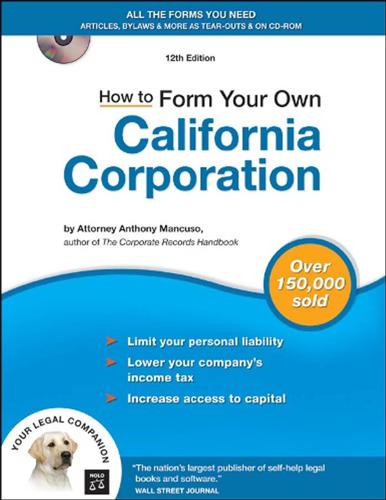
How to Form Your Own California Corporation
by
Anthony Mancuso
Published 2 Jan 1977
. $29.99 EVL Nolo’s Guide to California Law................................................................................... $24.99 CLAW ORDER 24 HOURS A DAY @ www.nolo.com call 800-728-3555 • Mail or fax the order form in this book ESTATE PLANNING & PROBATE Price Code 8 Ways to Avoid Probate ........................................................................................... $19.99 PRAV Estate Planning Basics . ............................................................................................. $21.99 ESPN The Executor’s Guide: Settling a Loved One’s Estate or Trust..................................... $34.99 EXEC How to Probate an Estate in California....................................................................... $49.99 PAE Make Your Own Living Trust (Book w/CD-ROM)..................................................... $39.99 LITR Nolo’s Simple Will Book (Book w/CD-ROM)............................................................ $36.99 SWIL Plan Your Estate......................................................................................................... $44.99 NEST Quick & Legal Will Book (Book w/CD-ROM) .......................................................... $19.99 QUIC Special Needs Trust: Protect Your Child’s Financial Future (Book w/CD-ROM)......... $34.99 SPNT FAMILY MATTERS Always Dad................................................................................................................ $16.99 DIFA Building a Parenting Agreement That Works............................................................ $24.99 CUST The Complete IEP Guide........................................................................................... $34.99 IEP Divorce & Money: How to Make the Best Financial Decisions During Divorce........... $34.99 DIMO Divorce Without Court.............................................................................................. $29.99 DWCT Do Your Own California Adoption: Nolo’s Guide for Stepparents and Domestic Partners (Book w/CD-ROM).................................................................................... $34.99 ADOP Every Dog’s Legal Guide: A Must-Have for Your Owner............................................ $19.99 DOG Get a Life: You Don’t Need a Million to Retire Well.................................................. $24.99 LIFE The Guardianship Book for California........................................................................ $34.99 GB A Legal Guide for Lesbian and Gay Couples............................................................... $34.99 LG Living Together: A Legal Guide (Book w/CD-ROM).................................................. $34.99 LTK Nolo’s IEP Guide: Learning Disabilities..................................................................... $29.99 IELD Parent Savvy............................................................................................................... $19.99 PRNT Prenuptial Agreements: How to Write a Fair & Lasting Contract (Book w/CD-ROM)................................................................................................. $34.99 PNUP Work Less, Live More................................................................................................. $17.99 RECL ORDER 24 HOURS A DAY @ www.nolo.com call 800-728-3555 • Mail or fax the order form in this book GOING TO COURT Price Code Beat Your Ticket: Go To Court & Win!
…
And this remains true even if a portion of this money is invested back in the business—that is, even if the owner doesn’t pocket business profits for personal use. Legal Life Same as Owner’s. On the death of its owner, a sole proprietorship simply ends. The assets of the business normally pass under the terms of the deceased owner’s will or trust, or by intestate succession (under the state’s inheri tance statutes) if there is no formal estate plan. warning Don’t let business assets get stuck in probate. The court process necessary to probate a will can take more than a year. In the meantime, it may be difficult for the inheritors to operate or sell the business or its assets. Often, the best way to avoid having a probate court involved in business operations is for the owner to transfer the assets of the business into a living trust during his or her lifetime; this permits business assets to be transferred to inheritors promptly on the death of the business owner, free of probate.
…
Often, the best way to avoid having a probate court involved in business operations is for the owner to transfer the assets of the business into a living trust during his or her lifetime; this permits business assets to be transferred to inheritors promptly on the death of the business owner, free of probate. For detailed information on estate planning, including whether or not it makes sense to create a living trust, see Plan Your Estate, by Denis Clifford and Cora Jordan (Nolo). Sole Proprietorships in Action. Many one-owner or spouse-owned businesses start small with very little advance planning or procedural red tape. Celia Wong is a good example—Celia is a graphic artist with a full-time salaried job for a local book publishing company.
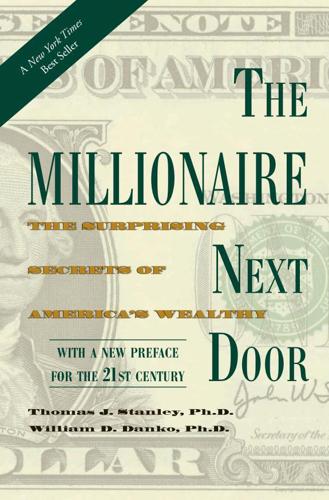
The Millionaire Next Door: The Surprising Secrets of America's Wealthy
by
Thomas Stanley
and
William Danko
Published 15 Nov 2010
Our numbers are growing much faster than the general population. Our kids should consider providing affluent people with some valuable service. Overall, our most trusted financial advisors are our accountants. Our attorneys are also very important. So we recommend accounting and law to our children. Tax advisors and estate-planning experts will be in big demand over the next fifteen years. ♦ I am a tightwad. That’s one of the main reasons I completed a long questionnaire for a crispy $1 bill. Why else would I spend two or three hours being personally interviewed by these authors? They paid me $100, $200, or $250. Oh, they made me another offer—to donate in my name the money I earned for my interview to my favorite charity.
…
Type B housewives tend to live in close proximity to their parents. They often accompany their mothers on shopping trips. It’s not unusual for middle-aged Type B housewives to receive clothing allowances from their affluent mothers and fathers. Parents also care for their Type B daughters via provisions in wills/estate plans. They are provided with cash gifts and inheritance because their parents believe they “really need the money.” In essence, Type Bs are cared for by their parents instead of the other way around. The parents of Type B housewives tend to hold back from distributing substantial cash gifts to their daughters out of fear that their daughters and their husbands may be poor money managers.
…
In fact, all things being equal, estates in which the heirs, typically the sons and daughters, are professional estate attorneys tend to be taxed less. Sons and daughters who are attorneys act as formal and informal legal advisors and opinion leaders for their affluent parents. They have a significant influence over all aspects of estate plans, including the choice of the estate attorney, provisions in wills, the ultimate disposition of family assets, the choice of executor(s), the use of trust services, and the incidence and size of the financial gifts to be given to children and grandchildren. “Attorney relatives” typically advise their affluent parents on how to minimize estate taxes via annual gift giving to the children and grandchildren.
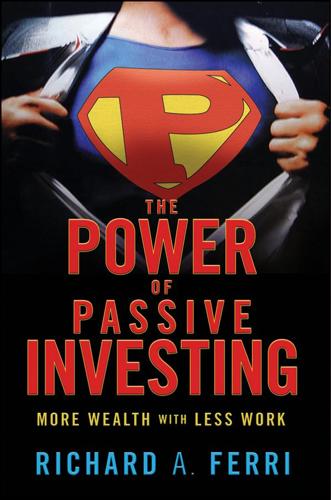
The Power of Passive Investing: More Wealth With Less Work
by
Richard A. Ferri
Published 4 Nov 2010
These include individual investors and their families, trustees of charities and private accounts, pension trustees and those who select investment options for employer sponsored pension plans, and professional investment advisors. Each of these four groups has special reasons why implementing a passive investment strategy is better for them. Individual investors should select a strategy that has the highest probability of reaching their retirement and estate planning goals. There is no reason to believe that an individual investor will find a top money manager who will outperform the markets. That’s why it’s undoubtedly in the best interest of an individual to create and maintain a portfolio of index funds and ETFs for the long run. Substantial time is spent explaining why passive investing is a prudent choice for trustees who have a legal responsibility to act in the best interest of the accounts they oversee.
…
Policy Changes Changing an investment policy is a major decision. Any change requires deep thinking and an evenhanded judgment and should not be made in a time of duress. There are several good reasons to change an investment policy. The following are four prominent reasons. 1. The account owner’s financial needs change. 2. Estate planning considerations change. 3. A bull market puts a portfolio close to its financial goal. 4. A bear market exposes more risk than an investor can handle. Financial needs change for all of us during life’s journey. There are periods when cash flow needs are high and periods when cash flow needs are low.
…
The next step is generally the purchase of a home, which often coincides with starting a family and all the costs associated with raising children. Sometime during middle age, focus shifts to securing adequate retirement income. During retirement, focus can shift again to a policy of giving. This is the distribution of wealth to family members and loved ones as well as favored charities. Estate planning takes care of the rest upon our demise. Accordingly, an investment policy review during different stages of life ensures that it is up to date with these changing priorities. Estimating Future Obligations We all have a limited time on Earth, and the government is kind enough to tell us about how much time that is.
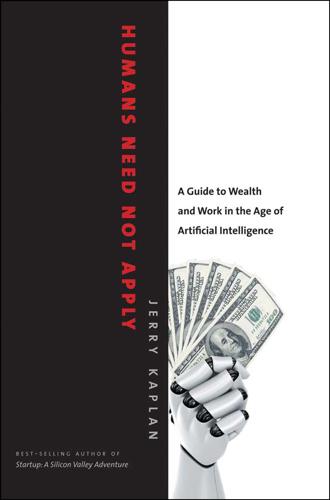
Humans Need Not Apply: A Guide to Wealth and Work in the Age of Artificial Intelligence
by
Jerry Kaplan
Published 3 Aug 2015
Common commercial contracts, from leases to loans to licenses to incorporation papers to purchase agreements, are well structured enough to allow a first draft, if not a final one, to be written by a computer program. Consider the legal-tech startup FairDocument.33 By focusing on estate planning, a well-defined and fairly routine area of law, the company is able to “interview” clients on its website and prepare initial draft documents. Potential clients answer some initial questions, then attorneys bid to get their business. Most of the time, if the case is relatively straightforward, attorneys opt for the standard recommended bid of $995 for an estate plan prepared through Fair-Document, for a service that might otherwise typically cost $3,500 to $5,000. You might think this simply reduces the lawyer’s pay, but attorneys still come out ahead because of what happens next.
…
Instead of conducting the usual phone or in-person interview to educate the new client and collect the needed information, then spending several hours drafting documents, the attorneys let FairDocument walk the client through a lengthy, structured online consultation, explaining the required concepts and collecting the client’s particulars. The software then delivers an initial draft to the lawyer, calling out areas that are likely to require his or her additional judgment or attention. Jason Brewster, the company’s CEO, estimates that FairDocument reduces the time required to complete a straightforward estate plan from several hours to as little as fifteen to thirty minutes, not to mention that his company is doing the prospecting for new clients and delivering them to the attorneys. A more sophisticated example of synthetic intellects encroaching on legal expertise is the startup Judicata.34 The company uses machine learning and natural language processing techniques to convert ordinary text—such as legal principles or specific cases— into structured information that can be used for finding relevant case law.
…
See also computers Ellison, Larry, 115 emissions trading (cap and trade), 168 empathy, 81, 82 employees. See labor market; workplace Energy Star program, 178 entrepreneurship, 44, 95–96, 200, 223–24n15 environmental protection, 168, 195 Environmental Protection Agency, 168, 178 equal opportunity, 170 estate planning, 146–47, 175 ethics, 9–10, 74–75, 79, 81–82, 87. See also moral agency European Union, 143 Experience Music Project Museum (Seattle), 114 expertise, 22–23, 29 expert systems (computer programs), 23 Facebook, 48 face-recognition capability, 40 Fairchild Semiconductor, 223–24n15 FairDocument, 146–47 Fair Labor Standards Act (1917), 171 fairness, 74–75, 102, 162–63 families.
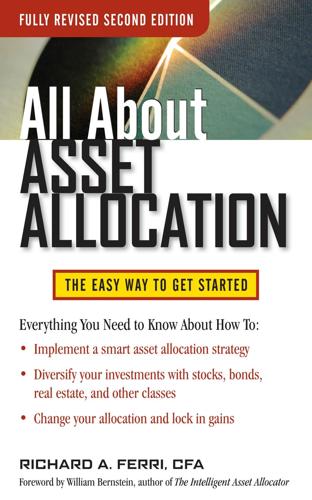
All About Asset Allocation, Second Edition
by
Richard Ferri
Published 11 Jul 2010
These fully retired investors are not as active as they used to be usually because of their own health concerns or those of a spouse. The needs for mature Building Your Portfolio 245 retirees are different from the needs of any other group. Their needs range from health planning, to long-term care, to estate planning. At this stage, financial matters are often discussed with children, other family members, or a professional trustee. Investors in all stages have some similar financial goals and similar concerns. Similar goals include a desire for financial security and the desire to pay less income tax. Similar concerns include the fear of running out of money and the fear of not having adequate health-care coverage when it is needed.
…
At some point, we all need to get our financial house in order and prepare for the afterlife. This means that someone else will be handling your financial affairs eventually. That may occur while you are still alive, and it will definitely occur after you’re gone. It is a common for mature retirees to do detailed estate planning. One of the decisions to make is who will manage their affairs when they are no longer able too. This chore is normally taken over by the healthy spouse while both husband and wife are still living. When there is only one person, the job is typically taken on by a son or daughter, a relative, or a professional representative.
…
When there is only one person, the job is typically taken on by a son or daughter, a relative, or a professional representative. I highly recommend that if you choose a son or daughter to handle your finances, you give them fair warning far in advance. Once a helper has been chosen, that person will need to become informed of your financial situation. This includes an understanding of your estate plan, your investment accounts, and your insurance documents, including knowing where all these things are located in your home. Any financial planner will tell you that the transition of financial responsibility from parents to children can work out either very well or very poorly. There are steps you can take to avoid cost and confusion and to ensure that the transition occurs smoothly.
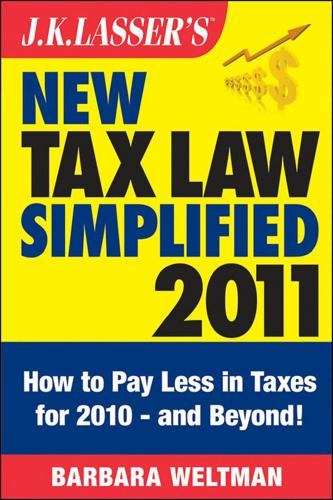
J.K. Lasser's New Tax Law Simplified: Tax Relief From the HIRE Act, Health Care Reform, and More
by
Barbara Weltman
Published 30 Nov 2010
In 2010, there were dramatic changes affecting each of these taxes, which are levied on transferring wealth. This chapter explains the changes in these transfer taxes for 2010 and what may lie ahead. This area of tax law is about to experience additional changes that certainly will affect your estate planning for years to come. There also may be state estate or inheritance taxes to deal with; state-level taxes are not covered in this chapter but should be discussed with your financial advisor. W Estate Tax Changes If your property (called your “estate”) at the time of your death is worth a certain amount, your estate usually has to file a federal estate tax return and your estate may owe federal estate taxes on the value of your assets.
…
Or if the value of your assets rises (e.g., the stock market recovers and the value of your stocks and stock mutual funds held both personally and in retirement accounts increases), again you may find that the size of your estate is large enough to fall victim to estate tax—or at least the need to plan to minimize or avoid it. Until now, a common estate-planning strategy for married couples with sufficient assets to be subject to the federal estate tax was to set up a credit shelter or by-pass trust so that the exemption amount could be fully used in the estate of the first spouse to die. It worked like this: A will provided that a credit shelter trust (also called a by-pass trust) would be created with an amount equal to the maximum exemption amount.
…
Discuss with your tax or legal advisor new ways to limit the amount of assets passing into a credit shelter or by-pass trust. For example, you may wish to limit the funding of a credit shelter trust to a set dollar amount or a percentage of the estate, or some combination of these two limits. Most important, you’ll want to review any current estate plans in light of estate tax changes that may be enacted for 2011 and future years. Miscellaneous Estate Tax Changes There are a number of changes that can affect the computation of the federal estate tax. Some of these changes are minor or merely technical in nature, but others can have a significant impact on the amount of taxes that will be paid by an estate.
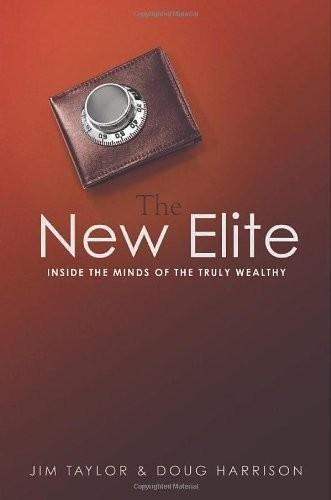
The New Elite: Inside the Minds of the Truly Wealthy
by
Dr. Jim Taylor
Published 9 Sep 2008
But in many respects, wealth brings with it new challenges, new complexities, and new risks, and the do-it-yourself approach that has served them well often becomes a disservice. Four in ten acknowledge that they are not as on top of their finances as they should be. In fact, about half get no professional wealth management advice, relying only on themselves, friends, spouses, and other relatives. This causes problems in areas as basic as estate planning. Over a quarter don’t have an updated will, and they question whether there will be a smooth transition after their death. Nearly one in five expects serious conflict among their relatives after their passing. And consider risk management. Threefourths know that there are property insurance companies that specialize in the challenges faced by wealthy households.
…
On a personal level, three-quarters feel they are not as in control of their finances as they would like to be—by far the highest of any segment. Many struggle with the fear that they could lose all their money and have to start rebuilding their lives all over again, despite their average of nearly $20 million in assets. Less than one in four feels he or she has an organized estate plan and many believe that the distribution of their assets will be a major source of family turmoil and conflict after their death. Virtually none of their kids have a good understanding of the value of their Flavors of Wealth 135 estate. Heck, forget the kids—over half of wrestlers haven’t told their spouses of the degree or nature of their financial empire!
…
In a retail context, they don’t look for an exclusive or luxurious sales environment, nor do they want to be made to feel like they are the most important customer in the store. Instead, they want sales staff who are knowledgeable, are down to earth, and treat them like ‘‘any other person off the street.’’ Mavericks are living in the moment, and are inherently selffocused; as a result, they tend to be less worried about the legacy of their money. In a sense, their estate plans are more often in their minds than on paper. While they are relatively likely to say they envision passing their companies to their children, they are among the least likely to have actually communicated any kind of plan for what would happen in the event of their injury or death. They are so psychologically entwined with their businesses and their ambitions they often find it difficult to think in concrete terms about any kind of exit or succession plan.
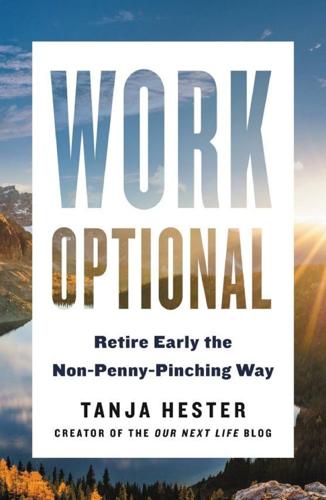
Work Optional: Retire Early the Non-Penny-Pinching Way
by
Tanja Hester
Published 12 Feb 2019
It might sound deeply unromantic to think that way, but I think it’s the exact opposite. Knowing that we’re together 100% by choice and that money plays no part in keeping us together—not even a little bit—is extra romantic and relationship affirming. Create Your Estate Plan If you have a partner, children, or anyone else you want to be sure has clear access to your assets after you’re gone, then you’ll want to be sure to have a strong estate plan in place as soon as possible. Depending on the laws in your state, it may not always be clear that your spouse gets automatic access to your accounts, especially if you have children from a prior marriage or other circumstances that create legal confusion.
…
If you wish to engage an estate attorney, keep an eye out for unnecessary add-ons that they may try to push. Financial experts say you do not need a revocable living trust in most circumstances, and an estate attorney who insists that you do is just trying to pad your bill. Find another attorney to work with. Estate planning is also important if leaving behind a charitable legacy is important to you, even if you do not have heirs. Write your will to specify how you’d like your assets divided when you pass on, and update the beneficiaries on all of your financial and insurance accounts to reflect whom you’d like to receive the funds.
…
BULLETPROOF PLANNING CHECKLIST Determine your asset allocation for both long-term growth and risk management. Decide which withdrawal strategy you’ll use. Create your bare-bones budget and determine how you’ll cut expenses if you need to. Determine what your sources of backup capital will be. Make sure you have adequate insurance for your circumstances. Create your estate plan. If you have a partner, discuss how you’ll handle divorce or splitting up. Determine how you could optimize your income to reduce health care costs, if needed. Stay current on financial analysis impacting retirement account, withdrawal strategy, etc. PART III THRIVING IN YOUR WORK-OPTIONAL LIFE Fast-forward to the moment when you can say you’ve done it.
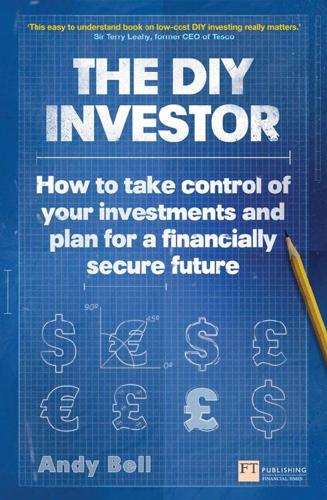
DIY Investor: How to Take Control of Your Investments & Plan for a Financially Secure Future
by
Andy Bell
Published 12 Sep 2013
This is why, in recent years, considerably more small companies have moved from a listing on the main LSE index to an AIM listing. Many stocks listed on AIM are overseas companies. Tax breaks for AIM shares A large number of shares held on AIM become exempt from inheritance tax once they have been held for two years, making them a potential estate-planning tool, although the downside is that the volatility associated with them makes them generally less suitable for investors approaching the end of their life. From 6 April 2014, AIM shares are exempt from stamp duty when they are purchased. Investing in AIM companies AIM companies are all about growth – not dividends – and liquidity is even more of an issue in AIM than it is in the FTSE SmallCap.
…
Onshore bonds are less attractive than they used to be years ago because returns are subject to a minimum tax of between 16 and 20 per cent, irrespective of your tax status. They can be of use to higher rate taxpayers wanting to defer paying tax until a time in the future when they pay tax at a lower rate – for example, in retirement. Offshore investment bonds can be useful estate planning tools in the event you have large sums of money to give away without attracting an inheritance tax liability, but these too need specialist advice. chapter 17 * * * When it all goes wrong – death, divorce, bankruptcy, complaints and the Financial Services Compensation Scheme Nobody likes to dwell on life’s negatives, but it is worth knowing what will happen to your money when significant personal events such as death, divorce or bankruptcy come along, or when an investment or investment provider goes bust.
…
chapter 17 * * * When it all goes wrong – death, divorce, bankruptcy, complaints and the Financial Services Compensation Scheme Nobody likes to dwell on life’s negatives, but it is worth knowing what will happen to your money when significant personal events such as death, divorce or bankruptcy come along, or when an investment or investment provider goes bust. Death and taxes Benjamin Franklin’s famous quote about death and taxes being the only things certain in life serves to underline just how important inheritance tax planning can be for your loved ones. This is a book about DIY investing, not about estate planning, so I am going to go no further than explain what happens to the various assets a DIY investor may have built up in the event of their death. In a nutshell, I would urge you to seek some professional advice and write a will. Intestacy laws do not always lead to the outcomes that you might expect, and society is full of people who have not benefited from their deceased loved one’s estate in the way they had hoped they would, often causing years of resentment and hardship for those affected.

Be Your Own Financial Adviser: The Comprehensive Guide to Wealth and Financial Planning
by
Jonquil Lowe
Published 14 Jul 2010
You have already seen how debt advisers can help (in Chapter 1). This chapter considers overall financial planning and generic advice, insurance M02_LOWE7798_01_SE_C02.indd 38 05/03/2010 09:50 2 n Do you need an adviser? 39 and mortgage advice, equity release, various types of investment advice, and estate planning and tax advice. A quick overview of who to consult is given in Table 2.1. Table 2.1 Types of advice For advice/to find an adviser (see Appendix B for contact details) Debt (Chapter 1) Debt adviser/ money adviser Citizens Advice Consumer Credit Counselling Service National Debtline Payplan Community Legal Advice Money Advice Scotland Advice NI Overall financial planning (all chapters) Independent financial adviser IFA Promotion Institute of Financial Planning Personal Finance Society Generic financial advice (all chapters) Money guidance service Moneymadeclear Insurance (Chapters 3 to 5) Insurance broker Independent financial adviser Insurance providers British Insurance Brokers Association IFA Promotion Institute of Financial Planning Personal Finance Society Mortgage (Chapter 6) Mortgage broker Mortgage providers IFA Promotion Equity release Independent financial adviser Equity release providers IFA Promotion Institute of Financial Planning Personal Finance Society Safe Home Income Plans (SHIP) M02_LOWE7798_01_SE_C02.indd 39 Area of financial Type of adviser planning (where to find information in this book) 05/03/2010 14:27 40 Part 1 n Planning and advice Table 2.1 Types of advice continued Type of adviser Area of financial planning (where to find information in this book) For advice/to find an adviser (see Appendix B for contact details) Government The Pension Service State pensions (Chapters 7 and 8) Independent advice The Pensions Advisory organisation Service Occupational pensions Pension scheme (Chapters 7 and 8) trustees/pensions administrator Independent advice organisation Independent financial adviser Pension scheme trustees Your HR department at work The Pensions Advisory Service IFA Promotion Institute of Financial Planning Personal Finance Society Personal pensions Independent financial adviser IFA Promotion (Chapters 7 and 8) Independent advice Institute of Financial Planning organisation Personal Finance Society Personal pension providers The Pensions Advisory Service Pension transfers Independent IFA Promotion financial adviser Institute of Financial Planning Consulting actuary Personal Finance Society Association of Consulting Actuaries Society of Pension Consultants Stock-market investments Stockbroker London Stock Exchange (e.g. shares and bonds) Association of Private Client (Chapters 9 and 10) Investment Managers and Stockbrokers (APCIMS) Independent Other investments (Chapters 9 and 10) financial adviser Investment providers M02_LOWE7798_01_SE_C02.indd 40 IFA Promotion Institute of Financial Planning Personal Finance Society 05/03/2010 09:50 2 n Do you need an adviser?
…
Table 2.1 Types of advice For advice/to find an adviser (see Appendix B for contact details) Debt (Chapter 1) Debt adviser/ money adviser Citizens Advice Consumer Credit Counselling Service National Debtline Payplan Community Legal Advice Money Advice Scotland Advice NI Overall financial planning (all chapters) Independent financial adviser IFA Promotion Institute of Financial Planning Personal Finance Society Generic financial advice (all chapters) Money guidance service Moneymadeclear Insurance (Chapters 3 to 5) Insurance broker Independent financial adviser Insurance providers British Insurance Brokers Association IFA Promotion Institute of Financial Planning Personal Finance Society Mortgage (Chapter 6) Mortgage broker Mortgage providers IFA Promotion Equity release Independent financial adviser Equity release providers IFA Promotion Institute of Financial Planning Personal Finance Society Safe Home Income Plans (SHIP) M02_LOWE7798_01_SE_C02.indd 39 Area of financial Type of adviser planning (where to find information in this book) 05/03/2010 14:27 40 Part 1 n Planning and advice Table 2.1 Types of advice continued Type of adviser Area of financial planning (where to find information in this book) For advice/to find an adviser (see Appendix B for contact details) Government The Pension Service State pensions (Chapters 7 and 8) Independent advice The Pensions Advisory organisation Service Occupational pensions Pension scheme (Chapters 7 and 8) trustees/pensions administrator Independent advice organisation Independent financial adviser Pension scheme trustees Your HR department at work The Pensions Advisory Service IFA Promotion Institute of Financial Planning Personal Finance Society Personal pensions Independent financial adviser IFA Promotion (Chapters 7 and 8) Independent advice Institute of Financial Planning organisation Personal Finance Society Personal pension providers The Pensions Advisory Service Pension transfers Independent IFA Promotion financial adviser Institute of Financial Planning Consulting actuary Personal Finance Society Association of Consulting Actuaries Society of Pension Consultants Stock-market investments Stockbroker London Stock Exchange (e.g. shares and bonds) Association of Private Client (Chapters 9 and 10) Investment Managers and Stockbrokers (APCIMS) Independent Other investments (Chapters 9 and 10) financial adviser Investment providers M02_LOWE7798_01_SE_C02.indd 40 IFA Promotion Institute of Financial Planning Personal Finance Society 05/03/2010 09:50 2 n Do you need an adviser? 41 Table 2.1 Types of advice continued Type of adviser Area of financial planning (where to find information in this book) For advice/to find an adviser (see Appendix B for contact details) Tax adviser Chartered Institute of Estate planning (Chapter 11) Independent financial adviser Taxation Society of Trust and Estate Practitioners IFA Promotion Institute of Financial Planning Personal Finance Society Tax Tax advisers Chartered Institute of (all chapters Independent Taxation and Appendix A) advice organisation Accountants Tax Aid Tax Help for Older People State benefits Government (all chapters Money advisers and Appendix A) Jobcentre Plus The Pension Service Citizens Advice Community Legal Advice Money Advice Scotland Overall financial planning Independent financial advisers (IFAs) can either help you with specific aspects of financial planning (as described below) or take a holistic approach that aims to sort out all aspects of your finances in an integrated way, often developing a life-long relationship with you in much the same way as you might choose one firm to act as your family solicitor.
…
In some cases, advisers did not draw this adequately to their customers’ attention. When the stock market fell over the period 2000 to 2003, many of these bonds matured with a loss. Around £159 million was paid out in compensation to customers, three large providers were fined and an IFA banned from trading.11 Estate planning and tax advice Tax advice is not regulated by the FSA or by any other statutory regulator. In fact, anyone can set themselves up and call themselves a tax adviser. But many advisers belong to professional bodies that require their members to have qualifications, keep their knowledge up to date through continuous professional development and to behave ethically and professionally in their dealings with clients.
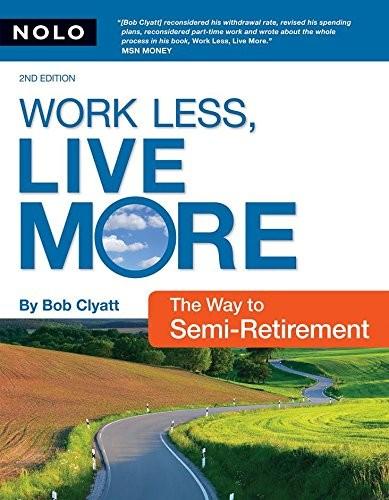
Work Less, Live More: The Way to Semi-Retirement
by
Robert Clyatt
Published 28 Sep 2007
. $29.99 PICL Nolo’s Encyclopedia of Everyday Law............................................................................................... $29.99 EVL Nolo’s Guide to California Law......................................................................................................... $24.99 CLAW ESTATE PLANNING & PROBATE 8 Ways to Avoid Probate ................................................................................................................. $19.99 PRAV Estate Planning Basics . ................................................................................................................... $21.99 ESPN The Executor’s Guide: Settling a Loved One’s Estate or Trust........................................................... $34.99 EXEC How to Probate an Estate in California............................................................................................. $49.99 PAE Make Your Own Living Trust (Book w/CD-ROM)........................................................................... $39.99 LITR Nolo’s Simple Will Book (Book w/CD-ROM).................................................................................. $36.99 SWIL Plan Your Estate............................................................................................................................... $44.99 NEST Quick & Legal Will Book (Book w/CD-ROM) ................................................................................ $19.99 QUIC Special Needs Trust: Protect Your Child’s Financial Future (Book w/CD-ROM)............................... $34.99 SPNT ORDER 24 HOURS A DAY @ www.nolo.com call 800-728-3555 • Mail or fax the order form in this book Price Code FAMILY MATTERS Always Dad...................................................................................................................................... $16.99 DIFA Building a Parenting Agreement That Works.................................................................................. $24.99 CUST The Complete IEP Guide................................................................................................................. $34.99 IEP Divorce & Money: How to Make the Best Financial Decisions During Divorce................................. $34.99 DIMO Divorce Without Court.................................................................................................................... $29.99 DWCT Do Your Own California Adoption: Nolo’s Guide for Stepparents & Domestic Partners (Book w/CD-ROM)....................................................................................................................... $34.99 ADOP Every Dog’s Legal Guide: A Must-Have for Your Owner.................................................................. $19.99 DOG Get a Life: You Don’t Need a Million to Retire Well........................................................................ $24.99 LIFE The Guardianship Book for California.............................................................................................. $34.99 GB A Legal Guide for Lesbian and Gay Couples..................................................................................... $34.99 LG Living Together: A Legal Guide (Book w/CD-ROM)........................................................................ $34.99 LTK Nolo’s IEP Guide: Learning Disabilities........................................................................................... $29.99 IELD Parent Savvy..................................................................................................................................... $19.99 PRNT Prenuptial Agreements: How to Write a Fair & Lasting Contract (Book w/CD-ROM)...................... $34.99 PNUP Work Less, Live More....................................................................................................................... $17.99 RECL GOING TO COURT Beat Your Ticket: Go To Court & Win!
…
If your family is a close one and your parents are sufficiently affluent and insured so that there will almost surely be a sum to pass along, it makes sense to include the likelihood of an inheritance in your long-run financial planning. However, relying on circumstances outside your control and the estate planning wishes of your parents comes with risks: The funds might skip a generation and go directly to your children. They may end up being shared with charities or a late-life spouse and family. Or they may simply be used to pay for your parents’ own long-term care. Resource For a discussion of passing along family wealth and advice on how to discuss passing along family wealth with your parents, see Get a Life: You Don’t Need a Million to Retire Well, by Ralph Warner (Nolo). 124 | Work Less, Live More A New Look at Rising Standards of Living For those just switching gears into semi-retirement, another point to bear in mind is that human nature seems wired up to expect a gradually increasing standard of living over the years.
…
The same basic technique can also be used by any older investor seeking to defer or avoid capital gains taxes, through the use of a trust. The appreciated property is placed in a trust, which must then pay the scheduled payment to the investor for life. Private annuities are powerful, but inflexible—and it may be wise to seek professional advice from an experienced estate planning attorney when deciding whether and how to set one up. Resource A good description of the benefits and pitfalls of private annuities is offered by attorney Joseph Petrucelli at www.privateannuities.com/ private_annuity_petrucelli.htm. Demand Low Fees Your portfolio’s management fees, which you can find in the fund’s prospectus or by entering the ticker at www.morningstar.com, should average below 0.5% per year, and some semi-retirees can get even lower, into the range of 0.2% per year.
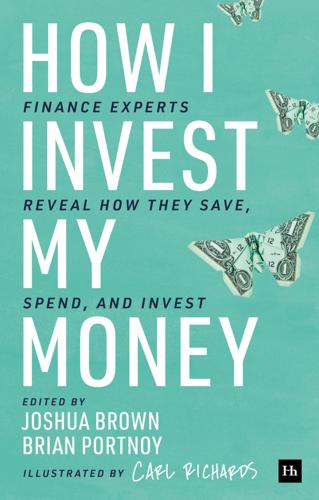
How I Invest My Money: Finance Experts Reveal How They Save, Spend, and Invest
by
Brian Portnoy
and
Joshua Brown
Published 17 Nov 2020
I am confident every contributor to this book offers similar investment and financial planning strategies including, in no particular order: simplicity; aggressive saving; a balanced lifestyle; diversification; low costs; a sensible asset allocation consistent with one’s goals, risk capacity, and risk tolerance; smart asset location; careful tax/estate planning and management; and a focus on the power of compound interest. I do too, and it’s all important.4 The whys are more important. One’s purposes provide the foundation upon which a financial plan is built. A good financial plan is designed to provide a means and the funding for living out one’s life… on purpose.
…
A will outlines your wishes and removes the guesswork after you are gone. This is wisdom I impart on my clients when talking about uncomfortable topics. My dad showed me the life insurance policies that he purchased for himself and my mom. He taught me how to crack the safe and how to locate the estate planning documents so that I could take care of mom in case anything happened to him. He advocated for addressing serious topics on a proactive basis, because if you do not buy life insurance or do not prepare for “what if” scenarios, it does not mean they will not happen. After graduating with a BA in East Asian Language and Literature, I was awarded a scholarship by the Japanese Ministry of Education to attend Keio University and work in Tokyo, Japan.
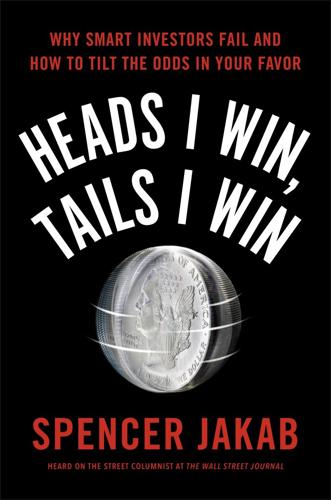
Heads I Win, Tails I Win
by
Spencer Jakab
Published 21 Jun 2016
Other studies have shown that fund managers’ personal portfolios do no better than those of individual investors.6 Please don’t equate financial literacy with poor results, though. The culprit is overconfidence and hyperactivity, not knowledge. Investing and the rules around it, particularly taxes and estate planning, are complicated, and you should be an informed consumer of financial services just like anything else. And if you haven’t read much about the actual art of investing, then I certainly don’t think a little knowledge is a dangerous thing. Knock yourself out if you want to learn about a subject that I hope fascinates you as much as it does me.
…
A big caveat here is that you need to have some substantial assets already to be worth the time of many financial advisors. Some will take on what the industry calls “Henrys”—people who are high earning not rich yet—but your salary and net worth may require fees that are higher than 1 percent to get much face time. Furthermore, some of the additional services that only a human can provide—estate planning and moves to minimize your taxes—may not really be of use to someone of more modest means. Finally, a financial advisor typically will offer little guidance for a workplace retirement account. Doing it yourself may be your best bet in that case. And even if you are in the right tax bracket to avail yourself of an advisor, there’s no guarantee that having a human being a phone call away will put you on the financial straight and narrow.
…
: Or, A Good Hard Look at Wall Street (Schwed), 149–50 You Can Be a Stock Market Genius (Greenblatt), 192 Brandes Institute, 194–95 Bridgewater Associates, 172 brokerage accounts/firms, 2, 19, 23, 32, 56, 83, 143, 196–97, 207, 209–11, 216–17, 228, 257 Brown Brothers Harriman, 90 Buckingham, John, 128–29 Buffett, Warren, 3, 30, 160 advice of, 34, 157–58, 161–62, 235–36 and bet with Seides, 171, 174–75 criticizes hedge funds, 169–71 and Graham-and-Doddsville, 218–19, 223 inspired by Graham, 194, 218–19, 232 and value investing, 113, 157–58, 220 bull market, 32, 38, 42–43, 46, 51–52, 55–61, 70, 75, 88, 90–92, 117, 124, 149, 214 Bureau of Economic Analysis, 57 Burns Advisory Group, 151 BusinessWeek, 126, 144, 213, 238 CalPERS, 186–87 Capital Decimation Partners, 164, 168, 172 Carlson, Ben, 30–31, 44, 61 CGM Focus Fund, 111 Charles Schwab, 83 Chicago Board Options Exchange (CBOE), 239–40 Clipper Fund, 105 Cohen, Abby Joseph, 128 Columbia University, 108, 217–18 commissions, 18, 135, 156, 181, 197, 202, 209, 211, 217 commodity investing, 73, 81, 205–6, 251 compound annual return, 19, 52–54, 64, 67, 95, 111, 219 average return, 75–76, 110 interest, 2, 4, 14, 30–31, 44, 91 contango phenomenon, 205–6 Cook, Michael, 154 Countrywide Financial, 109 Courtney, Tim, 150–52 Cramer, Jim, 118, 128 crashes, 76, 234, 242 of 1929, 39, 51, 54, 92–93, 123–24, 232–33, 236, 238, 240–41, 243 of 1973–74, 75, 237 of 1987, 33, 39–40, 51, 125–26, 233, 236, 240–41 of 1998, 33, 166–67, 238 of 2008, 33, 40, 47, 50, 61, 84, 126, 174–75, 236, 239, 241–42 Credit Suisse, 181 CXO Advisory Group, 128–29 cyclically adjusted P/E (CAPE), 92–95 Dalbar, 13–14, 16, 32–33, 37, 74 decision markets, 146 DiMaggio, Joe, 98, 102, 104 Direxion Daily Small Cap Bull & Bear 3x ETF, 204 dividend investing, 54, 216–17, 226–29 Dodd, David, 194, 218–19 dot-com boom, 132, 179, 186, 193, 195, 237, 242 Dow Jones Industrials, 42, 251 beating it, 219 dividend-yielding stocks of, 192 drops in, 33, 45, 52, 125–26 increases in, 46, 88 and mutual funds, 152 predictions of, 121, 123–26 Dreman, David, 128–29 Drudge Report, The, 46–47 Eastman Kodak, 101, 109 economic contractions, 50, 52–54 growth, 49, 52, 57, 71 recessions, 47–52, 56–58, 143–44, 232 statistics, 57, 59–60 Economist, 30 efficient market theory, 98, 108, 112, 146, 149, 158, 219, 225 Einhorn, David, 173 Einstein, Albert, 30, 44 Elliott, Ralph Nelson, 124 emerging markets, 83, 86, 135, 187, 238 emotional investing, 18, 21, 180, 200, 223, 234–36, 249–50 Employee Benefit Research Institute, 80 endowments, 81–82, 174, 187 energy companies/stocks, 100, 104, 109, 200. See also gas; oil Enron, 80, 101, 143 equity risk premium, 69, 73 estate planning, 23, 252 Estimize, 146 Eurozone crisis, 46–47 exchange-traded funds (ETFs), 186, 189, 192, 204–5, 216–17, 222–25, 227–28 expert advice, 30, 146 believing in, 120–21 find the cheapest, 18, 26, 147, 251 high cost of, 3, 14, 16–17, 26–27 need for, 20–21, 62, 250–52, 254, 257 poor advice from, 24–25 “robo,” 27, 83, 145, 217, 250, 252, 257 See also analysts; financial: pundits; fund managers; market predictors ExxonMobil, 195 Faber, David, 248 Faber, Marc “Dr.
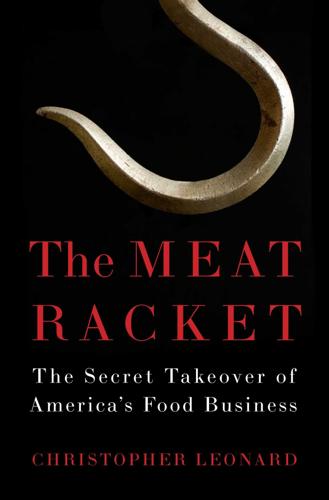
The Meat Racket: The Secret Takeover of America's Food Business
by
Christopher Leonard
Published 18 Feb 2014
A company like Tyson made millions of dollars in profit every year even if its business strategy was marred by errors, bad investments, and questionable leadership. * * * As Don Tyson pulled away from daily operations at Tyson Foods, so too did his friend and lawyer Jim Blair. But the two often spent time together, and Jim Blair helped Don Tyson with a number of legal jobs, such as doing his estate planning. For Don Tyson, estate planning involved a lot more than simply figuring out to whom he was going to leave his money. It involved the sticky questions of how Don Tyson would bequeath his company stock, and therefore his power, to certain heirs and not to others. Along with his son, Johnny, Don had three daughters.
…
(USDA), 45, 141, 153, 175, 202, 246, 263, 265, 269, 273, 275, 276, 280, 281, 282, 289, 290, 291, 294, 295, 297, 300, 301, 302, 327n beef grades given by, 213, 215–16, 222 central planning regime of, 165 DOJ’s joint public workshops with, 12, 279–82, 287, 288, 289, 294–95, 298, 302–3 Farmers Home Administration of, 140 Farm Service Agency of, 139–45 labor disputes and, 84–85 OMB meetings with, 298–99 “Visions for the Millennium” event of, 244–46, 250 see also Grain Inspection, Packers and Stockyards Administration Agri-Pulse industry news service, 291 Ainsworth Feed Yard, 219 Allen, Bob, 187–89, 191–94 brain aneurysm of, 197–98, 199, 200 debts of, 199–200 Tyson’s contract with, 193–94, 198 American Meat Institute, 251, 285, 286, 288, 289 Anderson, Andy, 169–70 Ankeny, Iowa, 12, 279–82, 287, 298 antibiotic drugs, 7–8, 221 antitrust laws, 12, 99, 145, 220, 248–49, 251, 254, 271, 277, 283, 284, 299, 301, 302 Antonio (cowboy), 207–8, 210 Archer Daniels Midland, 235 Arctic Alaska Fisheries, 159 Arkansas, 42, 48, 53, 57, 58, 60, 64, 67, 68, 82, 83, 87, 99, 138, 143, 144, 155, 158, 191, 192, 243, 244, 256, 262, 314, 316 immigrant workers in, 45–46, 114, 118–20, 137, 141 lack of contract farming regulation in, 257, 280 Ozark hill country in, 48, 55, 58, 106, 305, 306 Arkansas, University of, 53, 59, 65, 68, 74, 77, 151, 162, 314 Arkansas Valley Industries, 84 Armour and Company, 76, 84, 149, 169, 214 Arnold, Thurmond, 277 Asian immigrants, 212 see also Laotian immigrants Auburn University, 121, 132 auctions, cattle, 213, 219, 254 Avalos, Edward, 289–91 Baker, James R., 246–48, 249, 254 balloon loans, 200 banks, 1, 38–39, 55, 67, 98, 136, 138, 268, 281, 317 contract farmers extended loans by, 23, 26, 68, 70, 125, 127, 139, 140, 141–43, 144, 156, 188, 200, 247, 317 “dollar auctions” of, 57 Don Tyson’s risky loans from, 58–59, 67, 75, 78, 98 federal farm loan program and, 139–45 Barnicle, Mike, 298 Bass Brothers Enterprises, 101 Beef, 225 beef industry, 54, 92, 169, 171–72, 247, 308 battles between producers and meatpackers in, 208–9 biological innovations in, 6, 314 “boxed beef” in, 170–71, 172 cattle buyers in, 213–16, 217–21 centrally controlled system in, 215, 229, 266 “chickenization” of, 149, 152–53, 171–72, 173–74, 209, 216–17, 226, 242, 283 consolidation of power in, 5, 153, 171, 173–74, 208, 214, 215, 222, 229, 235, 248, 249, 280–81 corporate culture of, 210, 211, 215, 216, 218, 221 corporate oligarchy in, 5, 153, 171, 176, 208, 209, 212–13, 214, 218, 219, 220, 229, 235, 248, 249, 269, 280–81, 284 cutting of costs in, 212 declining consumer consumption in, 152, 158, 169, 171, 208, 242 declining quality of meat in, 153, 216, 224, 225 government regulations in, 66, 84–85, 220, 248, 254, 284 IBP’s dominance in, 169, 171, 174 lawsuits filed in, 269 lobbyists in, 210–11, 223, 285, 286, 295 loss of open, competitive market in, 5, 173–74, 209, 212–13, 217, 218–20, 221–23, 224, 229, 269 meatpacking sector in, see meatpackers rising consumer prices in, 248, 269, 294, 313 slaughterhouses in, 169–70, 172, 174, 211–12, 215, 221, 226, 311 Tyson’s business model adopted in, 149, 173–74, 209, 212n, 223, 225 Tyson’s dominance in, 180, 208–9, 281n USDA grades in, 213, 215–16, 222 vertical integration in, 5, 172, 209, 285 volatile market cycles in, 209, 213 Zilmax used in, 225, 226 see also cattle ranching; feedlots, cattle; meat industry Beef Marketing Group (BMG), 222, 223 Berryville, Ark., 8, 120, 150–51, 315, 317 Bethel, Bill, 35, 36, 38 Blair, Jim, 22–23, 82–83, 84, 94, 102, 145, 168, 176, 308–9 background of, 82, 99 Don Tyson’s estate planning by, 166–67 in merger and acquisition deals, 98–99, 100–101, 109–10 Blunt, Roy, 302 Bond, Richard, 180, 264 Borck, Lee, 222–24, 226, 284 “boxed beef,” 170–71, 172 Brazil, 305, 306 breeding techniques, 21, 53, 62, 92, 108–9, 157, 159, 167, 202–3, 237 Breimyer, Harold F., 230–31, 233, 260, 316 Britt, Wayne, 163–64 Brown, Tommy, 29–32, 103 Burger King, 91, 92, 107, 108 Burnett, Ron, 139–40, 141 Burris, Chris, 221 Bush, George W., 264 Bush administration, 175–76, 254, 255, 277, 303 butchers, 66, 170, 171, 178 Butler, Coy, 118, 119 Butler, J.
…
Robert, 121, 132 Tea Party movement, 290 tenant farming, 55–56 tenders, chicken, 106–7 Texas, 143, 144, 208, 219, 288, 307 Thomas, John, 193–94 Tollett, Leland, 74, 96, 160, 264, 305, 306 as CEO of Tyson Foods, 162–63 in internal coup at Tyson Foods, 178–79 in weekly managers’ meetings, 74, 92 turkey farming, 236, 272, 274 Turkey Federation, The, 251 Tyson, Cheryl, 309 Tyson, Don, 48, 56, 57, 63, 64, 65–67, 68–69, 70, 72, 82, 87, 97, 98, 99, 106, 157, 168, 170, 174, 264, 270, 305–6 in bringing chicken into fast-food markets, 91–92, 93–95, 107 charisma of, 160–61 childhood of, 51, 53–54, 111, 161, 310 “Class B” shares owned by, 162 control over Tyson Food’s maintained by, 162, 163, 178–79, 305–6 cost-cutting ethos of, 59, 60, 67, 78, 179–80 death and funeral of, 309–10, 312 declining health of, 305, 306–7, 308, 309 education of, 53, 59 employee loyalty fostered by, 161 estate of, 305, 306 estate planning of, 166–67 expansionist ambitions of, 64, 75, 81–82, 85–86, 99–100, 110, 111, 145–46, 152, 155, 159, 308 experimental hog farms of, 149–50, 152 father’s business lunches with, 62, 87, 91 father’s death and, 88–89 as field technician, 59, 69 final arrangements made by, 305–6 first slaughterhouse project overseen by, 60–62 fishing and boating of, 160, 307–8 in hostile acquisition deals, 99, 100–102 IBP merger opposed by, 174–75, 176 as industry visionary, 58, 59, 60, 65–66, 68, 75, 81, 86, 91, 93, 163, 310 internal coup at Tyson and, 178–80 legacy of, 310–11 market-downturn survival strategies of, 77–79, 86, 100, 179–80 1961 financial crisis and, 77–81, 266 public-offering decision of, 80–81 risk-taking and money borrowing of, 58–59, 61, 66, 67, 75, 78, 81, 98 in stepping away from daily operations, 159–60, 162, 163, 166 tutoring of son in family business by, 161–62 in weekly managers’ meetings, 74–76, 77, 87, 89, 92–93, 96 Tyson, Helen, 53, 54, 88 Tyson, Jean, 306 Tyson, John, 46, 47–48, 50, 51, 53, 57, 58, 59, 60, 61, 63, 66, 72, 74, 80, 82, 85, 87, 92, 111, 161, 174, 270 cautious approach of, 58, 67, 75, 89, 175 control of chicken farms sought by, 54–56 death of, 88–89 debt payments and depreciation rule of, 75, 100, 175 Don’s business lunches with, 62, 87, 91 feed business of, 53–54, 55, 56 firing of workers by, 56, 61 as focused on material side of business, 87–88 lack of sentimentality in, 48, 56–57 shipping business of, 48, 51, 52–53 Tyson, Johnny, 160–62, 167, 180, 264, 306, 307, 308 as CEO of Tyson Foods, 167, 169, 176–80 chairman appointment of, 163–64 childhood of, 161–62 drug and alcohol abuse of, 162, 164, 167 explosive temper of, 161, 178 father’s tutoring of, 161–62 IBP acquisition and, 174–76 internal coup against, 178–80 lack of respect among executives for, 161, 162, 164 rebranding campaigns of, 176–78, 179, 180 Tyson’s struggles under leadership of, 164, 167–69 Tyson, Randall, 88 Tyson Feed and Hatchery, 63 bookkeeping department of, 63, 64, 68, 71–72, 73 control of chicken farmers by, 62 cost-cutting ethos at, 59, 60, 67, 78, 79 creation of, 56 debts of, 75, 76, 77–78, 80 depression of prices paid to farmers by, 79 egg-laying farms at, 78–79, 80 in emergence of contract farming, 68, 70, 71 expansion of, 57, 58, 60, 64, 68, 69 farm ownership experiment of, 22, 23, 71 feed mills of, 58, 59, 61, 72 field technicians at, 59, 69, 71 first slaughterhouse built by, 60–61, 169–70 government inspections failed by, 61 grocery and restaurant contracts of, 54, 60, 62, 65–66, 73, 76 growing customer base of, 58, 60, 62, 64–65 hatcheries of, 58, 59, 61, 62, 72, 78, 79–80, 87 1961 financial crisis and, 76–80, 81, 266 organized chaos in early years of, 64, 65 origins of, 46, 48, 51, 52–56, 66, 92, 161 production scale-backs at, 77, 78 profits of, 58, 59 public offering decision of, 80–81, 92 slaughterhouse of, 60–61, 62, 66, 72, 169 Springdale offices of, 58, 63–64, 65, 74 tax evasion of, 66, 71–74 trucking lines of, 58, 59, 61, 62, 72 vertical integration of, 56, 58, 61, 62, 65, 66, 78 weekly managers’ meetings at, 74–76, 77, 155 Tyson Foods, 80–81, 92, 97, 98, 105, 118, 120, 135, 136, 138–39, 151, 161–62, 189, 240, 244, 245, 246, 251, 253, 261, 279, 291, 295, 303, 308, 310–11, 318–19 antibiotics used by, 7–8 Berryville complex of, 317 biological innovations spearheaded by, 5–6, 92, 109, 157 breeding techniques at, 21, 92, 157, 159, 167 Broiler Office of, 33–35, 36, 37 centralization of control at, 20, 21, 33, 34, 159, 229, 265–66, 270–71 “Class B” shares of, 162 Clinton as political patron of, 262, 268, 310 close monitoring of farms’ efficiency and profitability by, 20, 24, 33, 34, 115, 126, 130, 131 competition among top executives at, 93, 96, 160, 161 contract farming networks of, 7, 8, 29, 72, 105, 106, 140, 143;, 159, 200, 221, 226, 231, 243, 270, 310, 314, 316; see also contract farmers control of food markets by, 108, 110, 111, 114, 115, 176, 184, 204, 209, 266, 269, 270, 271, 273, 274, 275, 284, 310, 312, 313, 318 “Cornish game hens” gimmick of, 86–87 corporate workforce expansion at, 177, 178, 180 cost-cutting ethos at, 46, 102, 105, 106, 179–80, 312, 314, 315 cost models used at, 95–96 culture of placing blame on farmers in, 44, 103–4, 126, 130 debts of, 98, 175, 176 depression of prices paid to farmers by, 4, 7, 25, 31, 35, 46, 116–18, 119, 122, 126, 127, 132, 168, 188, 192, 203, 204, 269, 275, 312 diseased birds delivered by, 9, 17–20, 27–29, 32, 37, 38, 39–40, 41, 43–44, 103, 118, 133–34, 135, 136, 137 Donnie Smith as CEO of, 305, 311–12, 313 Don Tyson as maintaining control in, 162, 163, 178–79, 305–6 Don Tyson as stepping away from daily operations at, 159–60, 162, 163, 166 egg-laying farms of, 103, 270 as escaping public scrutiny, 3, 8 expansion of, 81–82, 85–86, 87, 93, 97–100, 101, 102, 108, 110, 111, 140, 145, 152, 155, 156, 157, 159, 167, 176, 177, 180, 306, 308, 310, 314, 318 farm/manufacturer hybrid quality of, 66, 98 fast-food contracts of, 30–31, 95, 98, 101, 107, 108, 109, 159, 169, 178, 225, 267, 275, 306, 311 feed mills of, 5, 8, 21, 24, 30, 33, 83, 103, 105, 134, 316 field technicians at, 9, 17, 18–20, 24, 28–32, 34, 39–40, 44, 102–4, 118, 120, 126, 137–38, 151, 192–93 financial losses in poultry division of, 264, 265, 266, 267, 270, 305 globalization of, 306, 308 government intervention as beneficial for, 58, 145, 166 government regulations evaded by, 66, 85 Green Forest plant of, 106–8 grocery and chain supplier contracts with, 3, 31, 83, 158, 159, 169, 178, 225, 265, 267, 275, 288, 311 growing customer base of, 98, 101, 108, 159 hatcheries of, 5, 19, 21, 36–37, 44, 83, 103, 108, 134, 270 hidden prevalence of products supplied by, 2–3, 177, 178, 179, 311 hog farming division of, see Tyson Foods, hog division of improving of complex efficiency at, 105–6, 107 industry dominance of, 3, 4, 5, 6–7, 108, 110, 111, 114, 145, 159, 160, 169, 174, 175, 176, 180, 204, 208–9, 233, 235, 266, 273, 281n, 318 Intensified Management Status program of, 126, 130, 131 internal coup at, 178–80 Johnny Tyson as CEO of, 167, 169, 174–75, 176–80 Johnny Tyson named chairman of, 163–64 labor disputes and, 83–85, 256 lawsuits filed against, 37, 100, 257, 269, 283, 317 lobbying operation of, 251n, 279, 286, 292, 295 market-downturn survival strategies of, 77–78, 100, 102, 179–80, 270–71, 305, 311–13 marketing department at, 106, 177–78, 180 mergers and acquisitions by, 81–82, 85–86, 93, 96, 98–102, 104, 105, 108, 109–10, 111, 174–76, 177, 306, 314, 316 Miller vs.
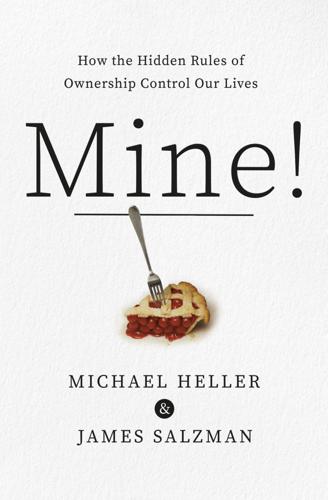
Mine!: How the Hidden Rules of Ownership Control Our Lives
by
Michael A. Heller
and
James Salzman
Published 2 Mar 2021
A Brief Exhortation Most of us will not be hiding our money in South Dakota dynasty trusts. Nor do we individually have the means to fight the harms that these trusts inflict—that will take the joint efforts of an informed electorate. But there is something practical you can do. Every year Heller devotes a class to “How to Be a Grownup.” The bottom line: create your own estate plan. It may be scary to think about, but it’s not hard to do. Every parent of a minor child needs a will, if for no other reason than to designate the child’s guardian. If you die without a will, the state will decide who raises your kids. Every older person needs a will, too, even if you don’t have significant assets.
…
When you write these documents, put in some thought about what your wishes really are. Talk with the people who will serve as your executor, trustee, guardian, and proxy—they can be different people. Make sure they know what you want. And update all this every few years, especially when you experience a life cycle event like marriage, children, or divorce. Estate planning is an area where it is reasonable to spend money on a lawyer. Laws vary by state, and it’s important to follow the rules precisely for your documents to be valid. Planning can provide closure, both emotional and practical, to family members at a particularly vulnerable moment. And you don’t necessarily need a lawyer, if that’s what is holding you back.
…
“We don’t pay taxes”: “Maid Testifies Helmsley Denied Paying Taxes,” New York Times, July 12, 1989. “The dog is the only thing”: “Where There’s a Will, There’s a Way to Stay ‘Queen of Mean’ ” (editorial), Chicago Sun-Times, August 31, 2007. “No more questions”: Bullough, “Great American Tax Haven.” The bottom line: Alina Tegund, “There’s More to Estate Planning Than Just the Will,” New York Times, September 5, 2014. From Shared Sacrifice to Self-Sacrifice: The private law theory animating this section is developed in Carolyn J. Frantz and Hanoch Dagan, “Properties of Marriage,” Columbia Law Review 104 (2004): 75–133, and in Hanoch Dagan and Michael Heller, The Choice Theory of Contracts (Cambridge, UK: Cambridge University Press, 2017), 60–61, 121–22.
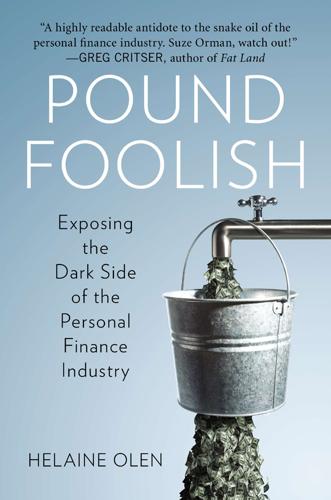
Pound Foolish: Exposing the Dark Side of the Personal Finance Industry
by
Helaine Olen
Published 27 Dec 2012
According to an AARP survey conducted in 2009, one in ten Americans over the age of fifty-five—that’s 5.9 million people—had attended a free lunch or dinner offered by someone pitching investment opportunities within the previous three years. These mixes of food and finance are so common that when I plug the words “Ruth’s Chris Steak House” and “seminar” into Google, I turn up investment seminars on everything from risk management to estate planning in California, Virginia, Massachusetts, Florida, and Rhode Island—and that’s just on the first results page. These “free” meals almost always follow the same pattern. Financial columnist Humberto Cruz, who attended half a dozen such seminars in 2007, found almost all the speakers “scaring and pressuring the mostly elderly audience with half-truths and distortions” all designed to “pressure them into high-commission products.”
…
A country-western star whose lack of spending discipline almost led her to bankruptcy court, Judd became a poster child for the financial therapy movement after taking Onsite’s week-long retreat, which offers attendees everything from such experiential therapy staples as psychodrama and visualizations to sessions devoted to teaching such basics of personal finance as cash flow management and tax and estate planning. Judd claims it was a life-altering experience, allowing her to shed both psychic trauma and unnecessary possessions. “I’ve liquidated all the vehicles down to the ones we actually use,” she proudly recounted in the New York Times. “If I can do it, anyone can.” Wynonna Judd as Financial Everywoman would be hilarious if it was a one-off with little in the way of consequences.
…
A Vanguard study found: John Ameriks, Jill Marshall, Liqian Ren, “Equity Abandonment in 2008-2009: Lower Among Balanced Fund Investors,” Vanguard, December, 2009, https://institutional.vanguard.com/VGApp/iip/site/institutional/researchcommentary/article?File=InvResEquityAbandon20082009. None of this should come as news: Brad Barber and Terrance Odean, “Too Many Cooks Spoil the Profit: Investment Club Performance,” Financial Analysts Journal, vol. 56, no. 1, 2000. As Financial Finesse CEO: Liz Davidson, “Nice Girls Talk About Estate Planning,” Forbes.com, http://www.forbes.com/northwesternmutual/3-reasons-why-men.html; “Financial Finesse Special Report: The Gender Gap in Financial Literacy,” June 15, 2011. In 2009, the researchers behind this theory: Sheelah Kolhatkar, “What if Women Ran Wall Street?” New York Magazine, March 21, 2010, http://nymag.com/news/businessfinance/64950.
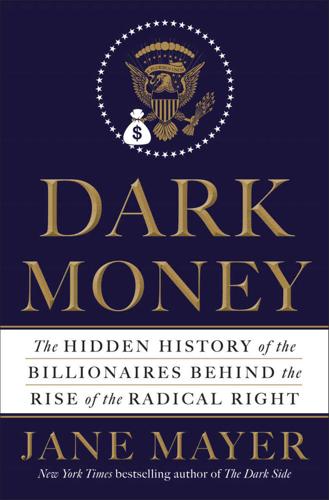
Dark Money: The Hidden History of the Billionaires Behind the Rise of the Radical Right
by
Jane Mayer
Published 19 Jan 2016
To minimize future taxes, Fred Koch took advantage of elaborate estate planning. Among other strategies, he set up a “charitable lead trust” that enabled him to pass on his estate to his sons without inheritance taxes, so long as the sons donated the accruing interest on the principle to charity for twenty years. To maximize their self-interest, in other words, the Koch boys were compelled to be charitable. Tax avoidance was thus the original impetus for the Koch brothers’ extraordinary philanthropy. As David Koch later explained, “So for 20 years, I had to give away all that income, and I sort of got into it.” Fred Koch’s estate plan treated each son equally, but according to Coppin, to ensure that his offspring would continue to obey him, he arranged to pass his fortune on to them in two stages, with the second half passing on only after his death.
…
Three years after the 1929 stock market crash, against this backdrop of class conflict and financial chicanery, Richard Mellon Scaife was born. His family, and later he himself, would continue to portray their embrace of low taxes and limited government as matters of high principle, as Andrew Mellon had. But his parents’ elaborate estate planning in order to minimize their own tax bills suggests that they had more than an abstract interest in the subject. Scaife’s parents created the largest of the family’s tax-exempt, charitable foundations, the Sarah Scaife Foundation, in December 1941, days after the Japanese attack on Pearl Harbor.
…
“there are certain laws”: Wenzl and Wilson, “Charles Koch Relentless.” Early on, the Internal Revenue Service: Coppin, “History of Winkler Koch,” 29. He remained vehemently opposed: Wilson and Wenzl, “Charles Koch Relentless.” Among other strategies: Gary Weiss, “The Price of Immortality,” Upstart Business Journal, Oct. 15, 2008; “Estate Planning Koch and Chase Koch (Son of Charles Koch): Past, Present, and Future,” Repealing the Frontiers of Ignorance, Aug. 4, 2013, http://repealingfrontiers.blogspot.com. “So for 20 years”: Weiss, “Price of Immortality.” he arranged to pass his fortune: In his letters, Fred Koch described his concerns about children given family fortunes at young ages who disowned their fathers, according to Coppin.
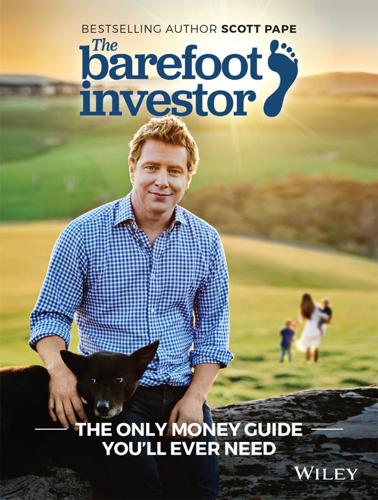
The Barefoot Investor: The Only Money Guide You'll Ever Need
by
Scott Pape
Published 22 Nov 2016
Alternatively (blatant plug alert), you can join our Barefoot Blueprint investment newsletter. If you need help sorting out aged-care options ... Again, call Centrelink on 132 300 and arrange a face-to-face meeting with one of their FISOs. The service is free and unbiased. They'll explain the costs involved with aged care, impacts on the age pension, options with your former home and estate planning considerations. What have you got to lose? If you need help sorting out your insurance … Again, call your super fund. They'll have financial advisors who can do a risk assessment and recommend insurance both inside and outside of super — and at wholesale rates instead of the eye-gouging commissions most financial planners charge (up to 125 per cent of the first year's premium — now that's what I call eye-gouging).
…
Here are their digits: ACT: (02) 6207 9800, ptg.act.gov.au NSW: 1300 364 103, tag.nsw.gov.au NT: (08) 8999 7271, nt.gov.au/law/bdm/about-public-trustee Queensland: 1300 360 044, pt.qld.gov.au South Australia: (08) 8226 9200, publictrustee.sa.gov.au Tasmania: (03) 6235 5200, publictrustee.tas.gov.au Victoria: 1300 138 672, statetrustees.com.au Western Australia: 1300 746 116, publictrustee.wa.gov.au And if life's a bit more, shall we say, ‘Geoffrey Edelsten' (read blended families, lots of dough), you should go to the Law Institute website in your state and find a solicitor who's an expert in professional estate planning. If you need a home loan … If you're refinancing, it's probably easier to bitch than it is to switch. Follow my scripts on page 202 and prepare to save a fortune. If you're going for your first home, check out online players like UBank and ING, who generally have the cheapest rates (although you'll need to have a 20 per cent deposit and a solid savings history).

Cashing Out: Win the Wealth Game by Walking Away
by
Julien Saunders
and
Kiersten Saunders
Published 13 Jun 2022
In fact, the inability to manage your money effectively can have a direct impact on your health and career choices. It can also affect your ability to maintain relationships, support family in need, or take breaks when you need them. Let’s be honest, haven’t we all witnessed an increase in GoFundMe campaigns in recent years because families don’t have adequate insurance or estate plans? Don’t we all know older workers who are staying on the job longer than they originally planned to because they don’t have enough retirement savings? Haven’t we all seen people work jobs they don’t enjoy despite being sick because they need the money? All of these instances are indicators of how fragile life has become for millions of people, yet too many of us are ignoring the problem.
…
In other words, conflict was a constant presence in our life that ebbed and flowed as time went on. In the three years we spent dating, we learned how to fight fair about money through having lots of conflict. But preparing for marriage brought on new challenges as we began to talk about higher-stakes decisions like estate planning and supporting our parents. We were haunted by the statistics we were finding about marriages, money, and divorce. According to the American Psychological Association, about 50 percent of marriages end up in divorce, and disagreements about money are the leading reason.[2] Knowing this, we made it our focus to improve the odds by taking money issues off the table and deciding that if we were going to get divorced, it was going to be because of the second or third most popular reason—anything but number one!
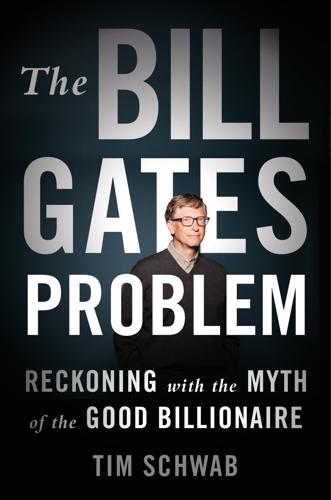
The Bill Gates Problem: Reckoning With the Myth of the Good Billionaire
by
Tim Schwab
Published 13 Nov 2023
saving a child’s life: David Wallace-Wells, “Bill Gates: ‘We’re in a Worse Place than I Expected,’” New York Times, September 13, 2022, https://www.nytimes.com/2022/09/13/opinion/environment/bill-gates-climate-change-report.html. upward trend resumed: Emily Glazer, Khadeeja Safdar, and Theo Francis, “Warren Buffett’s Estate Planning Sends Charities Scrambling,” Wall Street Journal, June 21, 2022, https://www.wsj.com/articles/warren-buffetts-estate-planning-bill-and-melinda-gates-foundation-sends-charities-scrambling-11655811074; Bill & Melinda Gates Foundation, Part VII, 2, IRS 990 Filings, 2014, 2015, 2016. “mission creep”: Mark Suzman, “Warren Buffett’s Generous Philanthropy,” Bill & Melinda Gates Foundation, n.d., https://www.gatesfoundation.org/ideas/articles/warren-buffett-philanthropy.
…
If I should become incapacitated, however, and be unable to administer my affairs, I direct whoever is in charge of my affairs to honor the commitment I am making in this letter. Additionally, I will soon write a new will that will provide for a continuance of this commitment—by distribution of the remaining earmarked shares or in some other manner—after my death.” McKinsey consultants: Glazer, Safdar, and Francis, “Warren Buffett’s Estate Planning Sends Charities Scrambling.” He abruptly stepped down: Tim Schwab, “Warren Buffett Moves to Distance Himself from Bill Gates,” Nation, June 25, 2021, https://www.thenation.com/article/society/warren-buffett-bill-gates/. after the deaths: Lisa Stiffler, “Melinda French Gates Counters Bill Gates’ Prediction That Their Foundation Will End in 25 Years,” GeekWire, October 12, 2022, https://www.geekwire.com/2022/melinda-french-gates-refutes-bill-gates-prediction-that-their-foundation-will-end-in-25-years/.
…
after the deaths: Lisa Stiffler, “Melinda French Gates Counters Bill Gates’ Prediction That Their Foundation Will End in 25 Years,” GeekWire, October 12, 2022, https://www.geekwire.com/2022/melinda-french-gates-refutes-bill-gates-prediction-that-their-foundation-will-end-in-25-years/. massive savings account: Glazer, Safdar, and Francis, “Warren Buffett’s Estate Planning Sends Charities Scrambling.” massive overhaul of teacher pay: Sam Dillon, “Gates Urges School Budget Overhauls,” New York Times, November 19, 2010, https://www.nytimes.com/2010/11/19/us/19gates.html. fiduciary irresponsibility: “Bill Gates: End-of-Life Care vs. Saving Teachers’ Jobs,” Interview by Walter Isaacson, June 8, 2010, Aspen Ideas Festival, YouTube, https://www.youtube.com/watch?
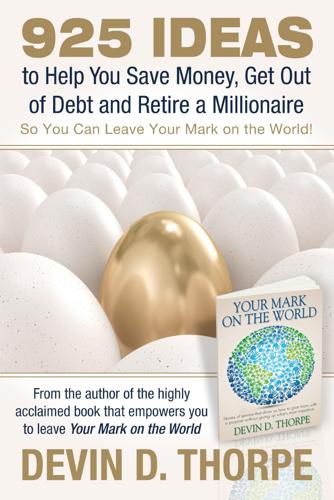
925 Ideas to Help You Save Money, Get Out of Debt and Retire a Millionaire So You Can Leave Your Mark on the World
by
Devin D. Thorpe
Published 25 Nov 2012
The key rule for retirement savings is the sooner the better. Making an extra-large deposit in your retirement savings years before you retire will have a bigger impact than saving the same amount of dollars over the remaining years to retirement. Estate planning: If you have accumulated a net worth (assets minus liabilities) of more than $1.5 million (congratulations by the way) you may need to talk to an estate planning attorney to help you organize your wealth for the most tax efficient way to move those assets to the next generation. Charitable giving: Of course, you can and should make charitable giving a part of every year’s financial planning.
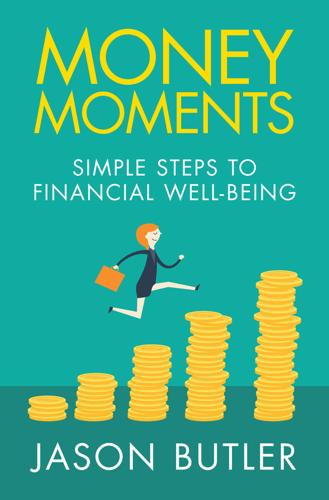
Money Moments: Simple Steps to Financial Well-Being
by
Jason Butler
Published 22 Nov 2017
The entire family is involved in the most important decisions, such as defining a mission for our wealth. 3. All family heirs have the option of participating in the management of the family’s assets. 4. Heirs understand their future roles, have “bought into” those roles, and look forward to performing those roles. 5. Heirs have actually reviewed the family’s estate plans and documents. 6. Our current wills, trusts, and other documents make most asset-distributions based on heir readiness, not heir age. 7. Our family mission includes creating incentives and opportunities for our heirs. 8. Our younger children are encouraged to participate in our family’s philanthropic grant-making decisions. 9.
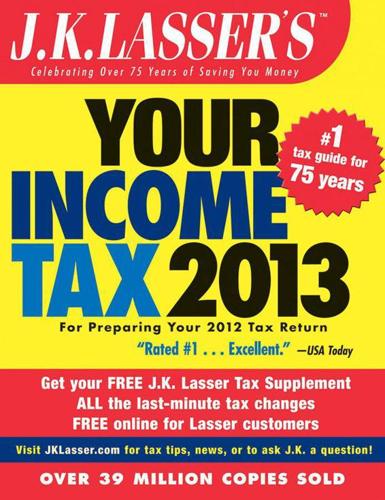
J.K. Lasser's Your Income Tax
by
J K Lasser Institute
Published 30 Oct 2012
- - - - - - - - - - For wages paid to a household employee in 2012, you will generally report FUTA on Schedule H, which you attach to your Form 1040. If you have regular business employees, see 38.2 for more reporting options. Chapter 39 Gift and Estate Tax Planning Basics Gift planning can be an important part of estate planning. This chapter provides an overview of the federal gift tax and estate tax. Developing an estate plan for your assets requires professional assistance, but the basic guidelines in this chapter can help you begin to estimate your potential estate and start thinking about property transfers that may reduce or avoid the estate tax. Relatively small gifts can completely avoid gift tax (39.2) because of the annual gift tax exclusion, which for 2012 is $13,000 per donee.
…
State death taxes. The deduction for state-level estate or inheritance tax (“state death tax”) that has applied since 2005 expires at the end of 2012. Starting in 2013, instead of a deduction, an estate can claim a limited tax credit for state death taxes. Periodically review your estate plan. No estate plan is ever really final. Economic conditions and inflation constantly change values. For this reason, your plan must be reviewed periodically as changes occur in your family and business, as when a birth or death occurs; when you receive a substantial increase or decrease in income; when you enter a new business venture or resign from an old one; or when you sell, retire from, or bring new persons into your business.
…
- - - - - - - - - - Caution Roth IRA Contribution Deadline The deadline for making Roth IRA contributions for 2012 is April 15, 2013, the regular due date for your 2012 return. This is the contribution deadline even if you obtain a filing extension for your 2012 return. - - - - - - - - - - A Roth IRA can provide attractive retirement planning and estate planning opportunities. Although annual contributions to a traditional IRA are barred once you reach age 70½ (8.2), contributions to a Roth IRA are allowed after age 70½, provided you have taxable compensation for the year and your modified adjusted gross income does not exceed the annual limitation (8.20).
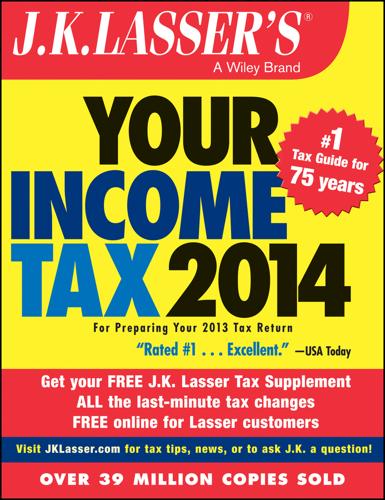
J.K. Lasser's Your Income Tax 2014
by
J. K. Lasser
Published 5 Oct 2013
- - - - - - - - - - Employers in some states will not be entitled to the full 5.4% credit because the state owes money to the federal unemployment fund. A worksheet in the Schedule H instructions shows the reduced credit rate allowed in the affected states. Chapter 39 Gift and Estate Tax Planning Basics Gift planning can be an important part of estate planning. This chapter provides an overview of the federal gift tax and estate tax. Developing an estate plan for your assets requires professional assistance, but the basic guidelines in this chapter can help you begin to estimate your potential estate and start thinking about property transfers that may reduce or avoid the estate tax. Relatively small gifts can completely avoid gift tax (39.2) because of the annual gift tax exclusion, which for 2013 is $14,000 per donee.
…
- - - - - - - - - - The estate of a nonresident alien is subject to estate tax only to the extent that the estate is located in the United States. A marital deduction may be claimed by the estate of a nonresident alien for property passing to a surviving spouse who is a U.S. citizen. If the surviving spouse is not a U.S. citizen, then the transferred interest must be in the form of a QDOT. Periodically review your estate plan No estate plan is ever really final. Economic conditions and inflation constantly change values. For this reason, your plan must be reviewed periodically as changes occur in your family and business, as when a birth or death occurs; when you receive a substantial increase or decrease in income; when you enter a new business venture or resign from an old one; or when you sell, retire from, or bring new persons into your business.
…
The key benefit of the Roth IRA is that tax-free withdrawals of contributions may be made at any time and earnings may be withdrawn tax free after a five-year holding period by an individual who is age 591/2 or older, is disabled, or who pays qualifying first-time home-buyer expenses. - - - - - - - - - - Caution Increased Pre–Age 591/2 Penalty In the first two years of SIMPLE IRA participation, the penalty for distributions before age 591/2 is increased from 10% to 25%. - - - - - - - - - - A Roth IRA can provide attractive retirement planning and estate planning opportunities. Although annual contributions to a traditional IRA are barred once you reach age 701/2 (8.2), contributions to a Roth IRA are allowed after age 701/2, provided you have taxable compensation for the year and your modified adjusted gross income does not exceed the annual limitation (8.20).

Secret Houses of the Cotswolds
by
Jeremy Musson
and
Hugo Rittson Thomas
Published 1 Mar 2018
With the estate being owned by a family trust, we certainly see ourselves principally as guardians of the house for future generations,’ says Mr Acland. A needlework tapestry designed by a previous owner of Notgrove, Colin Anderson (and made by the Royal School of Needlework) hangs in the hall of the house, depicting an estate plan with all the historic field boundaries and field names. Mr Acland says: ‘It was twice damaged by fires in the house and was kept folded in a drawer, and ever since I was a boy I wanted to restore and display it.’ The tapestry’s field names reflect the long and human history of this ancient place. 14 Owlpen Manor Gloucestershire ENCLOSED BY STEEPLY RISING HILLS and surrounded by beech woods and sheep pastures, Owlpen Manor is one of the treasures of the Cotswolds.
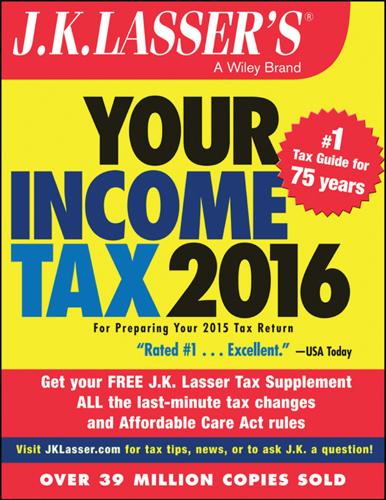
J.K. Lasser's Your Income Tax 2016: For Preparing Your 2015 Tax Return
by
J. K. Lasser Institute
Published 19 Oct 2015
If you are claiming an exemption when you file your return, complete Part II or Part III of Form 8965. Instructions for Form 8965 list a code for each exemption option. Chapter 39 Gift and Estate Tax Planning Basics Gift planning can be an important part of estate planning. This chapter provides an overview of the federal gift tax and estate tax. Developing an estate plan for your assets requires professional assistance, but the basic guidelines in this chapter can help you begin to estimate your potential estate and start thinking about property transfers that may reduce or avoid the estate tax. Relatively small gifts can completely avoid gift tax (39.2) because of the annual gift tax exclusion, which for 2015 is $14,000 per donee.
…
The estate of a nonresident alien is subject to estate tax only to the extent that the estate is located in the United States. A marital deduction may be claimed by the estate of a nonresident alien for property passing to a surviving spouse who is a U.S. citizen. If the surviving spouse is not a U.S. citizen, then the transferred interest must be in the form of a QDOT. Periodically review your estate plan. No estate plan is ever really final. Economic conditions and inflation constantly change values. For this reason, your plan must be reviewed periodically as changes occur in your family and business, as when a birth or death occurs; when you receive a substantial increase or decrease in income; when you enter a new business venture or resign from an old one; or when you sell, retire from, or bring new persons into your business.
…
The key benefit of the Roth IRA is that tax-free withdrawals of contributions may be made at any time and earnings may be withdrawn tax free after a five-year holding period by an individual who is age 59½ or older, is disabled, or who pays qualifying first-time home-buyer expenses. A Roth IRA can provide attractive retirement planning and estate planning opportunities. Although annual contributions to a traditional IRA are barred once you reach age 70½ (8.2), contributions to a Roth IRA are allowed after age 70½, provided you have taxable compensation for the year and your modified adjusted gross income does not exceed the annual limitation (8.20).
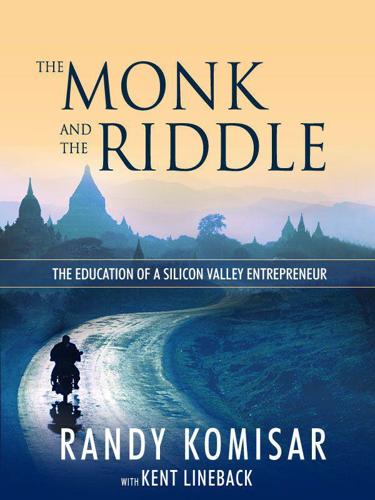
The Monk and the Riddle: The Education of a Silicon Valley Entrepreneur
by
Randy Komisar
Published 15 Mar 2000
"We'll bring together family members and friends, wherever they are in the world, and give them an opportunity to grieve, remember, mourn, and show their support in ways not possible until the Web. At the same time we'll help the dying cope with their own deaths and give them the resources to make plansfinancial arrangements and estate planning, for instancefor the families they leave behind. We need to deal with death and dying much better as a society. This business can help." "We want to make one's last moments as meaningful as possible," Allison continued, "by providing people with the Page 164 opportunity to connect to those who have given their lives meaning and purpose and, in the end, to make sense of their lives, in an intimate and caring community."
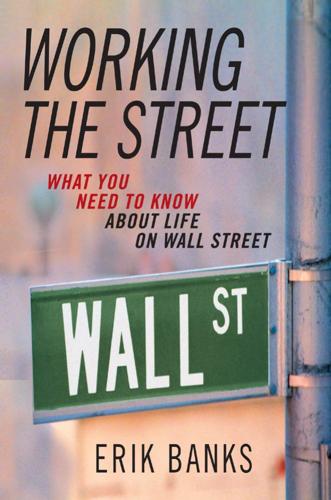
Working the Street: What You Need to Know About Life on Wall Street
by
Erik Banks
Published 7 Feb 2004
So Wall Street has specialists that advise people on what they should do with their salary and assets: how much they should save every year and how much they should put in stocks or bonds in order to meet their financial goals. They also talk about really boring—but really M i d d l e m a n : W ha t W a l l S tr e e t R e a l l y D o e s | 9 important—things like retirement plans, tax and estate planning, and insurance. Kind of like a guidance counselor. Naturally, all of this advice is useful, so it costs money, more fees. In fact, many people pay for an initial consultation (an “introductory” fee), the ongoing advice (an annual “wealth management” fee) and individual transactions (commissions or “transaction” fees).
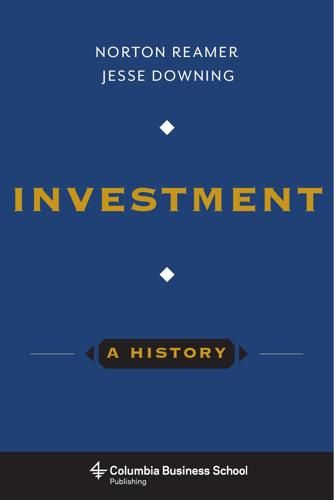
Investment: A History
by
Norton Reamer
and
Jesse Downing
Published 19 Feb 2016
Separate account management is usually highly customized and responsively provided, which means that qualifying clients normally find such investment services attractive and convenient. In the past few decades, a broad system of private wealth management has been created, bringing the features of a family office to a wider, albeit still limited, audience. This system takes into account the complicated needs of wealthy individuals, providing for estate planning and, importantly, keeping an asset base secure. Unlike a dedicated family office, private banking does not involve an entire organization devoted to the wealth of a single individual or family. However, private banking does require investors to have a high level of assets, and it provides personally tailored investment advising and other services that commercial bank branches and retail brokerages do not offer.52 J.
…
See also public debt decentralized management approaches, 7 deficit spending, 209–10 defined benefit plans: assets of, 113; liabilities and risks of, 122–23; regulations prohibiting too much stock ownership, 123; shift away from, 117, 295, 302 defined contribution plans, 113–14; growth of, 117, 122–23, 144, 295, 303; premature withdrawal fee for, 114 deflation, 198, 231 “Delta One,” 173 demand curve, 229–30 democratization of investment: accelerator of, 70; byproduct of, 291; definition of, 3; development of, 13, 318; impacts of, 139, 283, 296; links to, 120; manifestations of, 99, 116–17; origins of, 62–63; requirements of, 131; significance of, 7–8; story of, 97–98; success of, 147; theme of, 7, 98, 318; transition to, 61 420 Investment: A History Demosthenes, 24 Department of Labor, 275, 321 depository receipt, for government debt, 140 Depository Trust Company, 149 deregulation: of commission rate, 92; of savings and loan associations, 136 derivatives: leverage and, 214; opportunities with, 92; options pricing formula for, 235–36, 237; partial, 236; pricing, 230, 237; Samuelson on, 234–35; speculation in, 221 Deshima island, 48 Deutsche Börse, 95 Diamond Shamrock, 185–86 Diandang lending institution, 30 Dickens, Charles, 78 Dimmock, Stephen, 169–70 discounted cash flow models, 232–33 discovery, 332 Distilled Company, 181 Distilled Liquors, 164 distressed sales, 220 distressed turnaround operation, 19 diversification, 10; importance of, 229, 258, 319; risk and, 238–40 dividend discount model, of stock valuation, 232 Dodd, David, 250 Dodd-Frank Act, 194, 218, 220, 222 Dodson, James, 132 “Dogs of the Dow” strategies, 254 Dojima Rice Exchange, 45, 60 Donne, John, 121 Doriot, Georges, 274–75 doso (moneylenders), 31 dot-com bubble of 1999–2000, 213 Douglas, William, 166 Dow Jones UBS Commodity Index, 282 Drew, Daniel, 178–79 Drexel Burnham Lambert, 186 Duer, John, 175 Duer, William, 175–77 Dutch East India Company, 66, 85, 97 Dutch joint-stock companies, 64 dynamic hedging, 235–36 Easterlings, 65 East India Companies, 46–47, 49, 61, 69; British East India Company, 66, 326; Dutch East India Company, 66, 85, 97 Eccles, Marriner, 209 Ecclesiastes (Bible), 239 Ecloga laws, 52 economic expansion, 213–14 economies of scale, 75, 298 Economist, 302; Commodity-Price Index, 281 educational endowments, 124–25 Edward III (king of England), 44 Edward VI (king of England), 65 “Efficient Capital Markets: A Review of Theory and Empirical Work” (Fama), 249 efficient frontier, 241 efficient market hypothesis, 249–51, 253 Egypt: interest-free banking institutions in, 38; interest rates in, 23–24; lending in, 22–24 88888 account, 171 Einstein, Albert, 230 Eisenhower, Dwight D., 280 Elizabethan Act of 1571, 36 Employee Retirement Income Security Act (ERISA), 92, 112, 113, 282; impacts of, 292–93; rewriting of, 275 Index 421 endowments, 123–25, 145; educational, 124–25; in Greece and Rome, 56–57, 57; taxes and, 124; university, 257, 271, 296, 328 enforcement, improved, 147 England: Act of 1545, 36; banking in, 70, 73–75; joint-stock companies in, 64–66, 86; stock market in, 86–87; sugar consumption in, 75, 77 English Poor Law of 1601, 100 Enron, 68 Equitable Life Assurance Society, 132 equities markets, 114 equity index funds, 285 equity premium puzzle, 252–53 Erie Railway, 178–79 Erie War, 177–79 ERISA. See Employee Retirement Income Security Act estate planning, 138 estates: land and, 14–21; management, in Greece, 18–19; management, in Rome, 19–21 estates (ousiai), 21 ETFs. See exchange-traded funds Europe: medieval, 53–54; population growth in, 71 European Commission, 95 event-driven strategies, 265 exchange-traded funds (ETFs), 10, 284, 286–88, 287 expense fees, 304 Fama, Eugene, 235, 245, 249 Fannie Mae, 266, 321–22 farmland, agriculture and, 282 Federal Deposit Insurance Corporation (FDIC), 136–37 Federal Express, 277 Federal Housing Administration (FHA), 321 Federal Reserve: data from, 137; financial crisis of 2007–2009 and, 214; Great Depression and, 205–7; Great Recession and, 217– 18, 220–21, 225; Greenspan and, 213; interest rates and, 198; as lender of last resort, 216; policy of, 333; Strong and, 201 Federal Savings and Loan Insurance Corporation, 135–36 Federal Trade Commission (FTC), 211–12 feedback effects, 253 fees: event-based, 304; expense, 304; hedge funds, 261, 262, 270–71, 273, 301–2, 304–6, 308–9, 313, 314; implication of high, 311–12; management, 261, 270, 273, 304– 5; as misleading proxy for quality, 309–10; performance versus, 312– 15; premature withdrawal, 114.
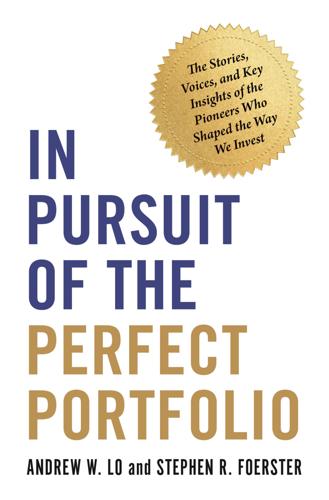
In Pursuit of the Perfect Portfolio: The Stories, Voices, and Key Insights of the Pioneers Who Shaped the Way We Invest
by
Andrew W. Lo
and
Stephen R. Foerster
Published 16 Aug 2021
Don’t invest in new or “interesting” investments for which you may not understand the associated risks. Don’t invest in bonds just because you’ve heard that they are conservative or safe. Understand the risks associated with them, particularly when interest rates are expected to rise. Write out your long-term goals and investing and estate plans and review them regularly. Use them to guide you. Distrust your feelings. Don’t make investment decisions based on emotions. So how does an investor avoid losing? “Winning the loser’s game of beating the market isn’t easy. Don’t play it. Concentrate on the winner’s game of defining and adhering faithfully to sound investment policies that are right for the market realities and right for your long-term goals and objectives.”52 Since everyone is different, his or her investment policies should be different as well.
…
This will determine whether you can embark on your investment pursuit alone or whether and when you should seek professional help. Back to our health analogy, in the same way that you may need to see an obstetrician, surgeon, or allergy specialist, you may also need to seek the assistance of financial specialists with expertise in mortgages, taxes, or estate planning. P2. Determine what your current and future financial needs are. This isn’t easy and requires deep personal reflection and a significant time commitment as well as regular reviews and some financial expertise, so you may also need the help of a professional here. Some obvious starting points are identifying your current income, both professionally and through any current investments.
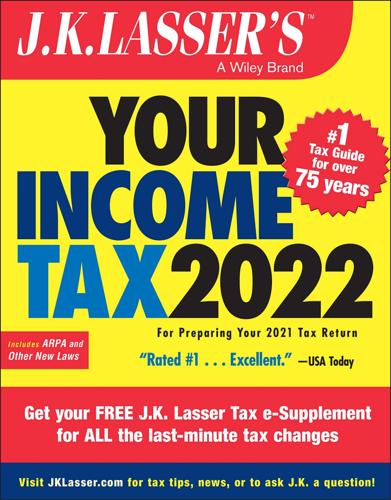
J.K. Lasser's Your Income Tax 2022: For Preparing Your 2021 Tax Return
by
J. K. Lasser Institute
Published 21 Dec 2021
Caution Reduced Credit for Some States If you are in a state that owes money to the federal unemployment fund, your FUTA credit for state unemployment taxes is reduced on Schedule H. Credit reduction states, if any, are listed in Schedule A of Form 940 and in the Schedule H instructions. CHAPTER 39 Gift and Estate Tax Planning Basics Gift planning can be an important part of estate planning. This chapter provides an overview of the federal gift tax and estate tax, which is separate and apart from income tax. Developing an estate plan for your assets requires professional assistance, but the basic guidelines in this chapter can help you begin to estimate your potential estate and start thinking about property transfers that may reduce or avoid the estate tax.
…
A special tax, called the generation-skipping transfer (GST) tax, may apply in this case (whether the transfer is made during life or at death). The GST exemption amount for 2021 is $11.7 million (the basic estate tax exclusion amount). The GST rules are complicated and you should consult an experienced tax professional if you are contemplating a generation-skipping transfer. Periodically review your estate plan. No estate plan is ever really final. Economic conditions and inflation constantly change values. For this reason, your plan must be reviewed periodically as changes occur in your family and business, as when a birth or death occurs; when you receive a substantial increase or decrease in income; when you enter a new business venture or resign from an old one; or when you sell, retire from, or bring new persons into your business.
…
The key benefit of the Roth IRA is that tax-free withdrawals of contributions may be made at any time and earnings may be withdrawn tax free after a five-year holding period by an individual who is age 59½ or older, is disabled, or who pays qualifying first-time homebuyer expenses (8.25). Caution Increased Pre–Age 59½ Penalty In the first two years of SIMPLE IRA participation, the penalty for distributions before age 59½ is increased from 10% to 25%. A Roth IRA can provide attractive retirement planning and estate planning opportunities. Roth IRA contributions can be made at any age, provided you have taxable compensation for the year and your modified adjusted gross income does not exceed the annual limitation under the Roth IRA phaseout rule (8.21). Also, the minimum required distribution rules that apply to traditional IRA owners (8.13) do not apply to Roth IRA owners.

Small Space Organizing: A Room by Room Guide to Maximizing Your Space
by
Kathryn Bechen
Published 1 Jan 2012
Remember to update the list if you add or subtract a box from the unit. Also, buy a portable battery-operated camping lantern for lighting since most storage facilities don’t have lighting inside individual units. And be sure to get two keys to your unit so that more than one family member has access to the files. It’s also a good idea to leave a key with your estate planning attorney. And of course, once a year go through your archive files and shred what no longer needs to be kept. Relocation Storage Unit Just a word about renting a storage unit temporarily while you’re relocating. Be sure to think through how you will stack your household items in your unit and don’t just shove them all in there.
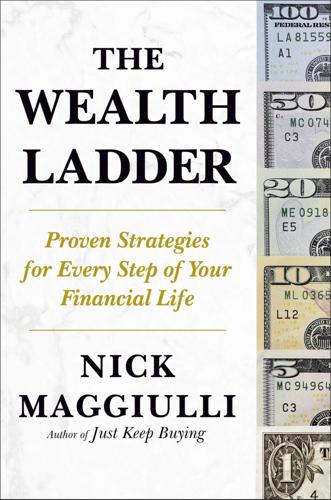
The Wealth Ladder: Proven Strategies for Every Step of Your Financial Life
by
Nick Maggiulli
Published 22 Jul 2025
Having a good accountant and being mindful of your tax decisions (e.g., where you live, when you sell your assets, etc.) can make a huge difference to your bottom line. While taxes matter for everyone, the cost of tax mistakes increase tenfold with every new wealth level. This is especially true if you plan on leaving assets to your heirs after you’re gone. Having the right estate plan can literally save you millions if the proper structures are put in place ahead of time. While it’s hard to make general statements about taxes given how individualized they can be, having the right tax team should pay for itself in Level 5 and beyond. What’s true for your taxes is also true for your financial life in general.
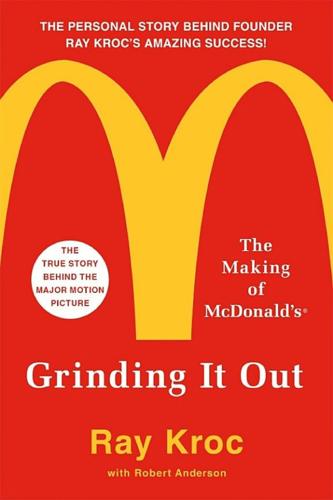
Grinding It Out: The Making of McDonald's
by
Ray Kroc
Published 1 Jan 1977
For openers, a new item I have in mind to help build our supper-hour trade. Renée is testing it, and if it turns out to be as good as I think it is, it will make the Colonel himself forget about fried chicken. Our menu development, aimed at filling out a three-meal day plus snacks for our restaurants, has a parallel in our real estate planning. I mentioned the “nook and cranny” notion of real estate development and that’s a good way of thinking of it. But the philosophy behind it is that we want to bring our restaurants to the people. We want to be where people live, where they work, and where they play. Urban real estate is a different ball game than the one we play in suburbia where McDonald’s grew up.

The Minimalist Home: A Room-By-Room Guide to a Decluttered, Refocused Life
by
Joshua Becker
Published 18 Dec 2018
When in doubt, seek advice from an accountant, lawyer, or other expert. For the rest of your life… birth and death certificates marriage licenses divorce decrees Social Security cards military discharge papers estate planning documents life insurance policies legal filings pension plan documents ID cards passports For seven years… tax returns (or longer, if they contain inaccuracies) supporting tax documentation For a year or more… loan documents (until after the loan is paid off) vehicle titles (until after you sell the vehicle) house deeds (until after you sell the house) mortgage documents (until after you pay off the mortgage) investment purchase confirmations (until after you sell the investment) monthly bank and credit card statements (unless you can access them online) For less than a year… ATM and bank deposit and withdrawal slips (until you reconcile with monthly statement) credit card receipts (until you reconcile with monthly statement) insurance policy (until the new one arrives) investment statement (until the new one arrives) Social Security statement (until the new one arrives) utility, cable, and cell phone bills (until you verify payment processed, or longer if you deduct these costs) ★ Step-by-Step Minimizing for Your Home Office Before minimizing your home office, clarify in your own mind how you want it to work.
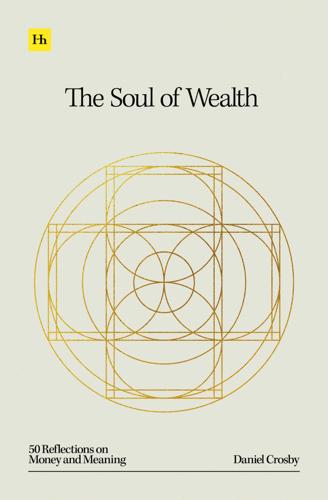
The Soul of Wealth
by
Daniel Crosby
Published 19 Sep 2024
It’s said that pros win points while amateurs lose them. Investing is the same way. Boring is beautiful. Going for the big score often results in a costly financial double fault. For many families, step one in not being dumb is to protect against catastrophe. Holding the right amount of insurance, building an emergency fund, maintaining an estate plan, and even taking care of yourself health-wise can all help mitigate financial pitfalls. When it comes to your investments, make it a point to save periodically, maybe through your retirement plan at work or in an IRA (or both). Once you have your investment train chugging along, be sure to diversify and plan for specific events, such as your children’s college or your retirement.
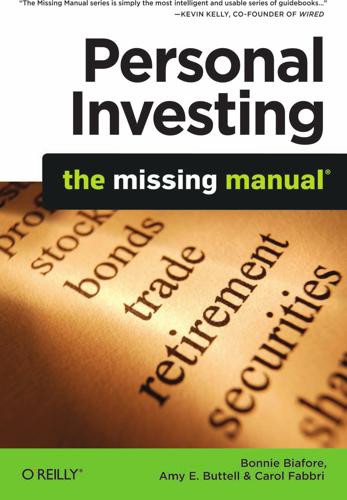
Personal Investing: The Missing Manual
by
Bonnie Biafore
,
Amy E. Buttell
and
Carol Fabbri
Published 24 May 2010
See asset allocation dividend reinvestment plan (DRIP), 111 dividends, 158 from mutual funds, 63 reinvesting, 158 from REITs, 62, 142–143, 145, 148 from stock, 56, 58, 124 dividend yield, 124 dollar cost averaging, 4, 178 double-clicking, as used in this book, 6 dragging, as used in this book, 6 DRIP (dividend reinvestment plan), 111 E earnings per share (EPS), 126 economic risk, 158 efficient market theory, 120 ego, excessive, 51 eHealthInsurance.com website, 216 employer-sponsored insurance plans, 215–216 employer’s stock, risks of investing in, 47, 157 EPS (earnings per share), 126 equity, for a company, 108 equity REITs, 143–144 equity risk, 159 estate plans for parents, 35 Estimating Your Retirement Needs worksheet, 25–27 Index 229 exchange-traded funds (ETFs), 61, 72, 75–76. See also mutual funds choosing, 92–93 expenses of, 76 in lazy portfolio, 167 REIT ETFs, 62 tax issues regarding, 68 trading volume of, 93 value of, when calculated, 72, 75 expense ratio, 90, 91 expenses and fees.
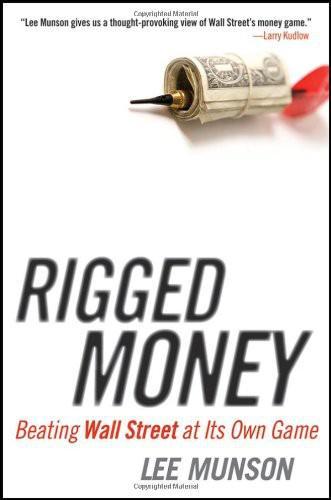
Rigged Money: Beating Wall Street at Its Own Game
by
Lee Munson
Published 6 Dec 2011
Does this mean that a person who makes money selling commission products is a horrible person? Not necessarily, but why take the chance if you don’t need to? Sure, there are some very specific reasons why you would need to generate a commission for an adviser. Some of the top reasons include the sale of insurance for estate planning purposes. While I don’t get involved in selling insurance directly, it is a normal part of high-end financial planning. In my experience, I see insurance products misused and improperly sold to unsuspecting investors. Insurance is a unique asset class since it is simply a contract with a corporation.
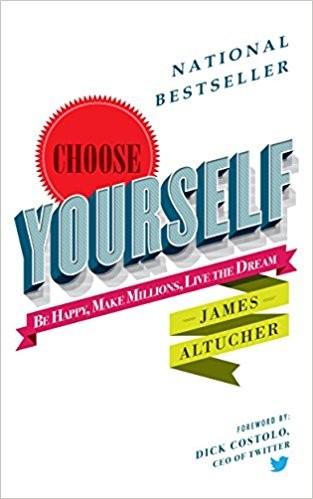
Choose Yourself!
by
James Altucher
Published 14 Sep 2013
How to best function in your particular career track so as to maximize your chances of rising up the ladder of success to the highest point possible given your skills and talents. How to best fit into the cog of the enormous productivity machine that America was becoming so you can aspire to take advantage of the many opportunities. How to protect your assets (estate planning) so that your kids and their kids have a decent chance at continuing any legacy you might leave. When is it good to go into debt? And once in debt, what is a good debt reduction plan? What’s the role of inflation and how do you protect yourself against it so that it doesn’t eat into savings?
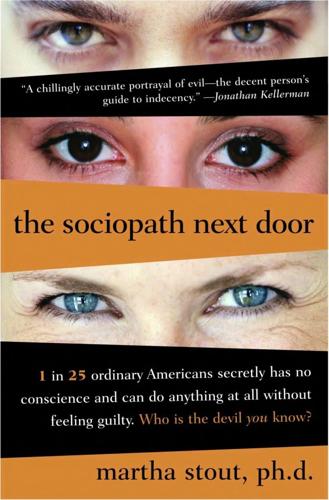
The Sociopath Next Door
by
Martha Stout
Published 8 Feb 2005
Chesterton This morning, Joe, a thirty-year-old attorney, is running five minutes late for an extremely important meeting that, with or without him, will start promptly at eight o'clock. He needs to keep up a good impression with the more senior members of his firm, which means just about everybody, and he would like to have the first word with these wealthy clients, whose concerns include Joe's budding specialty of estate planning. He has been preparing his agenda for days because he feels there is a lot at stake, and he very much wants to be in the conference room at the start of the meeting. Unfortunately, the furnace in Joe's town house suddenly stopped making heat in the middle of the night. Freezing and pacing, afraid the pipes would burst, he had to wait for the emergency repairman from the fuel company before he could leave for work this morning.
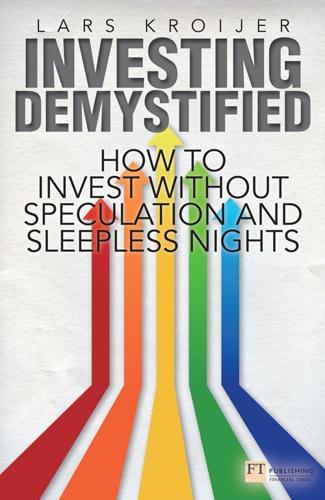
Investing Demystified: How to Invest Without Speculation and Sleepless Nights
by
Lars Kroijer
Published 5 Sep 2013
Particularly those without a great amount of savings to see them through their remaining years typically have a far lower risk tolerance as there are fewer options to make up a shortfall if markets turn against them. At the risk of over-simplifying, if you don’t share the upside of having more savings (with limited years left to enjoy them), but would experience the painful downside, then don’t take risk and stay with minimal risk bonds. Of course estate planning and passing on assets to the next generation will play a major role here in terms of the exact structuring of your portfolio. Also think about what non-investment income you can expect in the form of company pensions, social security, etc. and compare that to your expected outgoings. The difference between the two will need to come from investment income, or liquidating part of your portfolio.
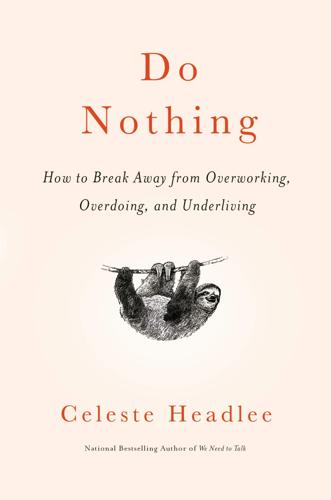
Do Nothing: How to Break Away From Overworking, Overdoing, and Underliving
by
Celeste Headlee
Published 10 Mar 2020
It’s hard to view the Industrial Revolution as anything other than an economic success, but it’s misguided to believe that work is anything other than a tool to achieve other goals. Emerson said that “beauty is its own excuse for being,” but that’s not true of labor. Labor needs a reason. A number of businesses have experimented with shorter hours and had incredible results. In 2018, a large estate planning company based in New Zealand decided to experiment with a shortened workweek. Employees put in only four days but were paid for five. At the end of the trial period, leadership scores rose by double digits, as did engagement. The number of people at the firm who said they were managing the work-life balance well increased by 26 percent, stress went down, and motivation went up.
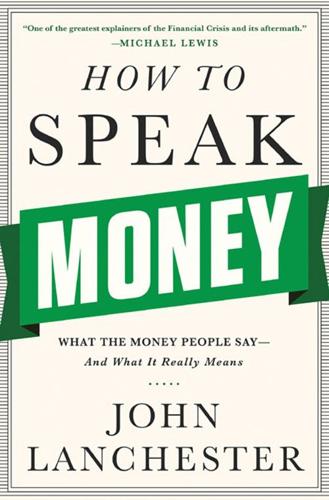
How to Speak Money: What the Money People Say--And What It Really Means
by
John Lanchester
Published 5 Oct 2014
There are forty items on it, and they are hilarious, though perhaps you shouldn’t show them to your left-wing aunt if she’s suffering from high blood pressure: Russian sable fur coats from Bloomingdale’s, shirts from Turnbull and Asser, Gucci loafers, handmade John Lobb shoes, a year at Groton boarding school, a yacht, a horse, a pool, a Learjet, a Roller, a case of Dom Perignon, forty-five minutes at a psychiatrist’s on the Upper East Side (!), an hour’s estate planning with a lawyer, and, amusingly/annoyingly, a year at Harvard.36 In 2012, the CLEWI went up 2.6 percent but the CPI went up only 1.4 percent. That means the gap is narrowing! Oh wait, no it doesn’t. The net worth of the 400 richest people in America went up by 11 percent, from $1.53 trillion to $1.7 trillion.

Learning to Think: A Memoir
by
Tracy King
Published 12 Mar 2025
In front of the community centre there was another low red-brick wall, where teenagers would congregate at night. Opposite the community centre were two phone boxes that were often vandalized or broken. These details seem mundane: a pub in the middle of a housing estate; the red-brick wall that attracted bored teens; the phone boxes. But remember them, because the banality of experimental estate planning soon becomes crucial to my life story. 3 WHILE MIKE SPENT A lot of time in the pub, Jackie – a teetotaller – rarely joined him. She was generally to be found at home, keeping an eye on us. There were no roads near by. The houses faced each other, encircling a grass-and-concrete area where children played, mothers sat and chatted, and later, when the first children of the estate grew older, teenagers hung out.
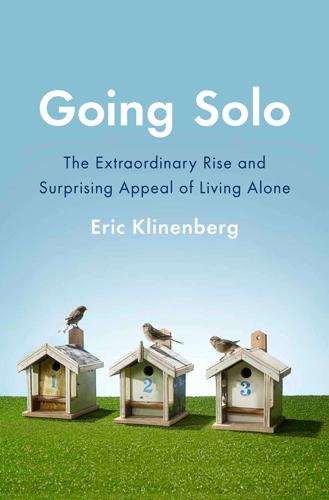
Going Solo: The Extraordinary Rise and Surprising Appeal of Living Alone
by
Eric Klinenberg
Published 1 Jan 2012
She started googling the topic, and within a few minutes she found that the AtMP Web site had answers for nearly all of her questions. “I also thought, ‘Wow! This is an incredible organization.’ It was the only place out there helping single people figure out the consequences of being unmarried. It’s not just access to health insurance. There are workplace discrimination issues, housing discrimination issues, estate planning issues, political issues, tax issues. And they had it all laid out for you. It was great.” As she scanned through the Web site, Grist noticed that the Alternatives to Marriage Project was looking for an executive director, and suddenly she started thinking that she might have found yet another excuse to leave her job.
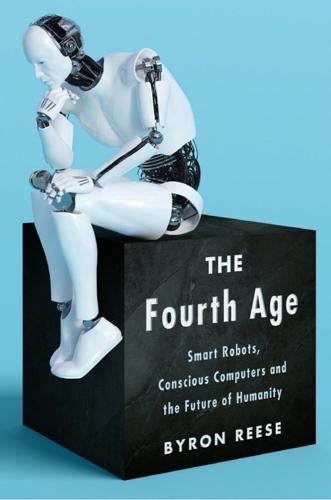
The Fourth Age: Smart Robots, Conscious Computers, and the Future of Humanity
by
Byron Reese
Published 23 Apr 2018
But a human’s abilities lie not just in making a cake, but in the ten thousand other things we can all do, like spot when our spouse is in a bad mood or brush our teeth or ride a bicycle. We are vast storehouses of ability, all of us. But because one person can do those ten thousand things and another person can do those ten thousand things—and knows about estate planning—we say one is low skilled and one is high skilled. But this is not the case, as they both have 99 percent or more of the same skills. There is little difference from the computer’s point of view between a doctor and a dockworker. Each requires great pattern recognition, a huge amount of social context, and inductive and deductive reasoning.
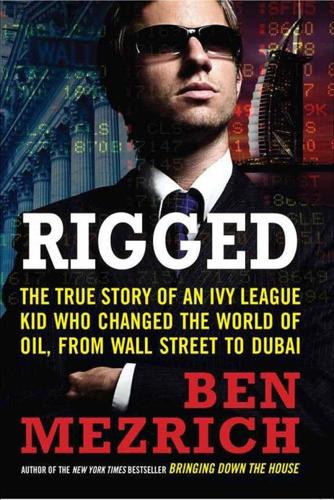
Rigged: The True Story of an Ivy League Kid Who Changed the World of Oil, From Wall Street to Dubai
by
Ben Mezrich
Published 11 Aug 2008
Maybe he’d be meeting with celebrities and professional athletes and rich CEOs, discussing their investments. But he’d been dead wrong. His boss had him visiting old-age homes, sitting down with ninety-year-olds talking about retirement funds. He was spending his evenings reading up on IRAs and estate planning, and his days trucking across town to places he could only describe as death’s waiting rooms. It was quite literally the worst job he could have imagined. The only bright light in his professional life was that robin’segg-blue card taped to the underside of his cubicle. Every morning at 6:00 a.m., a full hour before the other first-years arrived, he took the card out, stared at the name and number, and hurried to the library to make that first phone call.
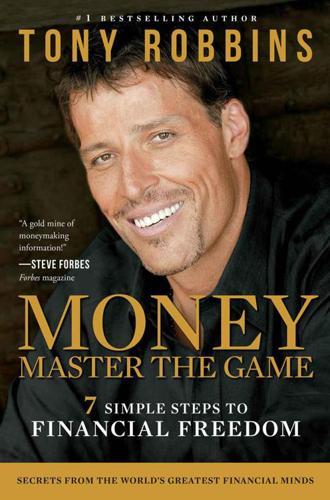
MONEY Master the Game: 7 Simple Steps to Financial Freedom
by
Tony Robbins
Published 18 Nov 2014
In addition, if you want assistance, you can always find an expensive attorney, but you can also use LegalZoom and set up one for as little as $250 with the help of its attorneys (www.legalzoom.com/living-trusts/living-trusts-overview.html). I’m including this reminder for you here because even though this book is not designed to be an estate-planning tool, one important responsibility we all have is to make sure that whatever wealth we build, however large or small it may be, our families benefit from it and don’t get stuck in a legal process that drains the gift from our heirs. As you begin to succeed, please seek out quality assistance when thinking about estate planning, but in the meantime, don’t wait to set up a living trust. Everyone needs one. * * * 22. In order to qualify for private placement life insurance, you must be an accredited investor.
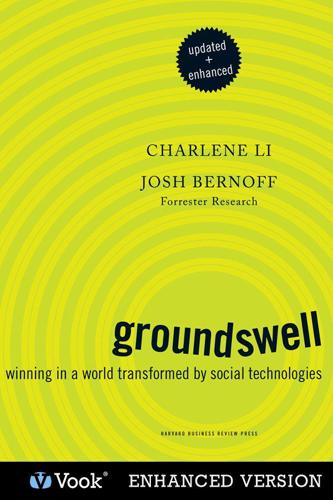
Groundswell: Winning in a World Transformed by Social Technologies
by
Charlene Li
and
Josh Bernoff
Published 23 May 2011
Unless you and your whole management team can answer with an unequivocal yes, then you might not be ready to energize the groundswell. 2. check the social technographics profile of your customers You need research to determine how actively and in what numbers your customers are participating in the groundswell. If you’re selling smart phones or baseball mitts—anything that skews young and technologically savvy—then your customers are already heavily into the groundswell, and you can expect them to take naturally to a collection of community and social features. If you’re selling mattresses or estate planning, then rein in your expectations accordingly—it’s no use starting a community if your best customers have the wrong profile and won’t be participating. 3. ask yourself, “what is my customer’s problem?” Remember, except in rare cases like Lego’s, communities don’t form around your products.
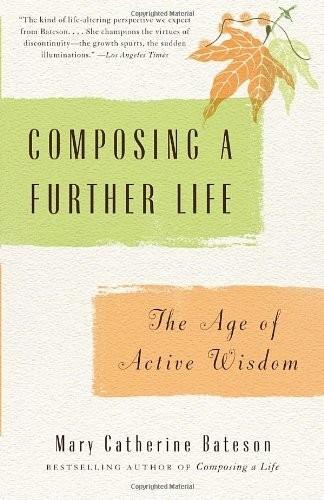
Composing a Further Life: The Age of Active Wisdom
by
Mary Catherine Bateson
Published 13 Sep 2010
Not the marriages of our daughter’s friends or the children of our contemporaries—those peaked out several years ago, although there are more to come, most of them after two or three years of living together. No, the marriages we are seeing today are marriages of people in their sixties and seventies, often after decades with the same partner but often, too, with someone new. Sometimes there are strong legal arguments for the decision, as estate planning becomes an issue, but what begins as a practicality often becomes an emotional turning point, and the word forever still retains its ancient force, both terrifying and reassuring, in the face of the need to make a new commitment or reaffirm an old one. After all, most of us have lived lives based on commitments made without any way of knowing where they would lead.
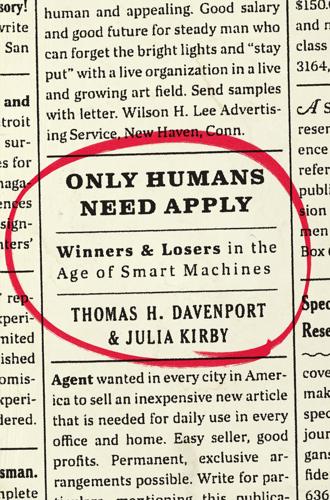
Only Humans Need Apply: Winners and Losers in the Age of Smart Machines
by
Thomas H. Davenport
and
Julia Kirby
Published 23 May 2016
Grant Easterbrook, who covered financial technology firms as an industry analyst (he’s now moved to a financial technology startup) told us that, while creating an investment portfolio is relatively easy to automate, it still requires a human touch to provide complex financial planning for individuals with substantial assets. Such broad planning includes tax planning, estate planning, life insurance, and other decisions that not only require nuanced information gathering but are also interrelated. Human advisors can “motivate the client to gather all of that information,” says Easterbrook, and correct for the fact that clients “are often overly optimistic about their finances and undisciplined about following up.”
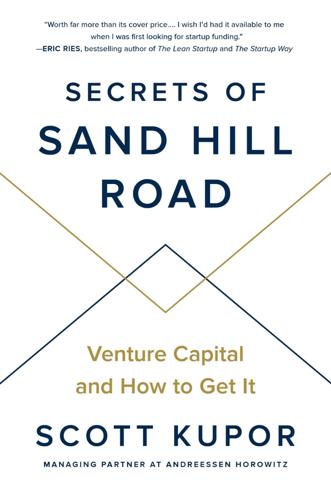
Secrets of Sand Hill Road: Venture Capital and How to Get It
by
Scott Kupor
Published 3 Jun 2019
The Right of First Refusal and Co-Sale Agreement will also contain a right of co-sale providing that before any such holder of Common Stock may sell any of his shares, he will first give the Investor an opportunity to participate in such sale on a basis proportionate to the amount of securities held by the seller and those held by the Investor. Such agreement shall contain exceptions for transfers to affiliates and transfers for estate planning purposes, but shall not include exceptions for any other transfers or pledges of stock. In addition, no stockholder shall be a party to any Stock Sale unless all holders of Preferred Stock are allowed to participate in such Stock Sale and the consideration received pursuant to such Stock Sale is allocated among the parties thereto as if such Stock Sale were a deemed liquidation event.
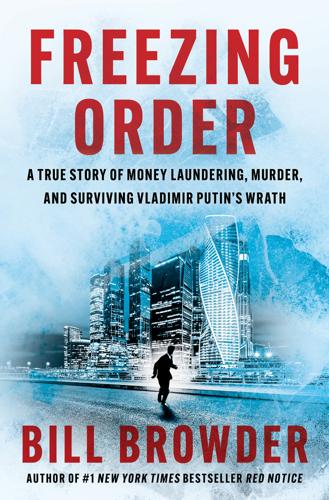
Freezing Order: A True Story of Money Laundering, Murder, and Surviving Vladimir Putin's Wrath
by
Bill Browder
Published 11 Apr 2022
Sometimes they do it for anonymity or personal safety reasons, sometimes to make it easier to invest in multiple countries, but sometimes, offshore companies are created for more nefarious purposes. The leak even revealed that I owned a few offshore companies that had been set up by Mossack Fonseca. Unlike some of the other companies in the leak, however, mine had been set up for legitimate estate-planning purposes, and were fully disclosed to Western tax and regulatory authorities. Journalists weren’t interested in these kinds of companies, they were interested in the secret ones belonging to government officials and politicians enriching themselves through corruption. The articles that came out on April 3 were divided by country, and each country had a star.
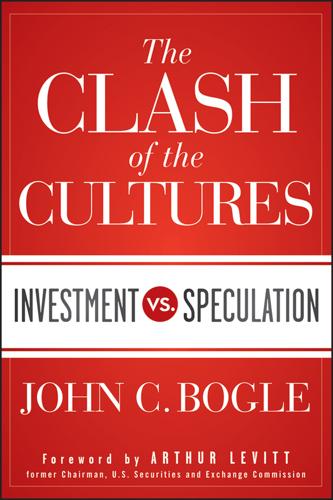
The Clash of the Cultures
by
John C. Bogle
Published 30 Jun 2012
We focus on past performance, knowing that, if it is not negatively correlated with future returns, the linkage is anything but causal. To earn their keep, advisers should focus their clients not on “picking winners” but on factors such as sound asset allocation, broad diversification, low cost, tax-efficiency, simplicity, and even estate planning. But when investors have already paid sales commissions to own the funds involved in the scandals—especially if they have done so recently—they should consider reinvesting in funds that don’t carry commissions. They’ve already bought the ticket for their investment voyage, and they shouldn’t have to buy it again.
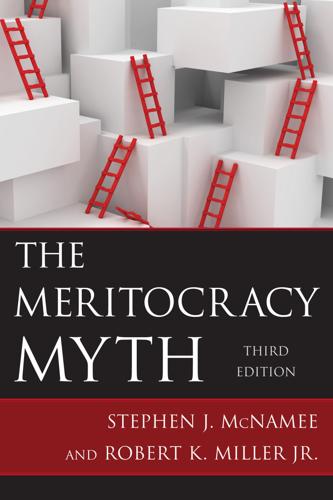
The Meritocracy Myth
by
Stephen J. McNamee
Published 17 Jul 2013
That means that only individuals receiving inheritances of more than $5.12 million and for couples $10 million (easily less than 1 percent of all estates) will be subject to an inheritance tax over that amount at a rate of 40 percent. Assets left to a surviving spouse or charitable organizations are not generally subject to estate taxation. In addition, estate taxation can be avoided or drastically reduced through inter vivos giving and careful estate planning. States can also level estate taxes independent of federal estate tax, but only about 20 percent of all states have any estate tax, often with complicated provisions for exemptions and exclusions. In short, existing estate taxes are currently not large enough and do not affect enough of the total amount of wealth transferred intergenerationally to make much difference in reducing the nonmerit effects of inheritance on who gets what and how much.

Lonely Planet Jamaica
by
Lonely Planet
Those offered by Jamaica Cultural Enterprises in Kingston and Falmouth Heritage Walks in Falmouth are particularly recommended. Stush in the Bush near Ochi Rios offers tours of their farm followed by sumptuous meals. Don't forget coffee tasting in the Blue Mountains, and the tours offered by the Appleton Rum Estate. Plan Your Trip Outdoor Activities Jamaica might be in the Caribbean, but it offers a lot more than just sunbathing on a beach, from mountain biking and rafting to horseback riding and birdwatching. Get a natural high hiking in the mountains, or dive below the waves to explore shipwrecks and coral.
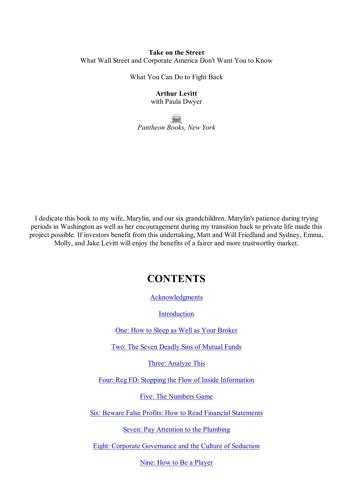
file:///C:/Documents%20and%...
by
vpavan
Most investment advisers charge fees, which can be an hourly rate, an annual figure, a percentage of your assets, or a fee-plus-commissions. I recommend you find a certified financial planner (CFP)— someone who takes a holistic approach to your finances— if you want your adviser to consider your retirement, insurance, tax, and estate-planning needs. You can obtain a list of CFPs near you through the Financial Planning Association (www.fpanet.org/plannersearch). Members must pass a proficiency test and keep up with continuing education requirements. Financial planners who are members of the National Association of Personal Financial Advisors (www.napfa.org) also must pass an exam, but in addition they submit their work to peer review and are not supposed to charge anything but a fee.
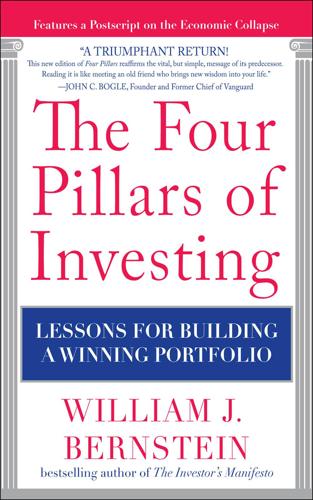
The Four Pillars of Investing: Lessons for Building a Winning Portfolio
by
William J. Bernstein
Published 26 Apr 2002
Because the attorney “must” drive a nicer car, live in a nicer part of town, buy more expensive clothes, and take more exotic vacations than the plumber. The message is obvious. The easiest way to get rich is to spend as little as possible. Other Goals This book is not intended as a financial planning guide; topics such as mortgages, debt management, insurance, and estate planning are well beyond its brief. But there are a few financial planning topics pertaining to basic portfolio mechanics and financial theory that are worth mentioning: Emergencies. This falls under the mantra of the financial planner: “five years, five years, five years.” That is, you should not put any money at risk that will be needed within five years.
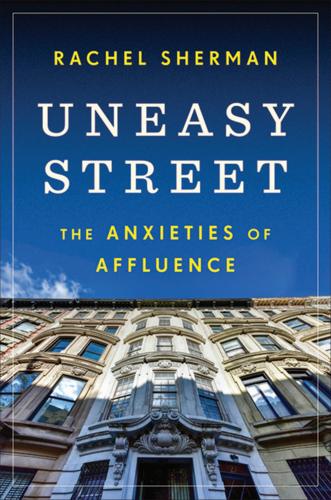
Uneasy Street: The Anxieties of Affluence
by
Rachel Sherman
Published 21 Aug 2017
Even progressives, who advocated higher taxes for the wealthy in general, took advantage of rules permitting untaxed annual gifts under a certain amount from older generations to younger ones as a way to minimize estate taxes when the older relatives die. Similarly, grandparents often paid for the private schools of their grandchildren (this was common in the families of those I interviewed) as a way of passing on wealth without paying taxes. Sara, who otherwise believed in paying taxes, called this practice “just good estate planning.” GIVING BACK OR GIVING UP? Most of the people I talked with resembled wealthy people who have been studied by other researchers, for whom giving back does not challenge structural inequalities in any way. These are people who mostly have faith in the system, as Frances asserts in the opening quote (“I do believe in a market economy”).
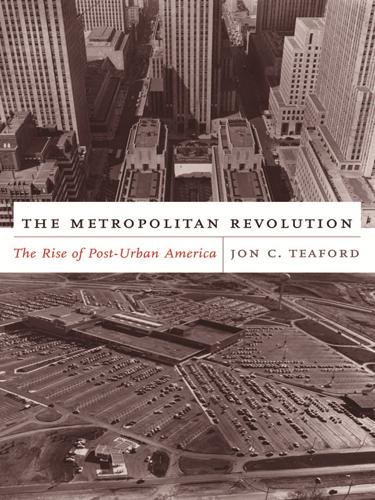
The Metropolitan Revolution: The Rise of Post-Urban America
by
Jon C. Teaford
Published 1 Jan 2006
Breckenfeld, “Jim Rouse Shows How to Give Downtown Retailing New Life,” p. 91. 51. Gurney Breckenfeld, “The Rouse Show Goes National,” Fortune, 27 July 1981, pp. 50–51. 52. John T. Metzger, “The Failed Promise of a Festival Marketplace: South Street Seaport in Lower Manhattan,” Planning Perspectives 16 (2001): 25–46. 53. William Fulton, “The Robin Hood of Real Estate,” Planning, May 1985, p. 7. 54. New York Times, 11 June 1989, sec. 1, p. 26; 16 June 1989, p. A3. 55. Bernard J. Frieden and Lynne B. Sagalyn, Downtown, Inc.: How America Rebuilds Cities (Cambridge, Mass.: MIT Press, 1989), 179–80. 56. Nicole Achs, “Putting the Fun(ds) Back in Downtown,” American City and County, June 1991, p. 75; “Jim Rouse May Be Losing His Touch,” Business Week, 4 April 1988, p. 33. 57.
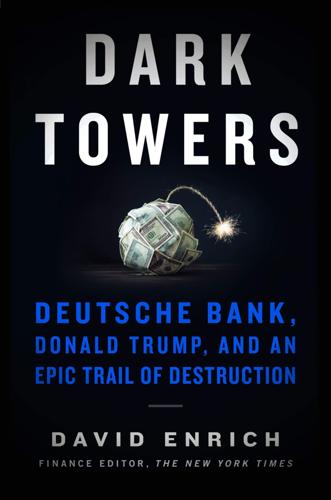
Dark Towers: Deutsche Bank, Donald Trump, and an Epic Trail of Destruction
by
David Enrich
Published 18 Feb 2020
Late that summer, Bill and Alla invited Scott up to their place in Maine. They spent the day drinking and reminiscing, the old family bond now restored. Broeksmit joked about how he had dodged a bullet by not getting the chief risk officer gig. He said he was contemplating a third and final retirement. He asked about estate planning. He kept saying how much he still missed Edson. Scott was a keen student of the banking industry, especially when it came to the institution that his father had helped build. He asked Bill what would have happened with Deutsche if Edson hadn’t died. Would it be in better or in worse shape today?
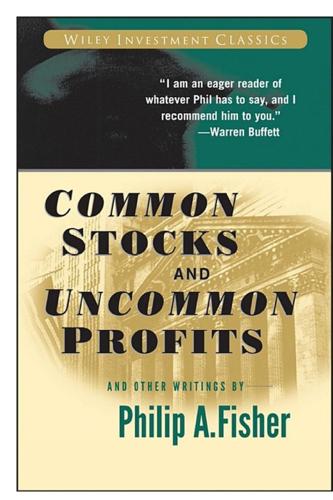
Common Stocks and Uncommon Profits and Other Writings
by
Philip A. Fisher
Published 13 Apr 2015
Heller was a successful stock market investor, an overall businessman, and a venture capitalist and may have been the man Father admired most until the early 1950's. Heller died soon thereafter. Frank Sloss shared a room with Father at Stanford, and they remained close ever after and, hereto, Frank married a cousin and Father and Frank remained close until Frank died in the 1980's. Frank was what today we call an estate planning attorney in San Francisco and did most of Father's non-securities legal work until Frank died; and in that way they spoke often. But they saw little of each other otherwise. Louis Lengfeld was himself a distant relative and a client of father for many years, and they often commuted together into San Francisco.
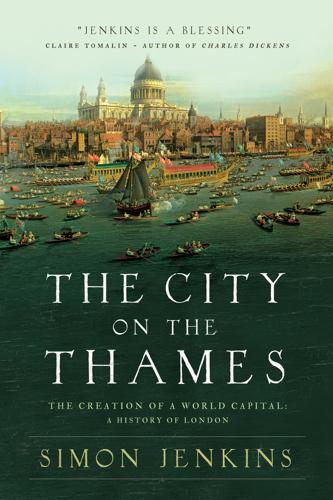
The City on the Thames
by
Simon Jenkins
Published 31 Aug 2020
Whitehall Palace c.1680, with Charles II and Prince Rupert by Danckerts; Banqueting Hall and Holbein Gate behind. 23. Covent Garden, St Paul’s church and piazza. Begun by Inigo Jones in 1631 as London’s first residential square. 24. St James’s Square, London’s most aristocratic speculation, by Henry Jermyn in 1662. 25. Hanover Square, Whig estate planned to welcome George I in 1714, with church named St George’s in his honour. 26. Seven Dials, Covent Garden, a rare Georgian hub-and-star layout by developer Thomas Neale, never to achieve its intended fashionability. 27. The Thames as Grand Canal. St Paul’s on Lord Mayor’s Day by Canaletto in improbably clear light, c.1747. 28.
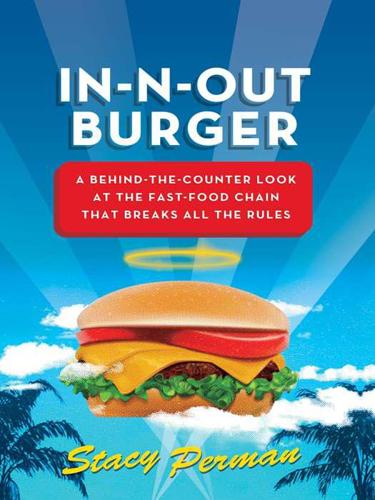
In-N-Out Burger
by
Stacy Perman
Published 11 May 2009
Rich and Christina did not have any children of their own, and Rich had not adopted his wife’s daughter, Siobhan. Among the many tragedies and pieces of unfinished business that resulted from the crash was the fact that Phil West was onboard the Westwind that day; that was the crucial event that turned control of the company over to Guy. The matrix of trusts and estate planning instruments created to protect In-N-Out and ensure its succession through Rich unraveled. West was named as the successor trustee of the Esther L. Snyder Trust after Rich, as well as a cotrustee of Rich’s own trust. Had he not died on the plane, West would have administered the majority of the company shares that comprised the core of that trust, set to roll over in three years.
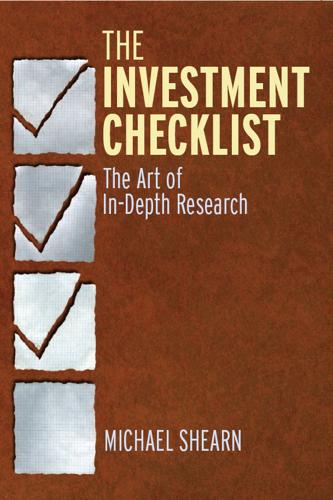
The Investment Checklist: The Art of In-Depth Research
by
Michael Shearn
Published 8 Nov 2011
They do not take shareholder interests into consideration and will often siphon off profits to themselves through egregiously large compensation packages. You can usually identify these types of managers by viewing the Related-Party-Transaction section found in the company’s proxy statement, where you might find such items as personal use of company aircraft, estate planning, personal or home security, and real estate that is owned by the CEO and then leased to the business. For example, in one business, the company’s founder received a loan from the business that bore an interest rate of 1 percent over prime to buy a personal aircraft. Another CEO was reimbursed more than $2.6 million a year for security expenses.
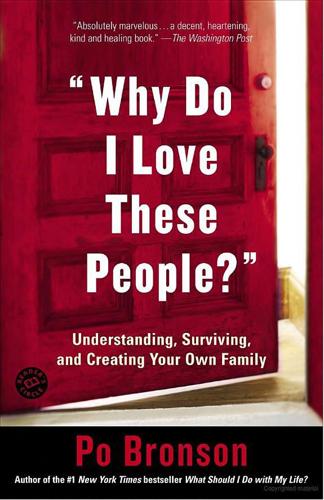
Why Do I Love These People?: Understanding, Surviving, and Creating Your Own Family
by
Po Bronson
Published 26 Dec 2006
The surprise success of Matsui Nursery has made Andy reconsider what he ought to do with it. Should he leave it to his children after all? But what do they know about farming? He discussed the possibility with Teresa, but he quickly realized that bringing someone without experience into the business would doom it. When he began to look into estate planning, he discovered that dying is more trouble than living. He didn't want to burden his children with the mess of selling off parts of the business to pay the taxes. “Whom do I really owe?” he wondered. “To whom am I indebted?” The answer was in his heart. He loved his company and the 160 people who worked for him, most of whom were Mexican immigrants in the very situation he was in forty years ago.

Factory Girls: From Village to City in a Changing China
by
Leslie T. Chang
Published 6 Oct 2008
Both women were single, and they appeared to be working at the company in part to advance their marriage prospects. The managing director planned to set up matchmaking offices around the city using a franchise model. But from his business card I learned that he was also hedging his bets. COMPREHENSIVE PLANNING TOURISM BUSINESS REAL ESTATE PLANNING TUTORS AND HOUSEKEEPERS LICENSE APPLICATION AGENCY CREATIVE DESIGN ARTS TRAINING MARKETING AGENCY PROPERTY AGENCY ANNUAL ASSET INSPECTIONS CIS INPUT RITES AND CEREMONIES HEADHUNTING LEGAL CONSULTING FINANCIAL ACCOUNTS MANAGEMENT CONSULTING WEDDING PLANNING JOBS CENTER CIVIL INVESTIGATIONS TAX AUDITING As we were talking, a middle-aged woman walked in off the street to inquire about the club’s services.
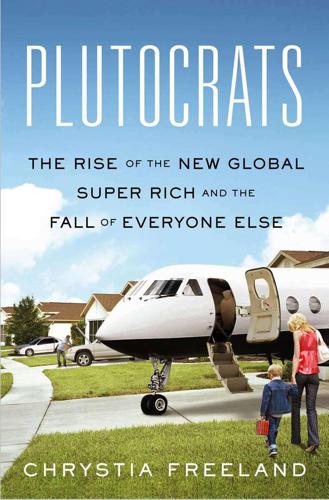
Plutocrats: The Rise of the New Global Super-Rich and the Fall of Everyone Else
by
Chrystia Freeland
Published 11 Oct 2012
There, they pass their days in secluded splendor, while the rest of the world, bereft of their genius and hard work, collapses. That was, of course, a fiction, and one with as much bodice ripping as economics. But versions of Galt’s Gulch are starting to show up in more sober venues. James Duggan, a founding principal of a Chicago firm of tax and estate planning lawyers, believes “wealth is fleeing the country.” Some of the self-exiled rich are, Mr. Duggan argues, “conscientious objectors”: “There are those who are simply going offshore to make a statement. Their level of discontent with the current circumstances in our country, coupled with attacks on the wealthy, has created a distinct sense of rebellion among many wealthy citizens.
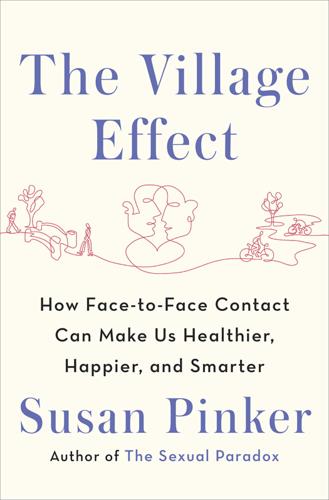
The Village Effect: How Face-To-Face Contact Can Make Us Healthier, Happier, and Smarter
by
Susan Pinker
Published 30 Sep 2013
Until he approached them at the funeral, Ginny and the rest of the family hadn’t seen much of him for ten years. Reminding the siblings that he was an estate planner, Jones told them, “If I can help you in any way, I’m here for you.” He reassured Ginny’s mother, Wendy, “Don’t worry. I’ll take care of you.” Five days after the funeral, Jones persuaded Wendy Nelles to move her husband’s estate planning from the bank to Jones’s own account. “He told her ScotiaBank wasn’t doing much with the money and that the laws had changed. He was a vulture. He swooped in,” Ginny said ruefully. Four years after that, Jones persuaded Wendy to remortgage her paid-off home for $327,000—to be paid off over forty years.
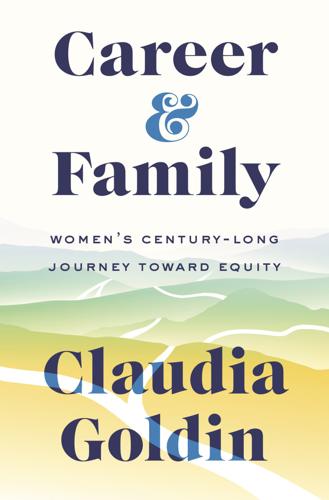
Career and Family: Women’s Century-Long Journey Toward Equity
by
Claudia Goldin
Published 11 Oct 2021
* * * Let’s recast Della and Perry from their 1950s roles of secretary and attorney to more modern ones: an ambitious young couple from Group Five who met and fell in love on the law review of their top-ranked law school. Sometime after graduation, with JDs in hand, they both headed into practice. Freshly minted law school graduates have a host of employment options. They can work in large corporate law firms or small practices that specialize in family law and estate planning. They can work as corporate counsel, in government and nonprofits, or they can teach in law schools. They can run for political office or work elsewhere outside the legal sector. Each of the options affords a range of amenities with different levels of compensation. FIGURE 9.1. Percentage Distribution of Hours of Work for Female and Male JDs: Five and Fifteen Years after Law School Graduation See Figures and Table Appendix.
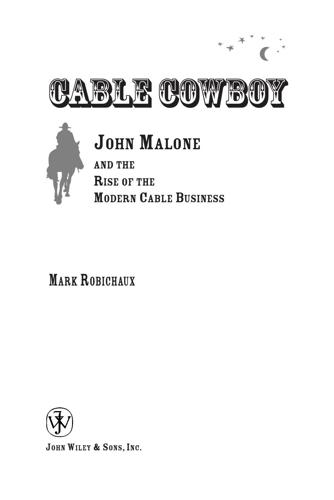
Cable Cowboy
by
Mark Robichaux
Published 19 Oct 2002
Shockingly, the biggest heir to the estate of Bob Magness, a man who so thoroughly 195 9486_Robichaux_03.f.qxd 8/28/02 9:54 AM Page 196 196 C A B L E C O W B OY detested paying taxes during his life, was the IRS. Magness made surprisingly little use of charitable trusts or other tax-sheltered means to transfer wealth to heirs, and for weeks following his death, newspapers pointed to his estate as a classic example of poor estate planning. Typically, wealthy individuals with Magness’s kind of background took pains to structure their estates so their heirs wouldn’t be bled by the IRS. It was as if one of the wealthiest men in the country had stashed his fortune in a sock drawer. Magness’s will placed even more pressure on Malone to fix TCI.
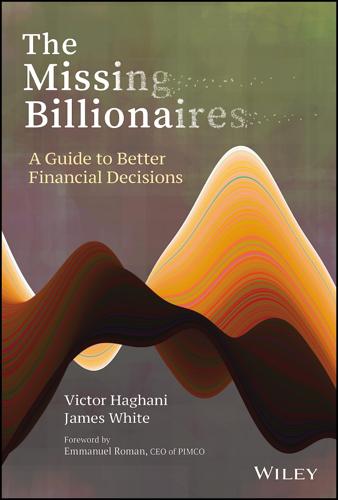
The Missing Billionaires: A Guide to Better Financial Decisions
by
Victor Haghani
and
James White
Published 27 Aug 2023
The Expected Utility framework is flexible enough to take into account many real‐world tax‐planning decisions and circumstances such as the following: Multiple horizons over which investors expect to liquidate assets to fund spending Assets with different cost bases Situations involving short‐term and long‐term capital gains Funding and conversion between different forms of tax‐advantaged IRA and 401k accounts 1031 exchanges Exchange funds Other estate planning structures, such as installment sales, Grantor Retained Asset Trusts (GRATs), and Charitable Lead Trusts (CLTs) Private Placement Life Insurance (PPLI) The ability to get a market value deduction, and avoid realizing a taxable capital gain, from the donation of appreciated assets to recognized charities Correlations between tax rates, asset prices, inflation, and interest rates Connecting the Dots In the idealized world of Finance 101, with only a risk‐free and a risky asset to choose from, no taxation, no transactions costs, and asset prices that follow random walks, your optimal allocation to the risky asset is a function of just three variables: the risky asset's excess expected return, its risk, and your level of risk‐aversion.
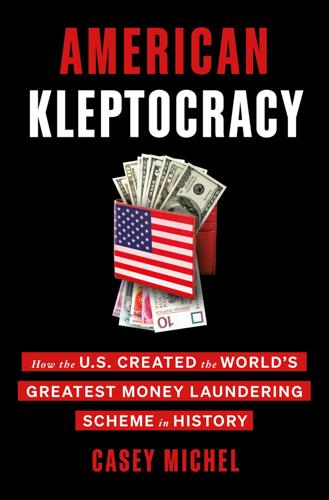
American Kleptocracy: How the U.S. Created the World's Greatest Money Laundering Scheme in History
by
Casey Michel
Published 23 Nov 2021
Kara Scannell and Vanessa Houlder, “US Tax Havens: The New Switzerland,” Financial Times, 8 May 2016, https://www.ft.com/content/cc46c644-12dd-11e6-839f-2922947098f0. 47. Paul Sullivan, “The Ins and Outs of Trusts That Last Forever,” New York Times, 5 December 2014, https://www.nytimes.com/2014/12/06/your-money/estate-planning/the-ins-and-outs-of-perpetual-trusts.html. 48. One academic—who described “perpetual trusts” as “loony”—crunched the numbers on these new trusts, finding that “350 years after the settlor’s death, a perpetual trust could have, on average, 114,688 living beneficiaries (16,384 great-great-great-great-great-great-great-great-great-great-great-great-grandchildren, 32,768 great-great-great- great-great-great-great-great-great-great-great-great-great-grandchildren, and 65,536 great-great-great-great-great-great-great-great-great-great-great-great-great-great-grandchildren).
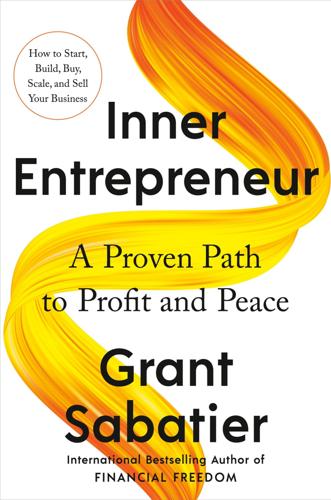
Inner Entrepreneur: A Proven Path to Profit and Peace
by
Grant Sabatier
Published 10 Mar 2025
Sure, we’ll probably all be forgotten in a few hundred years, but the energy we put into the world and each decision we make ripples into eternity. I didn’t think about legacy in my twenties and thirties, but now I have a daughter, multiple properties, books I’ve written, more money than I expected to have, and growing businesses. I just recently put together an estate plan and learned a lot in the process. I’m still learning. As I sit here in my thirty-ninth year, I’m like 100 years old in internet years. I play a young person’s game. I got my first computer, a secondhand laptop when I was seven, and I’ve spent most of my life online. While I’m grateful that I’ve been able to use the internet to make most of my money, I’m excited to do more offline.
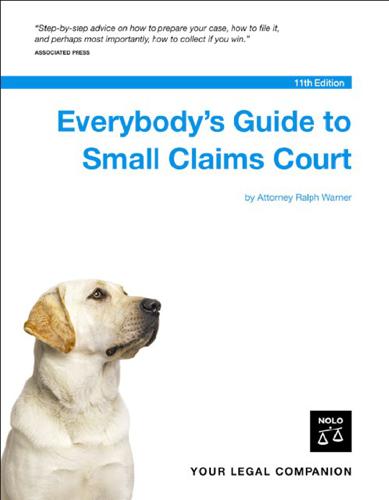
Everybody's Guide to Small Claims Court
by
Ralph E. Warner
Published 2 Jan 1978
Suits against the federal government normally must be filed in federal district court. I. How to Sue the Estates of Deceased People Death does not prevent lawsuits from being brought and judgments from being collected against the deceased’s estate. However, it does present a number of technical legal hurdles. Assuming the defendant made a will (or died without a will or other estate planning device such as a living trust), a probate proceeding will be held. All claims against the estate should be made promptly, in writing, to the personal representative of the deceased person’s estate and directly 130 everybody’s guide to small claims court to the probate court. If the personal representative knows about the debt owed to you, you should receive a formal notice to file your claim—but this won’t happen if your debt isn’t known.
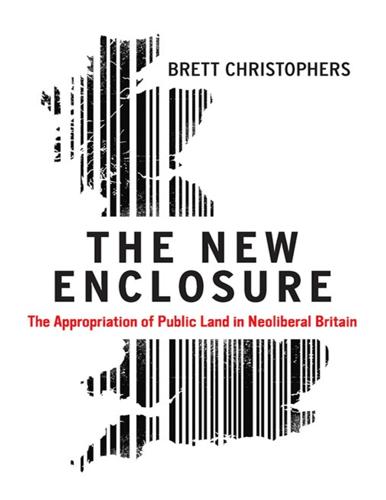
The New Enclosure: The Appropriation of Public Land in Neoliberal Britain
by
Brett Christophers
Published 6 Nov 2018
Naylor explicitly bemoaned in his report not only the NHS’s own such reliance in estate matters, but also the long-term evisceration of internal NHS property-related expertise that had brought about this reliance, and what he saw as the attendant planning ‘deficiencies’: Those with long memories will recollect that the various estate functions, particularly building and engineering, were well represented at the senior levels of regional, area and district health authorities during much of the history of the NHS. Successive reorganisations of the NHS have seriously eroded these capabilities to the extent that they hardly exist today. This has resulted in substantial reliance on external advice and serious deficiencies in strategic estate planning.3 As well as advising central government and other public bodies on land disposal, private-sector actors have, often at Whitehall’s behest, also become increasingly involved in the direct planning and handling of disposal, thus expanding the sphere of their influence. In 2014, for example, when the Metropolitan Police in London set about trimming its 671-property estate by in the region of 30 per cent (by area), with more than 100 separate properties to be sold in a bonanza expected to raise over £300 million, marketing was only one of the many functions relinquished to the private sector.
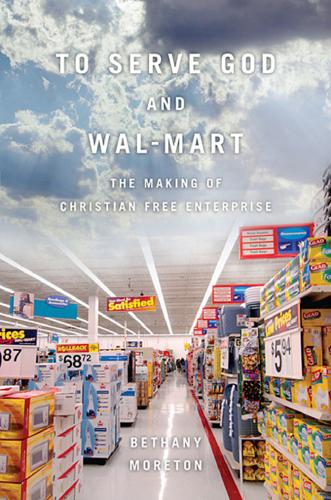
To Serve God and Wal-Mart: The Making of Christian Free Enterprise
by
Bethany Moreton
Published 15 May 2009
Benson’s new cause quickly came to the attention of Clinton Davidson, a co-Â�religionist from Kentucky who made a fortune selling life Â�insurance to wealthy New Yorkers. Inspired by his reading of the Bible as a fiÂ�nanÂ�cial manual, Davidson went on to plan the ultimate disposition of estates totaling over 3 billion dollars. Through his connections to Davidson’s Estate Planning Corporation, Benson began “selling” Harding to men like Lammot du Pont and Alfred Sloan as a good buy for their potential donations.92 As a way of cultivating business support, he started inviting executives to campus as speakers. In 1941, lobbyist friends of Davidson’s arranged for George Benson to testify before the House Ways and Means Committee, then weighing proposed tax increases as defense expenses loomed.
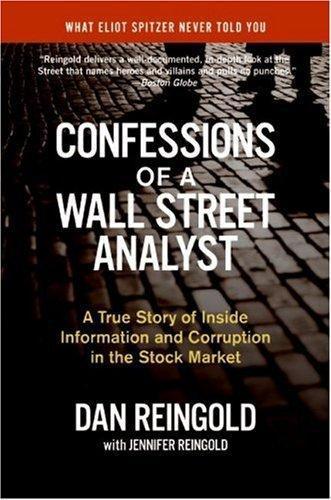
Confessions of a Wall Street Analyst: A True Story of Inside Information and Corruption in the Stock Market
by
Daniel Reingold
and
Jennifer Reingold
Published 1 Jan 2006
Nick was a young, very smart MBA from Wharton who a year earlier had replaced Abby Johnson as Fidelity’s telecom specialist. Abby, the daughter of Fidelity’s founder, Ned Johnson, became president of Fidelity Management & Research Co. in 2001 and is now worth roughly $12 billion, thanks to her dad’s astute estate planning. Not bad for a former telecom analyst. In the spring of 1997, I went to visit Thakore during one of my Boston marketing trips and found myself being ripped a new one by this 20-something man-child. Mark Kastan remained the lead analyst on WorldCom, rating it Neutral. I agreed with Mark’s caution about WorldCom.
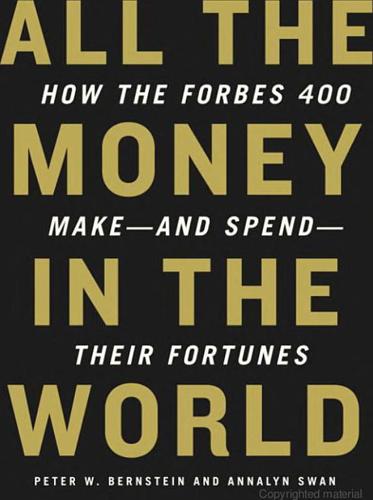
All the Money in the World
by
Peter W. Bernstein
Published 17 Dec 2008
Coat: Natural Russian sable, Maximilian at Bloomingdale’s $190,000 Silk dress: Bill Blass Ltd., classic $1,875 Loafers: Gucci $410 Shirts: 1 dozen cotton, bespoke, Turnbull & Asser, London $3,600 Shoes: Men’s black calf wing tip, custom-made, John Lobb, London $4,128 School: Preparatory, Groton, 1-year tuition, room, board $39,850 University: Harvard, 1-year tuition, room, board, insurance $43,655 Catered dinner: For 40, Ridgewell’s, Bethesda, MD $7,469 Opera: 2 tickets, 8 performances, Metropolitan Opera, Saturday night, parterre box $5,440 Caviar: Tsar imperial beluga, 1 kilo, Petrossian, Los Angeles, CA $7,600 Champagne: Dom Perignon, case, Sherry-Lehmann, NY $1,559 Filet mignon: 7 pounds, Lobel’s, NY $231 Dinner at La Tour d’Argent: Paris, estimated per person (including wine and tip) $402 Piano: Steinway & Sons, concert grand, Model D, ebonized $103,400 Flowers in season: Arrangements for 6 rooms, changed weekly, Christatos & Koster, NY, per month $8,175 Sheets: Set of linen lace Figna, Pratesi, queen-size $3,940 Silverware: Lenox, Williamsburg Shell pattern, 4-piece place setting for 12 $5,424 Hotel: 2-bedroom suite, Four Seasons, NY $3,450 Face-lift: American Academy of Facial Plastic & Reconstructive Surgery $14,500 Hospital: VIP, Washington Hospital Center, Washington, D.C., 1 day, concierge, security, gourmet meals $1,315 Psychiatrist: Upper East Side, NY, 45 minutes, standard fee $300 Lawyer: Established NY firm, Schlesinger, Gannon & Lazettra, average hourly fee for estate planning by partner $750 Spa: The Golden Door, California, basic weekly unit $7,500 Perfume: 1 oz. Joy, by Jean Patou $400 Sauna: Finnleo Sauna and Steam, 8-by-10-by-7 feet, 8-person, Nordic Spruce/Abachi $14,580 Motor yacht: Hatteras 80 (with 1550-HP CAT C-30s) $4,870,000 Sailing yacht: Nautor’s Swan 70 $4,070,661 Shotguns: Pair of James Purdey & Sons (12 gauge Side-by-Side), Griffin & Howe, Bernardsville, NJ, & Greenwich, CT $185,655 Thoroughbred: Yearling, average price, Fasig-Tipton Saratoga summer select sale $323,731 Swimming pool: Olympic (50 meters) Mission Pools, Escondido, CA $1,312,500 Tennis court: Clay, Putnam Tennis and Recreation, Harwinton, CT $55,000 Train set: Christmas Passenger starter set, LGB, at Miller’s Toys, NY $400 Airplane: Learjet 40XR, standard equipment, certified, 7 passengers $8,750,000 Helicopter: Sikorsky S-76C++, VIP options $11,000,000 Automobile: Rolls-Royce Phantom $333,350 Telephone call (without calling plan): 10 minutes, AT&T, NY–London $30 Cigars: Aniversario No. 1, Dominican Republic, 25 cigars, Davidoff, NY $708 Magazine: Forbes, 1-year subscription $60 Duffel bag: Louis Vuitton, Keepall Bandouliere, 55 centimeters $1,060 Watch: Patek Philippe classic men’s gold, leather strap (Ref#3520 yellow gold on leather strap) $17,600 Purse: Hermès, Kelly Bag, calfskin, rigid, 28 centimeters $6,250 * * * In Veblen’s day12, when the Vanderbilt family was at the pinnacle of New York society, perhaps the most visible sign of wealth and power was the handful of enormous mansions built by the family along New York’s prestigious Fifth Avenue, as well as a half dozen spectacular holiday homes in the countryside, plus a private railroad car for travel.
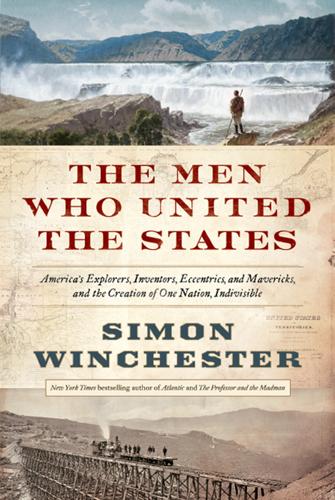
The Men Who United the States: America's Explorers, Inventors, Eccentrics and Mavericks, and the Creation of One Nation, Indivisible
by
Simon Winchester
Published 14 Oct 2013
“The destiny of the American people is to subdue the continent,” he declared—and anyone and anything who stood in the way, be they Sioux or be they buffalo, could be swept aside. He was a firm believer in the climatologically nonsensical theory that “rains follow the plow.”* And with this as his principal sales pitch, he peddled huge acreages of Western real estate—planning cities like Gilpintown and Centropolis, which in fact never got built—and made millions out of the gullible and the hopeful. He died in Denver, a very rich man. Then there was a sometime imposter and mountebank named Samuel Adams, who almost managed to wheedle $20,000 from the US Congress as compensation for the hazards of an expedition he supposedly took along the Colorado, from which he sent back reports filled with blatant absurdities.
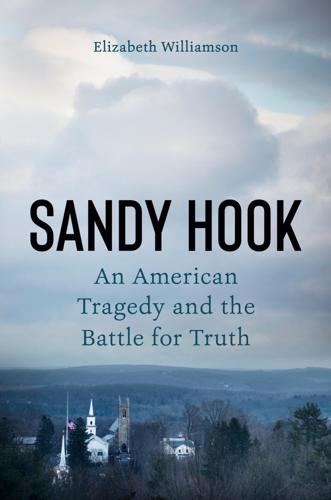
Sandy Hook: An American Tragedy and the Battle for Truth
by
Elizabeth Williamson
Published 8 Mar 2022
He placed full vats in the rear of the church and outside along Church Hill Road, but they sat untouched. “And that was just St. Rose,” he said. Every church, school, and service organization received a flood of items, he said, shrugging and raising his arms, as if snowed under. Unvetted businesses jammed switchboards with offers of public relations advice, pet therapy, estate planning, and “free facials/nails/makeup/waxing for lifetime for mothers of children who were killed.” In the two weeks following the shooting, people from miles around deposited sixty-eight thousand plush toys in Newtown, plus hundreds more in surrounding villages. The toys rolled into muddy streets, clogged intersections, and lay in mounds at the foot of the flagpole on Main Street, sodden, painful reminders of babies in warm beds.
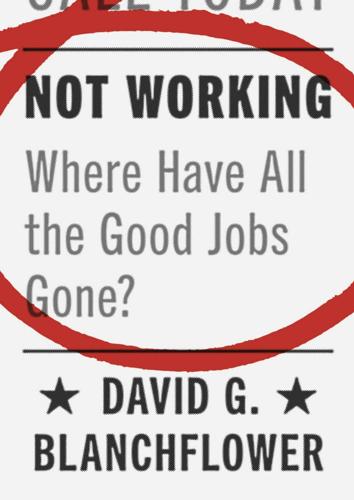
Not Working: Where Have All the Good Jobs Gone?
by
David G. Blanchflower
Published 12 Apr 2021
It is traditional for Dartmouth freshmen returning from their trips in the New Hampshire wilderness to stay overnight at our Moosilauke Ravine Lodge in the White Mountains and to be served green eggs and ham for breakfast in honor of Dr. Seuss. Nice. The Geisels, the most important philanthropists in Dartmouth’s history, were generous donors to the school during Theodore Geisel’s lifetime and made significant provision for the college in their estate plans, reflecting the wealth generated by the beloved stories of Dr. Seuss (over 3.5 million hardback books sold in 2015 alone).47 Dartmouth now has the Geisel School of Medicine. Forbes reported that Theodore Geisel is the eighth-highest-earning deceased celebrity with earnings of $16 million in 2017 after Prince (7), Tom Petty (6), Bob Marley (5), Elvis Presley (4), Charles Schulz (3), Arnold Palmer (2), and Michael Jackson (1).48 Where are the other great, living philanthropists besides Bill and Melinda Gates, Mark Zuckerberg, and Warren Bufiett?
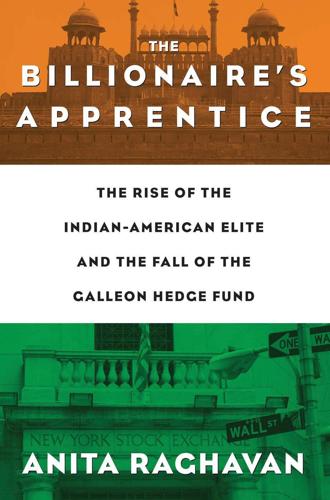
The Billionaire's Apprentice: The Rise of the Indian-American Elite and the Fall of the Galleon Hedge Fund
by
Anita Raghavan
Published 4 Jun 2013
Webster’s notes, taken during a meeting in the study of Gupta’s waterfront home in Westport, offered a rare peek into the family’s wealth. At the time, Gupta and his wife had assets of $134 million—a net worth of $84 million, an irrevocable trust of $38.5 million, and $11.2 million in cash and liquid assets. Under the section in her notes regarding estate planning, Webster had noted that the Guptas wanted to give 80 percent of their money to charity. The prosecution sought to admit Webster’s notes because in her financial review of the Guptas she had asked for an update on his sources of income. In the notes she took at the time, she wrote, he was “Chairman, Galleon International, $1.3 billion, 15 percent owner, invests in long/short equity Asia, entitled to performance fees.”

Boom: Mad Money, Mega Dealers, and the Rise of Contemporary Art
by
Michael Shnayerson
Published 20 May 2019
But, as Sotheby’s noted, “few lenders… are willing to accept works of art as sole collateral for loans.” This was the game the auction houses had played in the early 2000s without much success, but Sotheby’s was hungry, so it would try all-art loans again. It would also provide financial advice to artists and collectors. For those getting on in age, estate planning was in order. Cappellazzo was tough. In her glass-walled Sotheby’s office, on one of the bookshelves behind her, was a sign that read, “I’ll be nicer if you’ll be smarter.” She fielded questions briskly while bobbing a furlined Gucci backless shoe below her glass desk. Clearly, she was resolute enough to preside over the firings that had occurred since her arrival.
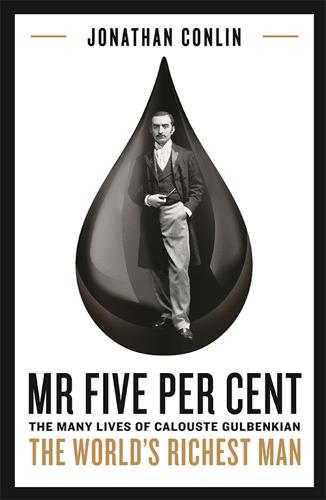
Mr Five Per Cent: The Many Lives of Calouste Gulbenkian, the World's Richest Man
by
Jonathan Conlin
Published 3 Jan 2019
If the Portuguese government insisted on a minimum share, then Nubar advocated the creation of a separate Portuguese foundation to which that share could be ceded by a parent foundation to be established elsewhere.25 Kevork’s statement was characteristically modest in noting that he had not been party to his father-in-law’s estate planning. It was nonetheless clear to him that Gulbenkian had put his trust in Radcliffe, and that Gulbenkian expected ‘members of his family to take great heed of [Radcliffe’s] guidance and advice in the solution of our problems’. Kevork therefore supported Radcliffe’s position.26 This may have disappointed Perdigão, who had previously written appreciatively to Salazar of how Kevork was ‘the loyal collaborator of the Portuguese trustee [that is, Perdigão himself ]’.27 Perdigão did not shift his position, writing to Radcliffe that the government insisted on a Portuguese majority and a minimum 33 per cent of grants as their quid pro quo for registering the foundation as a tax-exempt philanthropic organisation.
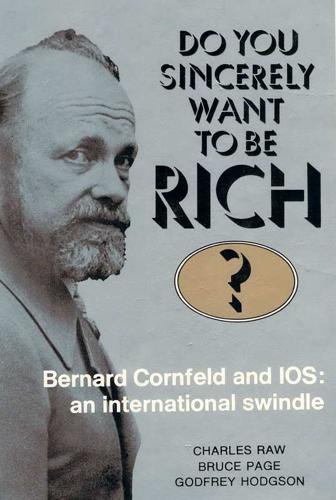
Do You Sincerely Want To Be Rich?
by
Charles Raw
,
Bruce Page
and
Godfrey Hodgson
Published 16 May 2005
All the closes, essentially, are based upon the idea of 'controlling' the prospect, and forcing him to do things, by offering either (a) two alternatives which are both attractive, or (b) by stating hypothetical reasons against buying which are couched in such form that the prospect has difficulty in expressing his or her objections. The principle is 'never offer an alternative that in effect asks whether or not the prospect wants the programme'. But the instructions for using the closes reveal even more than do the techniques themselves about the real nature of the 'estate planning' and 'financial counselling' that IOS was offering. First, recruits are informed that 'successful' associates on average have found five 'trial closes' necessary to effect a sale. They are then asked to agree or disagree with this proposition: 'The close should be thought of as a hammer. If you don't make it the first time, you should keep hitting.
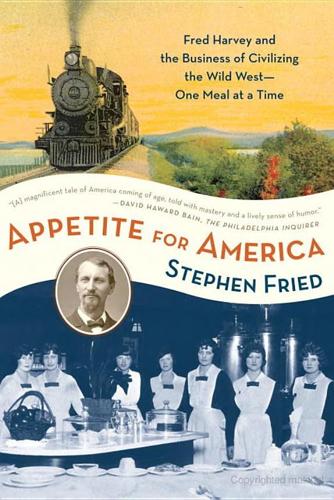
Appetite for America: Fred Harvey and the Business of Civilizing the Wild West--One Meal at a Time
by
Stephen Fried
Published 23 Mar 2010
Since he didn’t have easy access to $250,000 in currency, he gifted family members with stocks, bonds, even personal promissory notes, including several from loans he had made to some of Kansas City’s wealthiest men when they were short on cash. Minnie was given two $25,000 notes from Charles W. Armour, a partner in one of the country’s largest meatpacking plants and a contemporary of Ford and Dave’s. Armour had borrowed the money from Fred over a four-week period. Yet such moments of levelheadedness and estate planning on Fred’s part would often be interrupted by well-meaning friends and relatives convinced they had found some miracle remedy. One day Ford received an urgent telegram, which his father had sent just before midnight, saying people were telling him to see a Chinese doctor they had heard about as a last-ditch attempt to cure his cancer.
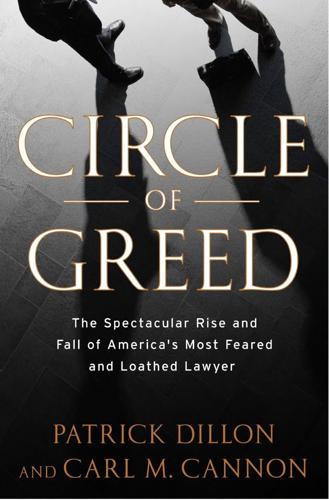
Circle of Greed: The Spectacular Rise and Fall of the Lawyer Who Brought Corporate America to Its Knees
by
Patrick Dillon
and
Carl M. Cannon
Published 2 Mar 2010
However well intentioned the Methodist elders had been originally, they eventually found themselves running an elaborate Ponzi scheme. The legal case began in 1977, when a Pacific Homes retiree named Frank Barr placed a call to a San Diego law firm, Wied & Granby, to which he had been referred by his estate planning attorney. Barr told the Wied & Granby attorneys his story: months after he had paid more than $300,000 for a “life-care contract,” Pacific Homes officials had announced that all residents would have to pay several hundred dollars more each month to keep the place afloat. The homes were near bankruptcy, it seemed to Barr, and the officials clearly had known this was the case even while soliciting the contracts.
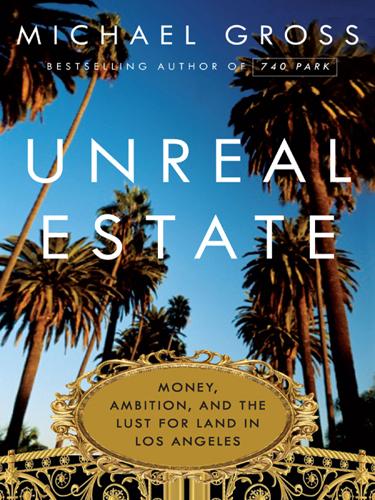
Unreal Estate: Money, Ambition, and the Lust for Land in Los Angeles
by
Michael Gross
Published 1 Nov 2011
The doctors have not specifically diagnosed her condition as Alzheimers, however, the symptoms seem similar. It is a dementia of some kind.… Dolly hallucinates and seems to be living in her own little dream world.” What Logan didn’t tell Stockmar was that in August 1986, when Logan felt she was already failing, her brain going, Dolly had changed her estate plans one last time. In a new codicil to her will, many of her bequests changed radically. Elinor Logan and Maria Rivera were willed $3 million each, accountant Hugh Mullen and a maid named Yolanda each got $2 million, two chauffeurs who doubled as bodyguards got $1 million each, and, in what appeared to be a last-minute change of heart, one recipient of Dolly’s largesse was eliminated: A $300,000 bequest to Diane Hunt Stockmar, though included in the typewritten document, was crossed out by hand.

Elon Musk
by
Walter Isaacson
Published 11 Sep 2023
He felt that the good he could do for humanity was best accomplished by keeping his money deployed in his companies that pursued energy sustainability, space exploration, and artificial intelligence safety. A few days after Bill Gates visited him with philanthropy suggestions, Musk sat down at an open table on the mezzanine overlooking the assembly lines at Tesla’s new Giga Texas with Birchall and four estate-planning advisors. Even though he had not been persuaded by Gates to dive into philanthropy, he wanted ideas for funding something that would be more operational than a traditional foundation. The option Birchall proposed was creating a nonprofit holding company, which is like a business that guides and funds multiple nonprofit companies under its protection.

Challenger: A True Story of Heroism and Disaster on the Edge of Space
by
Adam Higginbotham
Published 14 May 2024
McNair Life History Center in Lake City, South Carolina, dedicated to celebrating her husband’s life and mission—and housed in the same building that had once been home to the library he had stubbornly integrated as a boy in 1959. Joy McNair, Ron’s daughter, became an attorney specializing in estate planning, and remained close to her mother in Houston; Reggie eventually moved to Atlanta and began work in finance. Cheryl never remarried, and for years kept Ron’s workroom at home just as he had left it; although many of the mementos her husband flew into space would later be damaged or destroyed in a house fire, his saxophones survived.
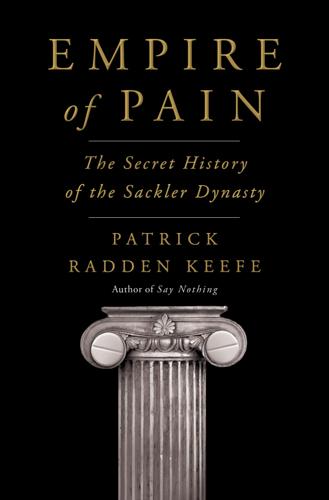
Empire of Pain: The Secret History of the Sackler Dynasty
by
Patrick Radden Keefe
Published 12 Apr 2021
But then, the force of Arthur’s personality, and the tendency of both of these women to want to keep him happy, made it difficult to judge whether their mutual accommodation was a feature of genuine sentiment or simply a reflexive propensity to give Arthur what he wanted. A meeting had been convened to discuss Arthur’s estate. Marietta was not invited, because she did not feature in the will: after the fraught divorce negotiation and her suicide attempt, Arthur had cut her out of his estate planning altogether. But her son, Arthur Felix, was there. Else’s two daughters, Carol (now a doctor in Boston) and Elizabeth (still in New York, and involved in the arts), showed up, along with Arthur’s longtime assistant, Miriam Kent, and three lawyers. “We know we have a net worth in nine figures,” one of the lawyers, Stanley Bergman, announced.
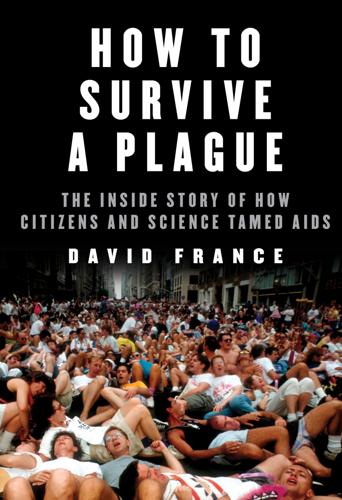
How to Survive a Plague: The Inside Story of How Citizens and Science Tamed AIDS
by
David France
Published 29 Nov 2016
Employers were firing people diagnosed with the disease, insurance claims were being rejected, and landlords were locking patients out of their homes. Thousands of people urgently needed wills, because without them estates were being swept up by estranged family members who were stripping the surviving partners of everything, even the photographs and cherished ephemera from a shared life. GMHC used volunteer lawyers for estate planning, and to help with living wills and health care proxies. “Every contact with the system is a confrontation,” said Robert Cecchi, a volunteer crisis counselor. “As the number of cases grows, it becomes harder to handle the numerous complaints.” The suffering moved Kramer as it did the others, but he felt the Red Cross and the other state and local agencies had a sacred responsibility to handle these matters instead of abdicating the work to the community, and he angrily excoriated his colleagues for letting the homophobia of the social safety net go unchallenged.
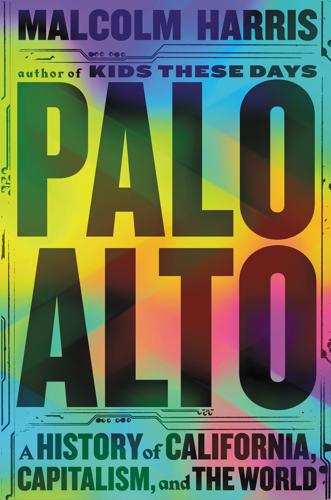
Palo Alto: A History of California, Capitalism, and the World
by
Malcolm Harris
Published 14 Feb 2023
Liberals suggested a north-south dividing line to produce two integrated schools; that’s not what happened. In 1958, the new school went right in the middle of East Palo Alto, segregating the teenagers for the first time in a manner that endures to the present day, with few exceptions. “Federal and state housing policy had created a slum in East Palo Alto,” summarizes Rothstein.29 Hoover’s real estate plan produced white suburbs and corresponding black ghettos for the same reason: There was easy money in it. Whites who went along with the plan got rich, and the ones who didn’t had to get out. Standardized mortgage instruments established through the Hooverian public-private associations Fannie Mae and Ginnie Mae helped banks relocate capital where it could grow fastest, out West.
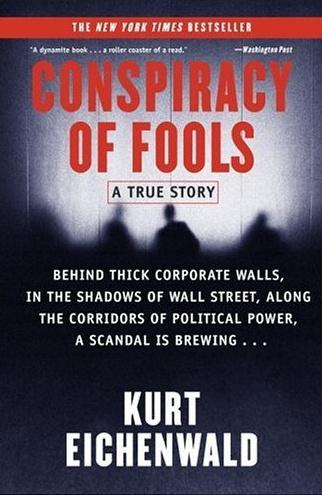
Conspiracy of Fools: A True Story
by
Kurt Eichenwald
Published 14 Mar 2005
“George,” he began, “I’m sure you’ve seen the news.” Skilling was home, putting together a list on a pad of quadrille paper. He had blown out of the office immediately after the announcement, leaving the packing to his secretary, Sherri Sera. Now, he was plotting his new life. Finances. Office. Estate Planning. Those needed to be organized. His brother Mark would help him out there. Reputation. Make sure his departure hadn’t damaged his image with the business world. Family. Spend more time with his kids, arrange some trips with them. Health. Obvious. Community. Reach out into Houston, play a bigger role in the city.
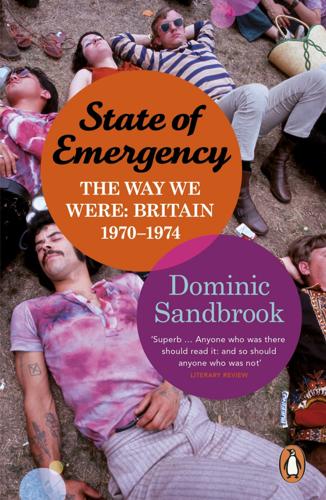
State of Emergency: The Way We Were
by
Dominic Sandbrook
Published 29 Sep 2010
The disco soon succumbed to endemic racial violence, and when a kaftan-wearing hippy tried to organize hand-holding ‘encounter sessions’ to dissipate the tension, the teenagers beat him up so badly he ended up in hospital. It would have been funny if it were not so sad: by the time the researchers left in 1974, all they could foresee for the children of the estate was violence, racism and unemployment.47 Like so many of the council estates planned and built in the 1940s and 1950s, the Monmouth estate had originally been a symbol of modernity and opportunity, the embodiment of the reforming spirit that was going to turn Britain into the New Jerusalem. The transformation in the estates’ image, however, was astonishingly quick: by the early 1970s, writes one historian, they had already become symbols of ‘dependence on state benefits, of a morass of indebtedness to the council and the moneylender, of isolation from neighbour and kin and society at large’.
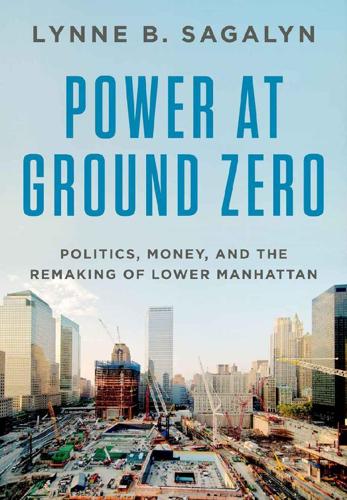
Power at Ground Zero: Politics, Money, and the Remaking of Lower Manhattan
by
Lynne B. Sagalyn
Published 8 Sep 2016
The unexpected, however, was about to radically reshape the firm’s options. The real estate decision was on the agenda of the firm’s two-day board meeting the third week of October 2007. Standing outside the boardroom in the foyer waiting to make the midtown recommendation to the board was Mark E. Brooks, the managing director in charge of real estate planning and transactions. Inside the boardroom O’Neal was informing directors for the first time that he had had a conversation about selling the company! He had to explain to the board quarterly losses of $2.24 billion, the firm’s first quarterly loss in six years. Hours later, still waiting to make his presentation, Brooks was told real estate was no longer on the agenda.
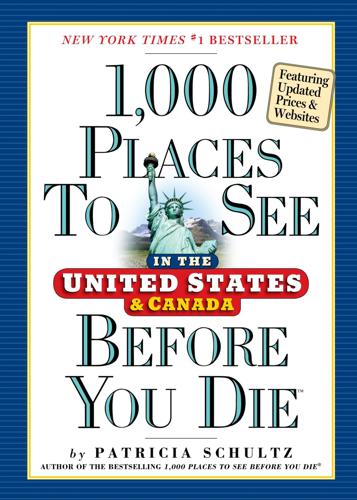
1,000 Places to See in the United States and Canada Before You Die, Updated Ed.
by
Patricia Schultz
Published 13 May 2007
Fall means 60,000 chrysanthemums that over-flow from rich jewel-toned flower beds and cascade from bridges and balconies. Even winter has a tourist season here, as the mansion and gardens are awash in poinsettias, tinsel, and some 3 million twinkling holiday lights during the festival known as Magic Christmas in Lights. Mirror Lake reflects the hidden treasures of the 65-acre Bellingrath estate. Plan a stopover at the local institution known as Mary’s Place, a seafood restaurant in the nearby waterside community of Coden. Founded in 1935 by Mary Hunter, a descendant of slaves, the rustic bare-bones eatery offers straightforward Creole soul food and all-you-can-eat seafood buffets (Greta Garbo swooned over the deviled crab).